A Letter from Charles Dickens
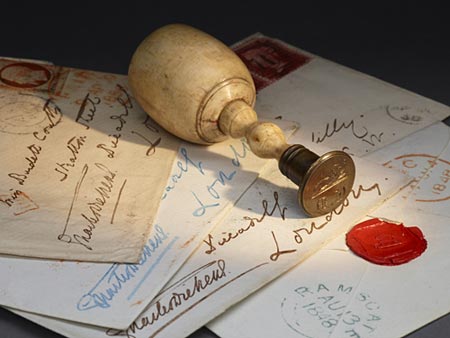 The letters of Charles Dickens (1812–1870) are exceptionally brilliant and entertaining and, alongside his literary manuscripts, provide great insight into his craftsmanship and imagination. Using a goose quill pen, he generally wrote from nine o'clock each morning until two in the afternoon. He favored black ink, now faded to brown, but in the late 1840s switched to blue paper and blue ink. Though Dickens would have preferred that his correspondence remain private, many recipients treasured and retained the letters he sent them, and some 15,000 have survived. The twenty featured here, selected from the Morgan's collection of over 1500 (the richest in the United States), track not only his work as a novelist but also his visits to the United States, his philanthropic pursuits, and his lesser-known experiments with an early form of hypnotism.
The letters of Charles Dickens (1812–1870) are exceptionally brilliant and entertaining and, alongside his literary manuscripts, provide great insight into his craftsmanship and imagination. Using a goose quill pen, he generally wrote from nine o'clock each morning until two in the afternoon. He favored black ink, now faded to brown, but in the late 1840s switched to blue paper and blue ink. Though Dickens would have preferred that his correspondence remain private, many recipients treasured and retained the letters he sent them, and some 15,000 have survived. The twenty featured here, selected from the Morgan's collection of over 1500 (the richest in the United States), track not only his work as a novelist but also his visits to the United States, his philanthropic pursuits, and his lesser-known experiments with an early form of hypnotism.
Letter 1 | 30 April 1856 | to Sophie Verena, page 1
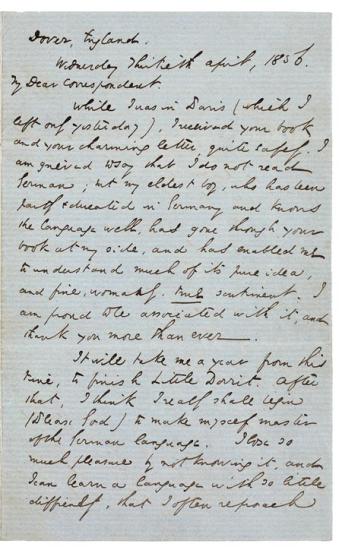
Autograph letter signed, Dover, 30 April 1856 to Sophie Verena
Purchased for The Dannie and Hettie Heineman Collection as the gift of the Heineman Foundation, 2011
This is an extraordinarily candid and personal letter to the young German novelist Sophie Verena, the pen name of Sophie Alberti, who dedicated her first novel to Dickens. Although it states: "I very seldom write or talk about myself," Dickens's letter describes in detail his physical appearance, exercise regimen, and writing habits. Asked whether he dictates his work, he tells Verena: "I answer with a smile that I can as soon imagine a painter dictating his pictures. No. I write every word of my books with my own hand.... I write with great care and pains (being passionately fond of my art, and thinking it worth any trouble)."
Manuscripts and Letters
The Morgan has the richest collection of Dickens manuscripts and letters in the United States. Dickens's letters are exceptionally brilliant and entertaining, and with his literary manuscripts, provide great insight into his craftsmanship and imagination, giving us the closest view of the novelist at work.
Dickens was careful, methodical, and painstaking in his work. Using a goose quill pen, he generally wrote from ten o'clock each morning until two in the afternoon, completing between two and four pages (or "slips," as he called them) each day. Except for letters, he wrote on only one side of the paper. In his early years, he favored black ink, now faded to brown, but in the late 1840s he switched to blue paper and blue ink, which dried more quickly. The handwriting in his early manuscripts is fluent, bold, and largely free of correction, suggesting "a hand racing to keep pace with the mind's conceptions." But, as he developed as an artist, his handwriting became increasingly small and compact, and his later manuscripts are more heavily revised and complex in appearance.
My Dear Correspondent.
While I was in Paris (which I left only yesterday), I received your book and your charming letter, quite safely. I am grieved to say that I do not read German; but my eldest boy, who has been partly educated in Germany and knows the language well, has gone through your book at my side, and has enabled me to understand much of its pure idea, and fine, womanly, true sentiment. I am proud to be associated with it, and thank you more than ever.
It will take me a year from this time, to finish Little Dorrit. After that, I think I really shall begin (Please God) to make myself master of the German language. I lose so much pleasure by not knowing it, and I can learn a language with so little difficulty, that I often reproach
Letter 1 | 30 April 1856 | to Sophie Verena, page 2

Autograph letter signed, Dover, 30 April 1856 to Sophie Verena
Purchased for The Dannie and Hettie Heineman Collection as the gift of the Heineman Foundation, 2011
This is an extraordinarily candid and personal letter to the young German novelist Sophie Verena, the pen name of Sophie Alberti, who dedicated her first novel to Dickens. Although it states: "I very seldom write or talk about myself," Dickens's letter describes in detail his physical appearance, exercise regimen, and writing habits. Asked whether he dictates his work, he tells Verena: "I answer with a smile that I can as soon imagine a painter dictating his pictures. No. I write every word of my books with my own hand.... I write with great care and pains (being passionately fond of my art, and thinking it worth any trouble)."
Manuscripts and Letters
The Morgan has the richest collection of Dickens manuscripts and letters in the United States. Dickens's letters are exceptionally brilliant and entertaining, and with his literary manuscripts, provide great insight into his craftsmanship and imagination, giving us the closest view of the novelist at work.
Dickens was careful, methodical, and painstaking in his work. Using a goose quill pen, he generally wrote from ten o'clock each morning until two in the afternoon, completing between two and four pages (or "slips," as he called them) each day. Except for letters, he wrote on only one side of the paper. In his early years, he favored black ink, now faded to brown, but in the late 1840s he switched to blue paper and blue ink, which dried more quickly. The handwriting in his early manuscripts is fluent, bold, and largely free of correction, suggesting "a hand racing to keep pace with the mind's conceptions." But, as he developed as an artist, his handwriting became increasingly small and compact, and his later manuscripts are more heavily revised and complex in appearance.
myself for not having acquired it long ago. I am not so young as I am in the picture you have seen, for that was painted some fifteen years ago, and I am now 44. It looks a good deal, on paper, I find; but I believe I am very young-looking still, and I know that I am a very active vigorous fellow, who never knew in his own experience what the word "fatigue" meant.
This is in answer to your first question. In reply to your second question whether I dictate, I answer with a smile that I can as soon imagine a painter dictating his pictures. No. I write every word of my books with my own hand, and do not write them very quickly either. I write with great care and pains (being passionately fond of my art, and thinking it worth any trouble), and persevere, and work hard. I am a great walker besides, and plunge into cold water every day in the dead of winter. When I was last in Switzerland, I found that I could climb as fast as the Swiss Guides. Few
Letter 1 | 30 April 1856 | to Sophie Verena, page 3
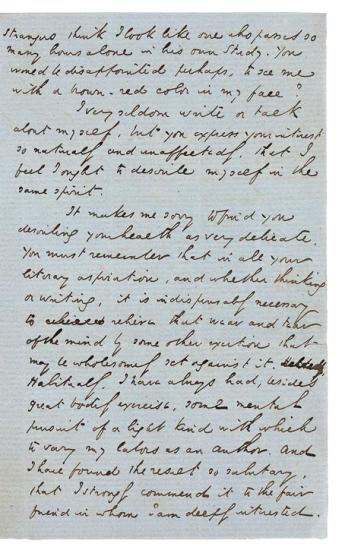
Autograph letter signed, Dover, 30 April 1856 to Sophie Verena
Purchased for The Dannie and Hettie Heineman Collection as the gift of the Heineman Foundation, 2011
This is an extraordinarily candid and personal letter to the young German novelist Sophie Verena, the pen name of Sophie Alberti, who dedicated her first novel to Dickens. Although it states: "I very seldom write or talk about myself," Dickens's letter describes in detail his physical appearance, exercise regimen, and writing habits. Asked whether he dictates his work, he tells Verena: "I answer with a smile that I can as soon imagine a painter dictating his pictures. No. I write every word of my books with my own hand.... I write with great care and pains (being passionately fond of my art, and thinking it worth any trouble)."
Manuscripts and Letters
The Morgan has the richest collection of Dickens manuscripts and letters in the United States. Dickens's letters are exceptionally brilliant and entertaining, and with his literary manuscripts, provide great insight into his craftsmanship and imagination, giving us the closest view of the novelist at work.
Dickens was careful, methodical, and painstaking in his work. Using a goose quill pen, he generally wrote from ten o'clock each morning until two in the afternoon, completing between two and four pages (or "slips," as he called them) each day. Except for letters, he wrote on only one side of the paper. In his early years, he favored black ink, now faded to brown, but in the late 1840s he switched to blue paper and blue ink, which dried more quickly. The handwriting in his early manuscripts is fluent, bold, and largely free of correction, suggesting "a hand racing to keep pace with the mind's conceptions." But, as he developed as an artist, his handwriting became increasingly small and compact, and his later manuscripts are more heavily revised and complex in appearance.
strangers think I look like one who passes so many hours alone in his own Study. You would be disappointed perhaps, to see me with a brown-red color in my face?
I very seldom write or talk about myself, but you express your interest so naturally and unaffectedly, that I feel I ought to describe myself in the same spirit.
It makes me sorry to find you describing your health as very delicate. You must remember that in all your literary aspiration, and whether thinking or writing, it is indispensably necessary to relieve that wear and tear of the mind by some other exertion that may be wholesomely set against it. Habitually, I have always had, besides great bodily exercise, some mental pursuit of a light kind with which to vary my labors as an Author. And I have found the result so salutary, that I strongly commend it to the fair friend in whom I am deeply interested.
Letter 1 | 30 April 1856 | to Sophie Verena, page 4

Autograph letter signed, Dover, 30 April 1856 to Sophie Verena
Purchased for The Dannie and Hettie Heineman Collection as the gift of the Heineman Foundation, 2011
This is an extraordinarily candid and personal letter to the young German novelist Sophie Verena, the pen name of Sophie Alberti, who dedicated her first novel to Dickens. Although it states: "I very seldom write or talk about myself," Dickens's letter describes in detail his physical appearance, exercise regimen, and writing habits. Asked whether he dictates his work, he tells Verena: "I answer with a smile that I can as soon imagine a painter dictating his pictures. No. I write every word of my books with my own hand.... I write with great care and pains (being passionately fond of my art, and thinking it worth any trouble)."
Manuscripts and Letters
The Morgan has the richest collection of Dickens manuscripts and letters in the United States. Dickens's letters are exceptionally brilliant and entertaining, and with his literary manuscripts, provide great insight into his craftsmanship and imagination, giving us the closest view of the novelist at work.
Dickens was careful, methodical, and painstaking in his work. Using a goose quill pen, he generally wrote from ten o'clock each morning until two in the afternoon, completing between two and four pages (or "slips," as he called them) each day. Except for letters, he wrote on only one side of the paper. In his early years, he favored black ink, now faded to brown, but in the late 1840s he switched to blue paper and blue ink, which dried more quickly. The handwriting in his early manuscripts is fluent, bold, and largely free of correction, suggesting "a hand racing to keep pace with the mind's conceptions." But, as he developed as an artist, his handwriting became increasingly small and compact, and his later manuscripts are more heavily revised and complex in appearance.
I am now upon my way home, merely staying here a couple of days to have some walks on the high cliffs by the sea. During the summer, I shall be generally at a little French Country House among pleasant gardens near Boulogne Sur Mer. But that is only a few hours journey from London, and I shall receive my letters and papers from thence, two or three times a week. My best address therefore, is at my own house
Tavistock House
London
— and there I shall always be delighted to hear from you. Perhaps I may see you there one day? If not, I must come to Potsdam after I have learnt German from your book.
Farewell. God bless you! Always believe me, with great regard,
Your affectionate
CHARLES DICKENS
Letter 2 | 26 May 1846 | to Angela Burdett-Coutts, page 1
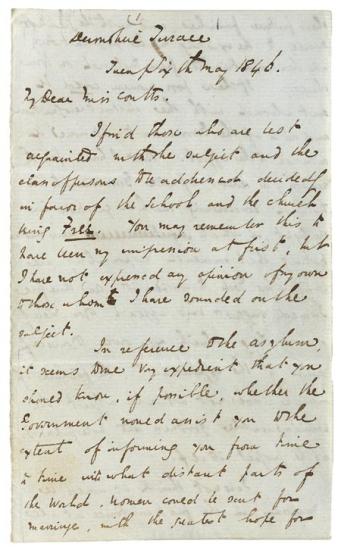
Autograph letter signed, London, 26 May 1846, to Angela Burdett-Coutts
Purchased with the assistance of the Fellows, 1951
This letter is the earliest in which Dickens makes reference to the project to create a home for prostitutes and petty miscreants that would become Urania Cottage. Dickens's fourteen-page letter sets out in detail his hopes and plans for the institution: "A woman or girl coming to the Asylum, it is explained to her that she has come there for useful repentance and reform, and because her past way of life has been dreadful in its nature and consequences, and full of affliction, misery, and despair to herself. Never mind Society while she is at that pass. Society has used her ill and turned away from her, and she cannot be expected to take much heed of its rights or wrongs." Dickens never used the term prostitute in any of his letters.
Philanthropy
From 1840 Dickens guided the charitable work of philanthropist Angela Burdett-Coutts (1814–1906), the wealthiest heiress in Victorian Britain. Dickens served as her official almoner and helped to assess the merits of the thousands of letters she received from those seeking financial assistance. He also advised on her plan for improved sanitation in the slums of Westminster and drew her attention and support to the Ragged School Union, which provided education to London's poorest children. A pragmatist, Dickens encouraged Burdett-Coutts to direct her philanthropy toward the causes of distress. In 1847 they founded a home, Urania Cottage, in Shepherd's Bush, as a shelter for homeless women—prostitutes or petty criminals who sought to rehabilitate themselves by learning practical skills and developing self-discipline. Many of the women were assisted to eventually emigrate to one of Britain's colonies to begin a new life. For more than ten years, Dickens administered Urania Cottage on behalf of Burdett-Coutts and played an extremely active role in its day-to-day management.
My Dear Miss Coutts.
I find those who are best acquainted with the subject and the class of persons to be addressed, decidedly in favor of the School and the Church being Free. You may remember this to have been my impression at first, but I have not expressed any opinion of my own to those whom I have sounded on the subject.
In reference to the Asylum, it seems to me very expedient that you should know, if possible, whether the Government would assist you to the extent of informing you from time to time into what distant parts of the World, women could be sent for marriage, with the greatest hope for
Letter 2 | 26 May 1846 | to Angela Burdett-Coutts, page 2

Autograph letter signed, London, 26 May 1846, to Angela Burdett-Coutts
Purchased with the assistance of the Fellows, 1951
This letter is the earliest in which Dickens makes reference to the project to create a home for prostitutes and petty miscreants that would become Urania Cottage. Dickens's fourteen-page letter sets out in detail his hopes and plans for the institution: "A woman or girl coming to the Asylum, it is explained to her that she has come there for useful repentance and reform, and because her past way of life has been dreadful in its nature and consequences, and full of affliction, misery, and despair to herself. Never mind Society while she is at that pass. Society has used her ill and turned away from her, and she cannot be expected to take much heed of its rights or wrongs." Dickens never used the term prostitute in any of his letters.
Philanthropy
From 1840 Dickens guided the charitable work of philanthropist Angela Burdett-Coutts (1814–1906), the wealthiest heiress in Victorian Britain. Dickens served as her official almoner and helped to assess the merits of the thousands of letters she received from those seeking financial assistance. He also advised on her plan for improved sanitation in the slums of Westminster and drew her attention and support to the Ragged School Union, which provided education to London's poorest children. A pragmatist, Dickens encouraged Burdett-Coutts to direct her philanthropy toward the causes of distress. In 1847 they founded a home, Urania Cottage, in Shepherd's Bush, as a shelter for homeless women—prostitutes or petty criminals who sought to rehabilitate themselves by learning practical skills and developing self-discipline. Many of the women were assisted to eventually emigrate to one of Britain's colonies to begin a new life. For more than ten years, Dickens administered Urania Cottage on behalf of Burdett-Coutts and played an extremely active role in its day-to-day management.
future families, and with the greatest service to the existing male population, whether expatriated from England or born there. If these poor women could be sent abroad with the distinct recognition and aid of the Government, it would be a service to the effort. But I have (with reason) a doubt of all Governments in England considering such a question in the light, in which men undertaking that immense responsibility, are bound, before God, to consider it. And therefore I would suggest this appeal to you, merely as something which you owe to yourself and to the experiment; the failure of which, does not at all affect the immeasurable goodness and hopefulness of the project itself.
I do not think it would be necessary, in the first instance at all
Letter 2 | 26 May 1846 | to Angela Burdett-Coutts, page 3
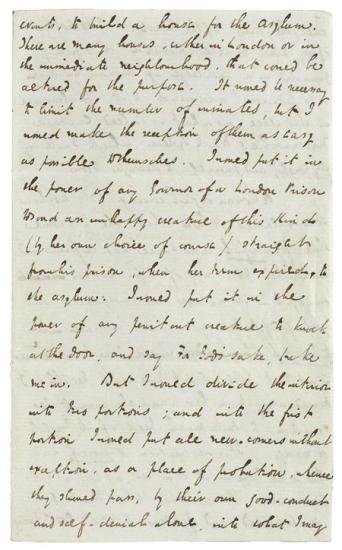
Autograph letter signed, London, 26 May 1846, to Angela Burdett-Coutts
Purchased with the assistance of the Fellows, 1951
This letter is the earliest in which Dickens makes reference to the project to create a home for prostitutes and petty miscreants that would become Urania Cottage. Dickens's fourteen-page letter sets out in detail his hopes and plans for the institution: "A woman or girl coming to the Asylum, it is explained to her that she has come there for useful repentance and reform, and because her past way of life has been dreadful in its nature and consequences, and full of affliction, misery, and despair to herself. Never mind Society while she is at that pass. Society has used her ill and turned away from her, and she cannot be expected to take much heed of its rights or wrongs." Dickens never used the term prostitute in any of his letters.
Philanthropy
From 1840 Dickens guided the charitable work of philanthropist Angela Burdett-Coutts (1814–1906), the wealthiest heiress in Victorian Britain. Dickens served as her official almoner and helped to assess the merits of the thousands of letters she received from those seeking financial assistance. He also advised on her plan for improved sanitation in the slums of Westminster and drew her attention and support to the Ragged School Union, which provided education to London's poorest children. A pragmatist, Dickens encouraged Burdett-Coutts to direct her philanthropy toward the causes of distress. In 1847 they founded a home, Urania Cottage, in Shepherd's Bush, as a shelter for homeless women—prostitutes or petty criminals who sought to rehabilitate themselves by learning practical skills and developing self-discipline. Many of the women were assisted to eventually emigrate to one of Britain's colonies to begin a new life. For more than ten years, Dickens administered Urania Cottage on behalf of Burdett-Coutts and played an extremely active role in its day-to-day management.
events, to build a house for the Asylum. There are many houses, either in London or in the immediate neighbourhood, that could be altered for the purpose. It would be necessary to limit the number of inmates, but I would make the reception of them as easy as possible to themselves. I would put it in the power of any Governor of a London Prison to send an unhappy creature of this kind (by her own choice of course) straight from his prison, when her term expired, to the Asylum. I would put it in the power of any penitent creature to knock at the door, and say For God's sake, take me in. But I would divide the interior into two portions; and into the first portion I would put all new-comers without exception, as a place of probation, whence they should pass, by their own good-conduct and self-denial alone, into what I may
Letter 2 | 26 May 1846 | to Angela Burdett-Coutts, page 4
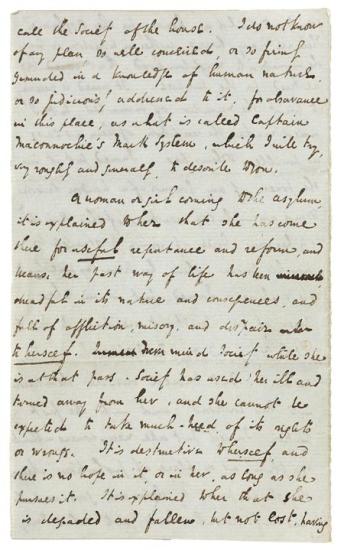
Autograph letter signed, London, 26 May 1846, to Angela Burdett-Coutts
Purchased with the assistance of the Fellows, 1951
This letter is the earliest in which Dickens makes reference to the project to create a home for prostitutes and petty miscreants that would become Urania Cottage. Dickens's fourteen-page letter sets out in detail his hopes and plans for the institution: "A woman or girl coming to the Asylum, it is explained to her that she has come there for useful repentance and reform, and because her past way of life has been dreadful in its nature and consequences, and full of affliction, misery, and despair to herself. Never mind Society while she is at that pass. Society has used her ill and turned away from her, and she cannot be expected to take much heed of its rights or wrongs." Dickens never used the term prostitute in any of his letters.
Philanthropy
From 1840 Dickens guided the charitable work of philanthropist Angela Burdett-Coutts (1814–1906), the wealthiest heiress in Victorian Britain. Dickens served as her official almoner and helped to assess the merits of the thousands of letters she received from those seeking financial assistance. He also advised on her plan for improved sanitation in the slums of Westminster and drew her attention and support to the Ragged School Union, which provided education to London's poorest children. A pragmatist, Dickens encouraged Burdett-Coutts to direct her philanthropy toward the causes of distress. In 1847 they founded a home, Urania Cottage, in Shepherd's Bush, as a shelter for homeless women—prostitutes or petty criminals who sought to rehabilitate themselves by learning practical skills and developing self-discipline. Many of the women were assisted to eventually emigrate to one of Britain's colonies to begin a new life. For more than ten years, Dickens administered Urania Cottage on behalf of Burdett-Coutts and played an extremely active role in its day-to-day management.
call the Society of the house. I do not know of any plan so well conceived, or so firmly grounded in a knowledge of human nature, or so judiciously addressed to it, for observance in this place, as what is called Captain Maconnochie's Mark System, which I will try, very roughly and generally, to describe to you.
A woman or girl coming to the Asylum, it is explained to her that she has come there for useful repentance and reform, and because her past way of life has been dreadful in its nature and consequences, and full of affliction, misery, and despair to herself. Never mind Society while she is at that pass. Society has used her ill and turned away from her, and she cannot be expected to take much heed of its rights or wrongs. It is destructive to herself, and there is no hope in it, or in her, as long as she pursues it. It is explained to her that she is degraded and fallen, but not lost, having
Letter 2 | 26 May 1846 | to Angela Burdett-Coutts, page 5

Autograph letter signed, London, 26 May 1846, to Angela Burdett-Coutts
Purchased with the assistance of the Fellows, 1951
This letter is the earliest in which Dickens makes reference to the project to create a home for prostitutes and petty miscreants that would become Urania Cottage. Dickens's fourteen-page letter sets out in detail his hopes and plans for the institution: "A woman or girl coming to the Asylum, it is explained to her that she has come there for useful repentance and reform, and because her past way of life has been dreadful in its nature and consequences, and full of affliction, misery, and despair to herself. Never mind Society while she is at that pass. Society has used her ill and turned away from her, and she cannot be expected to take much heed of its rights or wrongs." Dickens never used the term prostitute in any of his letters.
Philanthropy
From 1840 Dickens guided the charitable work of philanthropist Angela Burdett-Coutts (1814–1906), the wealthiest heiress in Victorian Britain. Dickens served as her official almoner and helped to assess the merits of the thousands of letters she received from those seeking financial assistance. He also advised on her plan for improved sanitation in the slums of Westminster and drew her attention and support to the Ragged School Union, which provided education to London's poorest children. A pragmatist, Dickens encouraged Burdett-Coutts to direct her philanthropy toward the causes of distress. In 1847 they founded a home, Urania Cottage, in Shepherd's Bush, as a shelter for homeless women—prostitutes or petty criminals who sought to rehabilitate themselves by learning practical skills and developing self-discipline. Many of the women were assisted to eventually emigrate to one of Britain's colonies to begin a new life. For more than ten years, Dickens administered Urania Cottage on behalf of Burdett-Coutts and played an extremely active role in its day-to-day management.
this shelter; and that the means of Return to Happiness are now about to be put into her own hands, and trusted to her own keeping. That with this view, she is, instead of being placed in this probationary class for a month, or two months, or three months, or any specified time whatever, required to earn there, a certain number of Marks (they are mere scratches in a book) so that she may make her probation a very short one, or a very long one, according to her own conduct. For so much work, she has so many Marks; for a day's good conduct, so many more. For every instance of ill-temper, disrespect, bad language, any outbreak of any sort or kind, so many—a very large number in proportion to her receipts—are deducted. A perfect Debtor and Creditor account is kept between her and the Superintendent, for every day; and the state of that account, it is in her own power and nobody else's, to adjust to her advantage. It is expressly pointed out to her, that before she can be considered qualified to return to any kind of society—even to the Society of the Asylum—she must give proofs of her power of self-restraint and her sincerity, and her determination to try to shew that she deserves the confidence it is proposed to place in her. Her
Letter 2 | 26 May 1846 | to Angela Burdett-Coutts, page 6
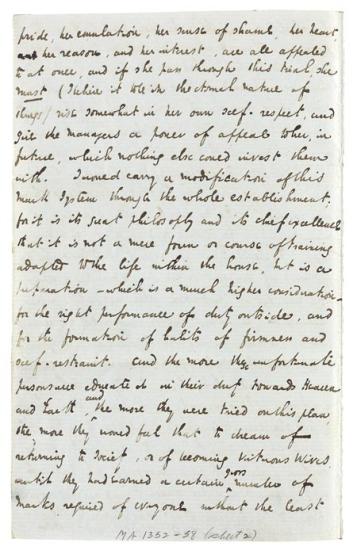
Autograph letter signed, London, 26 May 1846, to Angela Burdett-Coutts
Purchased with the assistance of the Fellows, 1951
This letter is the earliest in which Dickens makes reference to the project to create a home for prostitutes and petty miscreants that would become Urania Cottage. Dickens's fourteen-page letter sets out in detail his hopes and plans for the institution: "A woman or girl coming to the Asylum, it is explained to her that she has come there for useful repentance and reform, and because her past way of life has been dreadful in its nature and consequences, and full of affliction, misery, and despair to herself. Never mind Society while she is at that pass. Society has used her ill and turned away from her, and she cannot be expected to take much heed of its rights or wrongs." Dickens never used the term prostitute in any of his letters.
Philanthropy
From 1840 Dickens guided the charitable work of philanthropist Angela Burdett-Coutts (1814–1906), the wealthiest heiress in Victorian Britain. Dickens served as her official almoner and helped to assess the merits of the thousands of letters she received from those seeking financial assistance. He also advised on her plan for improved sanitation in the slums of Westminster and drew her attention and support to the Ragged School Union, which provided education to London's poorest children. A pragmatist, Dickens encouraged Burdett-Coutts to direct her philanthropy toward the causes of distress. In 1847 they founded a home, Urania Cottage, in Shepherd's Bush, as a shelter for homeless women—prostitutes or petty criminals who sought to rehabilitate themselves by learning practical skills and developing self-discipline. Many of the women were assisted to eventually emigrate to one of Britain's colonies to begin a new life. For more than ten years, Dickens administered Urania Cottage on behalf of Burdett-Coutts and played an extremely active role in its day-to-day management.
pride, her emulation, her sense of shame, her heart, her reason, and her interest, are all appealed to at once, and if she pass through this trial, she must (I believe it to be in the eternal nature of things) rise somewhat in her own self-respect, and give the managers a power of appeal to her, in future, which nothing else could invest them with. I would carry a modification of this Mark System through the whole establishment; for it is its great philosophy and its chief excellence that it is not a mere form or course of training adapted to the life within the house, but is a preparation—which is a much higher consideration—for the right performance of duty outside, and for the formation of habits of firmness and self-restraint. And the more these unfortunate persons were educated in their duty towards Heaven and Earth, and the more they were tried on this plan, the more they would feel that to dream of returning to Society, or of becoming Virtuous Wives, until they had earned a certain gross number of Marks required of everyone without the least
Letter 2 | 26 May 1846 | to Angela Burdett-Coutts, page 7
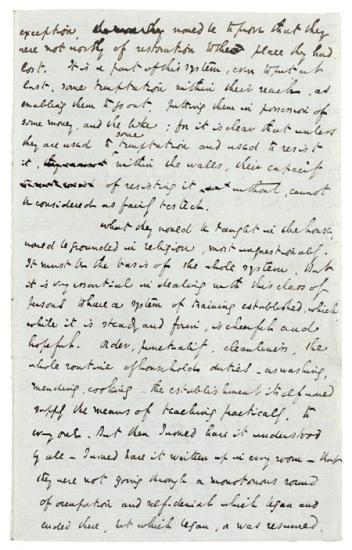
Autograph letter signed, London, 26 May 1846, to Angela Burdett-Coutts
Purchased with the assistance of the Fellows, 1951
This letter is the earliest in which Dickens makes reference to the project to create a home for prostitutes and petty miscreants that would become Urania Cottage. Dickens's fourteen-page letter sets out in detail his hopes and plans for the institution: "A woman or girl coming to the Asylum, it is explained to her that she has come there for useful repentance and reform, and because her past way of life has been dreadful in its nature and consequences, and full of affliction, misery, and despair to herself. Never mind Society while she is at that pass. Society has used her ill and turned away from her, and she cannot be expected to take much heed of its rights or wrongs." Dickens never used the term prostitute in any of his letters.
Philanthropy
From 1840 Dickens guided the charitable work of philanthropist Angela Burdett-Coutts (1814–1906), the wealthiest heiress in Victorian Britain. Dickens served as her official almoner and helped to assess the merits of the thousands of letters she received from those seeking financial assistance. He also advised on her plan for improved sanitation in the slums of Westminster and drew her attention and support to the Ragged School Union, which provided education to London's poorest children. A pragmatist, Dickens encouraged Burdett-Coutts to direct her philanthropy toward the causes of distress. In 1847 they founded a home, Urania Cottage, in Shepherd's Bush, as a shelter for homeless women—prostitutes or petty criminals who sought to rehabilitate themselves by learning practical skills and developing self-discipline. Many of the women were assisted to eventually emigrate to one of Britain's colonies to begin a new life. For more than ten years, Dickens administered Urania Cottage on behalf of Burdett-Coutts and played an extremely active role in its day-to-day management.
exception, would be to prove that they were not worthy of restoration to the place they had lost. It is a part of this system, even to put at last, some temptation within their reach, as enabling them to go out, putting them in possession of some money, and the like; for it is clear that unless they are used to some temptation and used to resist it, within the walls, their capacity of resisting it without, cannot be considered as fairly tested.
What they would be taught in the house, would be grounded in religion, most unquestionably. It must be the basis of the whole system. But it is very essential in dealing with this class of persons to have a system of training established, which, while it is steady and firm, is cheerful and hopeful. Order, punctuality, cleanliness, the whole routine of household duties—as washing, mending, cooking—the establishment itself would supply the means of teaching practically, to every one. But then I would have it understood by all—I would have it written up in every room—that they were not going through a monotonous round of occupation and self-denial which began and ended there, but which began, or was resumed,
Letter 2 | 26 May 1846 | to Angela Burdett-Coutts, page 8
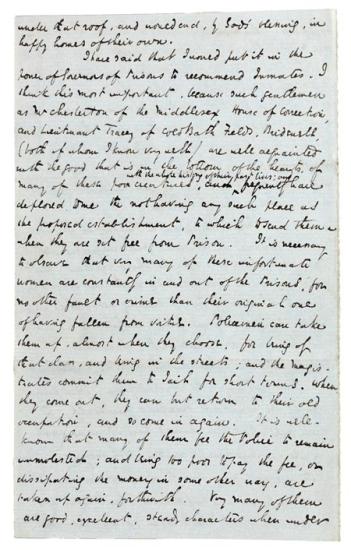
Autograph letter signed, London, 26 May 1846, to Angela Burdett-Coutts
Purchased with the assistance of the Fellows, 1951
This letter is the earliest in which Dickens makes reference to the project to create a home for prostitutes and petty miscreants that would become Urania Cottage. Dickens's fourteen-page letter sets out in detail his hopes and plans for the institution: "A woman or girl coming to the Asylum, it is explained to her that she has come there for useful repentance and reform, and because her past way of life has been dreadful in its nature and consequences, and full of affliction, misery, and despair to herself. Never mind Society while she is at that pass. Society has used her ill and turned away from her, and she cannot be expected to take much heed of its rights or wrongs." Dickens never used the term prostitute in any of his letters.
Philanthropy
From 1840 Dickens guided the charitable work of philanthropist Angela Burdett-Coutts (1814–1906), the wealthiest heiress in Victorian Britain. Dickens served as her official almoner and helped to assess the merits of the thousands of letters she received from those seeking financial assistance. He also advised on her plan for improved sanitation in the slums of Westminster and drew her attention and support to the Ragged School Union, which provided education to London's poorest children. A pragmatist, Dickens encouraged Burdett-Coutts to direct her philanthropy toward the causes of distress. In 1847 they founded a home, Urania Cottage, in Shepherd's Bush, as a shelter for homeless women—prostitutes or petty criminals who sought to rehabilitate themselves by learning practical skills and developing self-discipline. Many of the women were assisted to eventually emigrate to one of Britain's colonies to begin a new life. For more than ten years, Dickens administered Urania Cottage on behalf of Burdett-Coutts and played an extremely active role in its day-to-day management.
under that roof, and would end, by God's blessing, in happy homes of their own.
I have said that I would put it in the power of Governors of Prisons to recommend Inmates. I think this most important, because such gentlemen as Mr. Chesterton of the Middlesex House of Correction, and Lieutenant Tracey of Cold Bath Fields, Bridewell, (both of whom I know very well) are well acquainted with the good that is in the bottom of the hearts, of many of these poor creatures, and with the whole history of their past lives; and frequently have deplored to me the not having any such place as the proposed establishment, to which to send them—when they are set free from Prison. It is necessary to observe that very many of these unfortunate women are constantly in and out of the Prisons, for no other fault or crime than their original one of having fallen from virtue. Policemen can take them up, almost when they choose, for being of that class, and being in the streets; and the Magistrates commit them to Jail for short terms. When they come out, they can but return to their old occupation, and so come in again. It is well-known that many of them fee the Police to remain unmolested; and being too poor to pay the fee, or dissipating the money in some other way, are taken up again, forthwith. Very many of them are good, excellent, steady characters when under
Letter 2 | 26 May 1846 | to Angela Burdett-Coutts, page 9
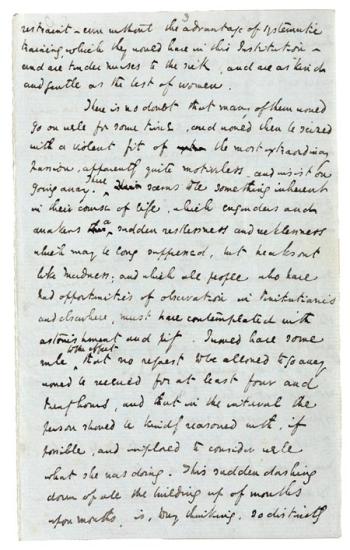
Autograph letter signed, London, 26 May 1846, to Angela Burdett-Coutts
Purchased with the assistance of the Fellows, 1951
This letter is the earliest in which Dickens makes reference to the project to create a home for prostitutes and petty miscreants that would become Urania Cottage. Dickens's fourteen-page letter sets out in detail his hopes and plans for the institution: "A woman or girl coming to the Asylum, it is explained to her that she has come there for useful repentance and reform, and because her past way of life has been dreadful in its nature and consequences, and full of affliction, misery, and despair to herself. Never mind Society while she is at that pass. Society has used her ill and turned away from her, and she cannot be expected to take much heed of its rights or wrongs." Dickens never used the term prostitute in any of his letters.
Philanthropy
From 1840 Dickens guided the charitable work of philanthropist Angela Burdett-Coutts (1814–1906), the wealthiest heiress in Victorian Britain. Dickens served as her official almoner and helped to assess the merits of the thousands of letters she received from those seeking financial assistance. He also advised on her plan for improved sanitation in the slums of Westminster and drew her attention and support to the Ragged School Union, which provided education to London's poorest children. A pragmatist, Dickens encouraged Burdett-Coutts to direct her philanthropy toward the causes of distress. In 1847 they founded a home, Urania Cottage, in Shepherd's Bush, as a shelter for homeless women—prostitutes or petty criminals who sought to rehabilitate themselves by learning practical skills and developing self-discipline. Many of the women were assisted to eventually emigrate to one of Britain's colonies to begin a new life. For more than ten years, Dickens administered Urania Cottage on behalf of Burdett-Coutts and played an extremely active role in its day-to-day management.
restraint—even without the advantage of systematic training, which they would have in this Institution—and are tender nurses to the sick, and are as kind and gentle as the best of women.
There is no doubt that many of them would go on well for some time, and would then be seized with a violent fit of the most extraordinary passion, apparently quite motiveless, and insist on going away. There seems to be something inherent in their course of life, which engenders and awakens a sudden restlessness and recklessness which may be long suppressed, but breaks out like Madness; and which all people who have had opportunities of observation in Penitentiaries and elsewhere, must have contemplated with astonishment and pity. I would have some rule to the effect that no request to be allowed to go away would be received for at least four and twenty hours, and that in the interval the person should be kindly reasoned with, if possible, and implored to consider well what she was doing. This sudden dashing down of all the building up of months upon months, is, to my thinking, so distinctly
Letter 2 | 26 May 1846 | to Angela Burdett-Coutts, page 10
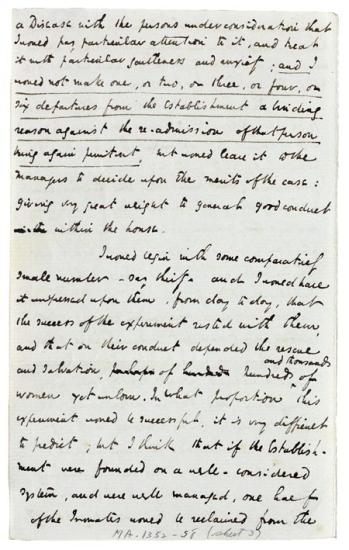
Autograph letter signed, London, 26 May 1846, to Angela Burdett-Coutts
Purchased with the assistance of the Fellows, 1951
This letter is the earliest in which Dickens makes reference to the project to create a home for prostitutes and petty miscreants that would become Urania Cottage. Dickens's fourteen-page letter sets out in detail his hopes and plans for the institution: "A woman or girl coming to the Asylum, it is explained to her that she has come there for useful repentance and reform, and because her past way of life has been dreadful in its nature and consequences, and full of affliction, misery, and despair to herself. Never mind Society while she is at that pass. Society has used her ill and turned away from her, and she cannot be expected to take much heed of its rights or wrongs." Dickens never used the term prostitute in any of his letters.
Philanthropy
From 1840 Dickens guided the charitable work of philanthropist Angela Burdett-Coutts (1814–1906), the wealthiest heiress in Victorian Britain. Dickens served as her official almoner and helped to assess the merits of the thousands of letters she received from those seeking financial assistance. He also advised on her plan for improved sanitation in the slums of Westminster and drew her attention and support to the Ragged School Union, which provided education to London's poorest children. A pragmatist, Dickens encouraged Burdett-Coutts to direct her philanthropy toward the causes of distress. In 1847 they founded a home, Urania Cottage, in Shepherd's Bush, as a shelter for homeless women—prostitutes or petty criminals who sought to rehabilitate themselves by learning practical skills and developing self-discipline. Many of the women were assisted to eventually emigrate to one of Britain's colonies to begin a new life. For more than ten years, Dickens administered Urania Cottage on behalf of Burdett-Coutts and played an extremely active role in its day-to-day management.
a Disease with the persons under consideration that I would pay particular attention to it, and treat it with particular gentleness and anxiety; and I would not make one, or two, or three, or four, or six departures from the Establishment a binding reason against the readmission of that person, being again penitent, but would leave it to the Managers to decide upon the merits of the case: giving very great weight to general good conduct within the house.
I would begin with some comparatively small number—say thirty—and I would have it impressed upon them, from day to day, that the success of the experiment rested with them, and that on their conduct depended the rescue and salvation, of hundreds and thousands of women yet unborn. In what proportion this experiment would be successful, it is very difficult to predict; but I think that if the Establishment were founded on a well-considered system, and were well managed, one half of the Inmates would be reclaimed from the
Letter 2 | 26 May 1846 | to Angela Burdett-Coutts, page 11
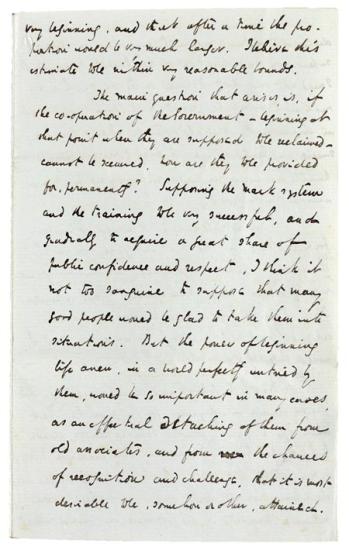
Autograph letter signed, London, 26 May 1846, to Angela Burdett-Coutts
Purchased with the assistance of the Fellows, 1951
This letter is the earliest in which Dickens makes reference to the project to create a home for prostitutes and petty miscreants that would become Urania Cottage. Dickens's fourteen-page letter sets out in detail his hopes and plans for the institution: "A woman or girl coming to the Asylum, it is explained to her that she has come there for useful repentance and reform, and because her past way of life has been dreadful in its nature and consequences, and full of affliction, misery, and despair to herself. Never mind Society while she is at that pass. Society has used her ill and turned away from her, and she cannot be expected to take much heed of its rights or wrongs." Dickens never used the term prostitute in any of his letters.
Philanthropy
From 1840 Dickens guided the charitable work of philanthropist Angela Burdett-Coutts (1814–1906), the wealthiest heiress in Victorian Britain. Dickens served as her official almoner and helped to assess the merits of the thousands of letters she received from those seeking financial assistance. He also advised on her plan for improved sanitation in the slums of Westminster and drew her attention and support to the Ragged School Union, which provided education to London's poorest children. A pragmatist, Dickens encouraged Burdett-Coutts to direct her philanthropy toward the causes of distress. In 1847 they founded a home, Urania Cottage, in Shepherd's Bush, as a shelter for homeless women—prostitutes or petty criminals who sought to rehabilitate themselves by learning practical skills and developing self-discipline. Many of the women were assisted to eventually emigrate to one of Britain's colonies to begin a new life. For more than ten years, Dickens administered Urania Cottage on behalf of Burdett-Coutts and played an extremely active role in its day-to-day management.
very beginning, and that after a time the proportion would be very much larger. I believe this estimate to be within very reasonable bounds.
The main question that arises, is, if the co-operation of the Government—beginning at that point when they are supposed to be reclaimed—cannot be secured, how are they to be provided for, permanently? Supposing the mark system and the training to be very successful, and gradually to acquire a great share of public confidence and respect, I think it not too sanguine to suppose that many good people would be glad to take them into situations. But the power of beginning life anew, in a world perfectly untried by them, would be so important in many cases, as an effectual detaching of them from old associates, and from the chances of recognition and challenge, that it is most desirable to be, somehow or other, attained.
Letter 2 | 26 May 1846 | to Angela Burdett-Coutts, page 12
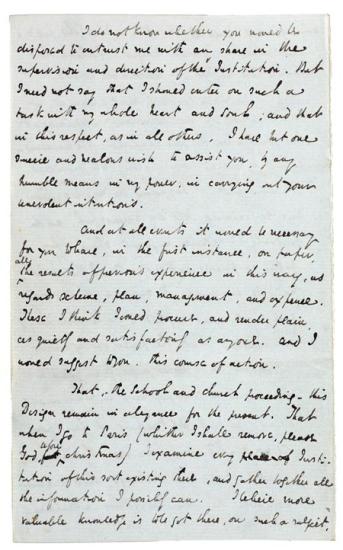
Autograph letter signed, London, 26 May 1846, to Angela Burdett-Coutts
Purchased with the assistance of the Fellows, 1951
This letter is the earliest in which Dickens makes reference to the project to create a home for prostitutes and petty miscreants that would become Urania Cottage. Dickens's fourteen-page letter sets out in detail his hopes and plans for the institution: "A woman or girl coming to the Asylum, it is explained to her that she has come there for useful repentance and reform, and because her past way of life has been dreadful in its nature and consequences, and full of affliction, misery, and despair to herself. Never mind Society while she is at that pass. Society has used her ill and turned away from her, and she cannot be expected to take much heed of its rights or wrongs." Dickens never used the term prostitute in any of his letters.
Philanthropy
From 1840 Dickens guided the charitable work of philanthropist Angela Burdett-Coutts (1814–1906), the wealthiest heiress in Victorian Britain. Dickens served as her official almoner and helped to assess the merits of the thousands of letters she received from those seeking financial assistance. He also advised on her plan for improved sanitation in the slums of Westminster and drew her attention and support to the Ragged School Union, which provided education to London's poorest children. A pragmatist, Dickens encouraged Burdett-Coutts to direct her philanthropy toward the causes of distress. In 1847 they founded a home, Urania Cottage, in Shepherd's Bush, as a shelter for homeless women—prostitutes or petty criminals who sought to rehabilitate themselves by learning practical skills and developing self-discipline. Many of the women were assisted to eventually emigrate to one of Britain's colonies to begin a new life. For more than ten years, Dickens administered Urania Cottage on behalf of Burdett-Coutts and played an extremely active role in its day-to-day management.
I do not know whether you would be disposed to entrust me with any share in the supervision and direction of the Institution. But I need not say that I should enter on such a task with my whole heart and soul; and that in this respect, as in all others, I have but one sincere and zealous wish to assist you, by any humble means in my power, in carrying out your benevolent intentions.
And at all events it would be necessary for you to have, in the first instance, on paper, all the results of previous experience in this way, as regards scheme, plan, management, and expence. These I think I could procure, and render plain, as quietly and satisfactorily as anyone. And I would suggest to you, this course of action.
That,—the School and Church proceeding—this Design remain in abeyance for the present. That when I go to Paris (whither I shall remove, please God, before Christmas) I examine every Institution of this sort existing there, and gather together all the information I possibly can. I believe more valuable knowledge is to be got there, on such a subject,
Letter 2 | 26 May 1846 | to Angela Burdett-Coutts, page 13
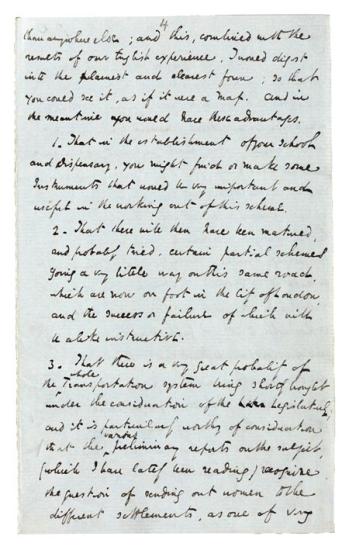
Autograph letter signed, London, 26 May 1846, to Angela Burdett-Coutts
Purchased with the assistance of the Fellows, 1951
This letter is the earliest in which Dickens makes reference to the project to create a home for prostitutes and petty miscreants that would become Urania Cottage. Dickens's fourteen-page letter sets out in detail his hopes and plans for the institution: "A woman or girl coming to the Asylum, it is explained to her that she has come there for useful repentance and reform, and because her past way of life has been dreadful in its nature and consequences, and full of affliction, misery, and despair to herself. Never mind Society while she is at that pass. Society has used her ill and turned away from her, and she cannot be expected to take much heed of its rights or wrongs." Dickens never used the term prostitute in any of his letters.
Philanthropy
From 1840 Dickens guided the charitable work of philanthropist Angela Burdett-Coutts (1814–1906), the wealthiest heiress in Victorian Britain. Dickens served as her official almoner and helped to assess the merits of the thousands of letters she received from those seeking financial assistance. He also advised on her plan for improved sanitation in the slums of Westminster and drew her attention and support to the Ragged School Union, which provided education to London's poorest children. A pragmatist, Dickens encouraged Burdett-Coutts to direct her philanthropy toward the causes of distress. In 1847 they founded a home, Urania Cottage, in Shepherd's Bush, as a shelter for homeless women—prostitutes or petty criminals who sought to rehabilitate themselves by learning practical skills and developing self-discipline. Many of the women were assisted to eventually emigrate to one of Britain's colonies to begin a new life. For more than ten years, Dickens administered Urania Cottage on behalf of Burdett-Coutts and played an extremely active role in its day-to-day management.
than anywhere else; and this, combined with the results of our English experience, I would digest into the plainest and clearest form; so that you could see it, as if it were a Map. And in the meantime you would have these advantages.
1. That in the establishment of your school and Dispensary, you might find or make some Instruments that would be very important and useful in the working out of this scheme.
2. That there will then have been matured, and probably tried, certain partial schemes going a very little way on this same road, which are now on foot in the City of London, and the success or failure of which will be alike instructive.
3. That there is a very great probability of the whole Transportation system being shortly brought under the consideration of the Legislature; and it is particularly worthy of consideration that the various preliminary reports on the subject, (which I have lately been reading) recognize the question of sending out women to the different settlements, as one of very
Letter 2 | 26 May 1846 | to Angela Burdett-Coutts, page 14

Autograph letter signed, London, 26 May 1846, to Angela Burdett-Coutts
Purchased with the assistance of the Fellows, 1951
This letter is the earliest in which Dickens makes reference to the project to create a home for prostitutes and petty miscreants that would become Urania Cottage. Dickens's fourteen-page letter sets out in detail his hopes and plans for the institution: "A woman or girl coming to the Asylum, it is explained to her that she has come there for useful repentance and reform, and because her past way of life has been dreadful in its nature and consequences, and full of affliction, misery, and despair to herself. Never mind Society while she is at that pass. Society has used her ill and turned away from her, and she cannot be expected to take much heed of its rights or wrongs." Dickens never used the term prostitute in any of his letters.
Philanthropy
From 1840 Dickens guided the charitable work of philanthropist Angela Burdett-Coutts (1814–1906), the wealthiest heiress in Victorian Britain. Dickens served as her official almoner and helped to assess the merits of the thousands of letters she received from those seeking financial assistance. He also advised on her plan for improved sanitation in the slums of Westminster and drew her attention and support to the Ragged School Union, which provided education to London's poorest children. A pragmatist, Dickens encouraged Burdett-Coutts to direct her philanthropy toward the causes of distress. In 1847 they founded a home, Urania Cottage, in Shepherd's Bush, as a shelter for homeless women—prostitutes or petty criminals who sought to rehabilitate themselves by learning practical skills and developing self-discipline. Many of the women were assisted to eventually emigrate to one of Britain's colonies to begin a new life. For more than ten years, Dickens administered Urania Cottage on behalf of Burdett-Coutts and played an extremely active role in its day-to-day management.
great importance.
I have that deep sense, dear Miss Coutts, of the value of your confidence in such a matter, and of the pure, exalted, and generous motives by which you are impelled, that I feel a most earnest anxiety that such an effort as you contemplate in behalf of your Sex, should have every advantage in the outset it can possibly receive, and should, if undertaken at all, be undertaken to the lasting honor of your name and Country. In this feeling, I make the suggestion I think best calculated to promote that end. Trust me, if you agree in it, I will not lose sight of the subject, or grow cold to it, or fail to bestow upon it my best exertions and reflection. But, if there be any other course you would prefer to take; and you will tell me so; I shall be as devoted to you in that as in this, and as much honored by being asked to render you the least assistance.
Ever Faithfully Yours
CD.
Letter 3 | 3 November 1847 | to Angela Burdett-Coutts, page 1
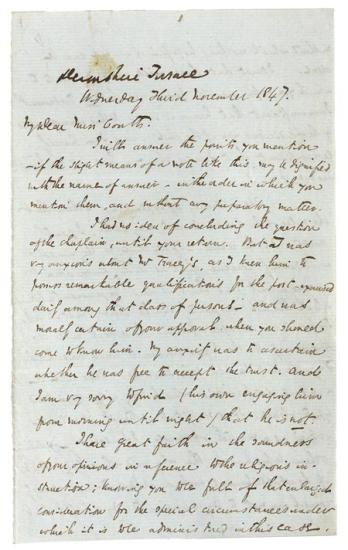
Autograph letter signed, London, 3 November 1847, to Angela Burdett-Coutts
Purchased with the assistance of the Fellows, 1951
Dickens's letters to Burdett-Coutts are, by any standard, extremely long and detailed and reveal his extraordinarily competent administrative abilities as well as shrewd insight into the minds and motivations of the women who would enter Urania Cottage. He insisted "that their past lives should never be referred to." He also recognized "that these unfortunate creatures are to be tempted to virtue. They cannot be dragged, driven, or frightened." Dickens's meticulous attention to detail is apparent in this letter, in which he informs Burdett-Coutts that "I have laid in all the dresses and linen of every sort for the whole house... I have made them as cheerful in appearance as they reasonably could be—at the same time very neat and modest."
Philanthropy
From 1840 Dickens guided the charitable work of philanthropist Angela Burdett-Coutts (1814–1906), the wealthiest heiress in Victorian Britain. Dickens served as her official almoner and helped to assess the merits of the thousands of letters she received from those seeking financial assistance. He also advised on her plan for improved sanitation in the slums of Westminster and drew her attention and support to the Ragged School Union, which provided education to London's poorest children. A pragmatist, Dickens encouraged Burdett-Coutts to direct her philanthropy toward the causes of distress. In 1847 they founded a home, Urania Cottage, in Shepherd's Bush, as a shelter for homeless women—prostitutes or petty criminals who sought to rehabilitate themselves by learning practical skills and developing self-discipline. Many of the women were assisted to eventually emigrate to one of Britain's colonies to begin a new life. For more than ten years, Dickens administered Urania Cottage on behalf of Burdett-Coutts and played an extremely active role in its day-to-day management.
My Dear Miss Coutts.
I will answer the points you mention—if the slight means of a note like this may be dignified with the name of answer—in the order of which you mention them, and without any preparatory matter.
I had no idea of concluding the question of the chaplain, until your return. But I was very anxious, about Mr. Tracey's, as I knew him to possess remarkable qualifications for the post—exercised daily among that class of persons—and was morally certain of your approval when you should come to know him. My anxiety was to ascertain whether he was free to accept the trust. And I am very sorry to find (his own engaging him from morning until night) that he is not.
I have great faith in the soundness of your opinions in reference to the religious instruction; knowing you to be full of that enlarged consideration for the special circumstances under which it is to be administered in this case,
Letter 3 | 3 November 1847 | to Angela Burdett-Coutts, page 2
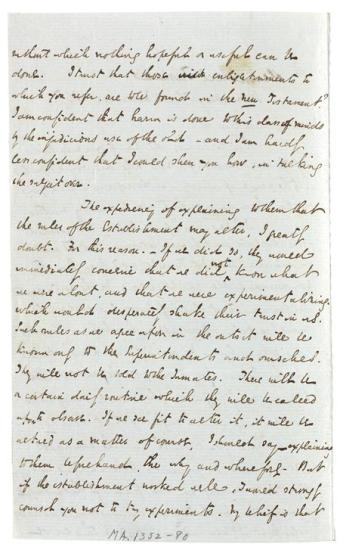
Autograph letter signed, London, 3 November 1847, to Angela Burdett-Coutts
Purchased with the assistance of the Fellows, 1951
Dickens's letters to Burdett-Coutts are, by any standard, extremely long and detailed and reveal his extraordinarily competent administrative abilities as well as shrewd insight into the minds and motivations of the women who would enter Urania Cottage. He insisted "that their past lives should never be referred to." He also recognized "that these unfortunate creatures are to be tempted to virtue. They cannot be dragged, driven, or frightened." Dickens's meticulous attention to detail is apparent in this letter, in which he informs Burdett-Coutts that "I have laid in all the dresses and linen of every sort for the whole house... I have made them as cheerful in appearance as they reasonably could be—at the same time very neat and modest."
Philanthropy
From 1840 Dickens guided the charitable work of philanthropist Angela Burdett-Coutts (1814–1906), the wealthiest heiress in Victorian Britain. Dickens served as her official almoner and helped to assess the merits of the thousands of letters she received from those seeking financial assistance. He also advised on her plan for improved sanitation in the slums of Westminster and drew her attention and support to the Ragged School Union, which provided education to London's poorest children. A pragmatist, Dickens encouraged Burdett-Coutts to direct her philanthropy toward the causes of distress. In 1847 they founded a home, Urania Cottage, in Shepherd's Bush, as a shelter for homeless women—prostitutes or petty criminals who sought to rehabilitate themselves by learning practical skills and developing self-discipline. Many of the women were assisted to eventually emigrate to one of Britain's colonies to begin a new life. For more than ten years, Dickens administered Urania Cottage on behalf of Burdett-Coutts and played an extremely active role in its day-to-day management.
without which nothing hopeful or useful can be done. I trust that those enlightenments to which you refer, are to be found in the New Testament? I am confident that harm is done to this class of minds by the injudicious use of the old—and I am hardly less confident that I could shew you how, in talking the subject over.
The expediency of explaining to them that the rules of the Establishment may alter, I greatly doubt. For this reason.—If we did so, they would immediately conceive that we did not know what we were about, and that we were experimentalizing. Which would desperately shake their trust in us. Such rules as we agree upon in the outset will be known only to the Superintendents and ourselves. They will not be told to the Inmates. There will be a certain daily routine which they will be called upon to observe. If we see fit to alter it, it will be altered as a matter of course, I should say—explaining to them beforehand, the why and wherefore. But, if the establishment worked well, I would strongly counsel you not to try experiments. My belief is, that
Letter 3 | 3 November 1847 | to Angela Burdett-Coutts, page 3

Autograph letter signed, London, 3 November 1847, to Angela Burdett-Coutts
Purchased with the assistance of the Fellows, 1951
Dickens's letters to Burdett-Coutts are, by any standard, extremely long and detailed and reveal his extraordinarily competent administrative abilities as well as shrewd insight into the minds and motivations of the women who would enter Urania Cottage. He insisted "that their past lives should never be referred to." He also recognized "that these unfortunate creatures are to be tempted to virtue. They cannot be dragged, driven, or frightened." Dickens's meticulous attention to detail is apparent in this letter, in which he informs Burdett-Coutts that "I have laid in all the dresses and linen of every sort for the whole house... I have made them as cheerful in appearance as they reasonably could be—at the same time very neat and modest."
Philanthropy
From 1840 Dickens guided the charitable work of philanthropist Angela Burdett-Coutts (1814–1906), the wealthiest heiress in Victorian Britain. Dickens served as her official almoner and helped to assess the merits of the thousands of letters she received from those seeking financial assistance. He also advised on her plan for improved sanitation in the slums of Westminster and drew her attention and support to the Ragged School Union, which provided education to London's poorest children. A pragmatist, Dickens encouraged Burdett-Coutts to direct her philanthropy toward the causes of distress. In 1847 they founded a home, Urania Cottage, in Shepherd's Bush, as a shelter for homeless women—prostitutes or petty criminals who sought to rehabilitate themselves by learning practical skills and developing self-discipline. Many of the women were assisted to eventually emigrate to one of Britain's colonies to begin a new life. For more than ten years, Dickens administered Urania Cottage on behalf of Burdett-Coutts and played an extremely active role in its day-to-day management.
nothing would unsettle them so much, or render their staying with us so doubtful.—Recollect that we address a peculiar and strangely-made character.
There is this objection to the address of the chaplain to each person individually.—It would decidedly involve the risk of their refusing to come to us. The extraordinary monotony of the Refuges and Asylums now existing, and the almost insupportable extent to which they carry the words and forms of religion, is known to no order of people as well as to these women; and they have that exaggerated dread of it, and that preconceived sense of their inability to bear it, which the reports of those who have refused to stay in them, have bred in their minds. I am afraid if they were thus taken to task, and especially by a clergyman, they would be alarmed—would say "its the old story after all, and we have mistaken the sort of place. It's better to say at once that we are not fit for it"—and that so we should lose them. That they are sensible of the sinfulness and degradation of their lives—
Letter 3 | 3 November 1847 | to Angela Burdett-Coutts, page 4
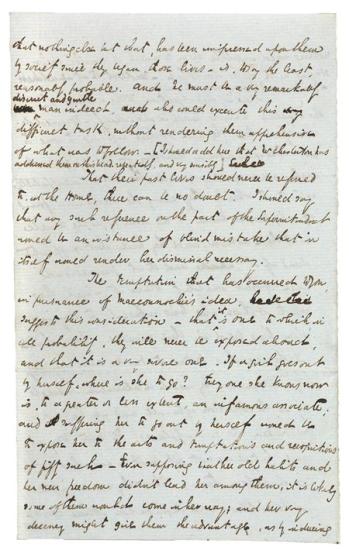
Autograph letter signed, London, 3 November 1847, to Angela Burdett-Coutts
Purchased with the assistance of the Fellows, 1951
Dickens's letters to Burdett-Coutts are, by any standard, extremely long and detailed and reveal his extraordinarily competent administrative abilities as well as shrewd insight into the minds and motivations of the women who would enter Urania Cottage. He insisted "that their past lives should never be referred to." He also recognized "that these unfortunate creatures are to be tempted to virtue. They cannot be dragged, driven, or frightened." Dickens's meticulous attention to detail is apparent in this letter, in which he informs Burdett-Coutts that "I have laid in all the dresses and linen of every sort for the whole house... I have made them as cheerful in appearance as they reasonably could be—at the same time very neat and modest."
Philanthropy
From 1840 Dickens guided the charitable work of philanthropist Angela Burdett-Coutts (1814–1906), the wealthiest heiress in Victorian Britain. Dickens served as her official almoner and helped to assess the merits of the thousands of letters she received from those seeking financial assistance. He also advised on her plan for improved sanitation in the slums of Westminster and drew her attention and support to the Ragged School Union, which provided education to London's poorest children. A pragmatist, Dickens encouraged Burdett-Coutts to direct her philanthropy toward the causes of distress. In 1847 they founded a home, Urania Cottage, in Shepherd's Bush, as a shelter for homeless women—prostitutes or petty criminals who sought to rehabilitate themselves by learning practical skills and developing self-discipline. Many of the women were assisted to eventually emigrate to one of Britain's colonies to begin a new life. For more than ten years, Dickens administered Urania Cottage on behalf of Burdett-Coutts and played an extremely active role in its day-to-day management.
that nothing else but that, has been impressed upon them by society since they began those lives—is, to say the least, reasonably probable. And he must be a very remarkably discreet and gentle man indeed, who could execute this very difficult task, without rendering them apprehensive of what was to follow.—[I should add here that Mr. Chesterton has addressed them on this head, repeatedly, and very sensibly.]
That their past lives should never be referred to, at the Home, there can be no doubt. I should say that any such reference on the part of the Superintendent would be an instance of blind mistake that in itself would render her dismissal necessary.
The temptation that has occurred to you, in pursuance of Macconnochie's idea, suggests this consideration—that it is one to which in all probability, they will never be exposed abroad, and that it is a very severe one. If a girl goes out by herself, where is she to go? Every one she knows now is, to a greater or less extent, an infamous associate; and suffering her to go out by herself would be to expose her to the arts and temptations and recognitions of fifty such—Even supposing that her old habits and her new freedom didn't lead her among them, it is likely some of them would come in her way; and her very decency might give them the advantage, as by inducing
Letter 3 | 3 November 1847 | to Angela Burdett-Coutts, page 5
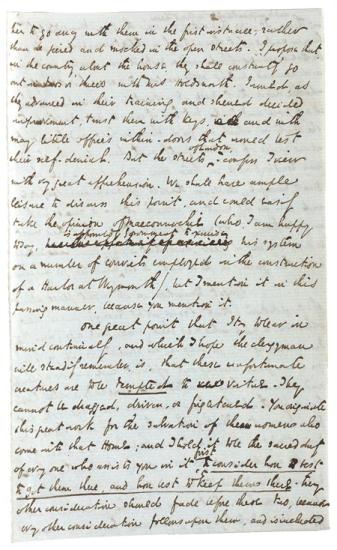
Autograph letter signed, London, 3 November 1847, to Angela Burdett-Coutts
Purchased with the assistance of the Fellows, 1951
Dickens's letters to Burdett-Coutts are, by any standard, extremely long and detailed and reveal his extraordinarily competent administrative abilities as well as shrewd insight into the minds and motivations of the women who would enter Urania Cottage. He insisted "that their past lives should never be referred to." He also recognized "that these unfortunate creatures are to be tempted to virtue. They cannot be dragged, driven, or frightened." Dickens's meticulous attention to detail is apparent in this letter, in which he informs Burdett-Coutts that "I have laid in all the dresses and linen of every sort for the whole house... I have made them as cheerful in appearance as they reasonably could be—at the same time very neat and modest."
Philanthropy
From 1840 Dickens guided the charitable work of philanthropist Angela Burdett-Coutts (1814–1906), the wealthiest heiress in Victorian Britain. Dickens served as her official almoner and helped to assess the merits of the thousands of letters she received from those seeking financial assistance. He also advised on her plan for improved sanitation in the slums of Westminster and drew her attention and support to the Ragged School Union, which provided education to London's poorest children. A pragmatist, Dickens encouraged Burdett-Coutts to direct her philanthropy toward the causes of distress. In 1847 they founded a home, Urania Cottage, in Shepherd's Bush, as a shelter for homeless women—prostitutes or petty criminals who sought to rehabilitate themselves by learning practical skills and developing self-discipline. Many of the women were assisted to eventually emigrate to one of Britain's colonies to begin a new life. For more than ten years, Dickens administered Urania Cottage on behalf of Burdett-Coutts and played an extremely active role in its day-to-day management.
that nothing else but that, has been impressed upon them by society since they began those lives—is, to say the least, reasonably probable. And he must be a very remarkably discreet and gentle man indeed, who could execute this very difficult task, without rendering them apprehensive of what was to follow.—[I should add here that Mr. Chesterton has addressed them on this head, repeatedly, and very sensibly.]
That their past lives should never be referred to, at the Home, there can be no doubt. I should say that any such reference on the part of the Superintendent would be an instance of blind mistake that in itself would render her dismissal necessary.
The temptation that has occurred to you, in pursuance of Macconnochie's idea, suggests this consideration—that it is one to which in all probability, they will never be exposed abroad, and that it is a very severe one. If a girl goes out by herself, where is she to go? Every one she knows now is, to a greater or less extent, an infamous associate; and suffering her to go out by herself would be to expose her to the arts and temptations and recognitions of fifty such—Even supposing that her old habits and her new freedom didn't lead her among them, it is likely some of them would come in her way; and her very decency might give them the advantage, as by inducing
Letter 3 | 3 November 1847 | to Angela Burdett-Coutts, page 6

Autograph letter signed, London, 3 November 1847, to Angela Burdett-Coutts
Purchased with the assistance of the Fellows, 1951
Dickens's letters to Burdett-Coutts are, by any standard, extremely long and detailed and reveal his extraordinarily competent administrative abilities as well as shrewd insight into the minds and motivations of the women who would enter Urania Cottage. He insisted "that their past lives should never be referred to." He also recognized "that these unfortunate creatures are to be tempted to virtue. They cannot be dragged, driven, or frightened." Dickens's meticulous attention to detail is apparent in this letter, in which he informs Burdett-Coutts that "I have laid in all the dresses and linen of every sort for the whole house... I have made them as cheerful in appearance as they reasonably could be—at the same time very neat and modest."
Philanthropy
From 1840 Dickens guided the charitable work of philanthropist Angela Burdett-Coutts (1814–1906), the wealthiest heiress in Victorian Britain. Dickens served as her official almoner and helped to assess the merits of the thousands of letters she received from those seeking financial assistance. He also advised on her plan for improved sanitation in the slums of Westminster and drew her attention and support to the Ragged School Union, which provided education to London's poorest children. A pragmatist, Dickens encouraged Burdett-Coutts to direct her philanthropy toward the causes of distress. In 1847 they founded a home, Urania Cottage, in Shepherd's Bush, as a shelter for homeless women—prostitutes or petty criminals who sought to rehabilitate themselves by learning practical skills and developing self-discipline. Many of the women were assisted to eventually emigrate to one of Britain's colonies to begin a new life. For more than ten years, Dickens administered Urania Cottage on behalf of Burdett-Coutts and played an extremely active role in its day-to-day management.
in them, and is impracticable without them. It is for this vital reason that a knowledge of human nature as it shews itself in these tarnished and battered images of God—and a patient consideration for it—and a determined putting of the question to one's self, not only whether this or that piece of instruction or correction be in itself good and true, but how it can be best adapted to the state in which we find these people, and the necessity we are under of dealing gently with them, lest they should run headlong back on their own destruction—are the great, merciful, Christian thoughts for such an enterprize, and form the only spirit in which it can be successfully undertaken. Do you not feel, with me, that this must be kept steadily in view, and that a chaplain imbued with this feeling in the outset, is the only Minister for this place?
I forgot to mention in its right place, about the temptation, that I saw, at Mr. Tracey's prison the other day, a girl who was there, some time ago (merely, if I remember right, for being in the streets, or, if for felony for some offence arising out of that life) whose appearance and behaviour had so interested some lady or other, living hard by, that when her term was over, she took her for a servant. That girl, although she had the reputation of being a drunkard, worked hard and honestly in this employment for seven or eight months, and had wine and spirits constantly in her keeping, which she never touched. But in an evil hour her Mistress gave her a holiday. She fell among her old companions
Letter 3 | 3 November 1847 | to Angela Burdett-Coutts, page 7

Autograph letter signed, London, 3 November 1847, to Angela Burdett-Coutts
Purchased with the assistance of the Fellows, 1951
Dickens's letters to Burdett-Coutts are, by any standard, extremely long and detailed and reveal his extraordinarily competent administrative abilities as well as shrewd insight into the minds and motivations of the women who would enter Urania Cottage. He insisted "that their past lives should never be referred to." He also recognized "that these unfortunate creatures are to be tempted to virtue. They cannot be dragged, driven, or frightened." Dickens's meticulous attention to detail is apparent in this letter, in which he informs Burdett-Coutts that "I have laid in all the dresses and linen of every sort for the whole house... I have made them as cheerful in appearance as they reasonably could be—at the same time very neat and modest."
Philanthropy
From 1840 Dickens guided the charitable work of philanthropist Angela Burdett-Coutts (1814–1906), the wealthiest heiress in Victorian Britain. Dickens served as her official almoner and helped to assess the merits of the thousands of letters she received from those seeking financial assistance. He also advised on her plan for improved sanitation in the slums of Westminster and drew her attention and support to the Ragged School Union, which provided education to London's poorest children. A pragmatist, Dickens encouraged Burdett-Coutts to direct her philanthropy toward the causes of distress. In 1847 they founded a home, Urania Cottage, in Shepherd's Bush, as a shelter for homeless women—prostitutes or petty criminals who sought to rehabilitate themselves by learning practical skills and developing self-discipline. Many of the women were assisted to eventually emigrate to one of Britain's colonies to begin a new life. For more than ten years, Dickens administered Urania Cottage on behalf of Burdett-Coutts and played an extremely active role in its day-to-day management.
—her removal from whom had been the main cause of her reformation, poor creature—never went back again, fell into her old way of life, and is in prison now. I saw her with Mr. Chesterton, and talked to her, but thought it best to decline her: for besides the danger of her attachment to liquor (though I do not, like Mr. Chesterton: neither does Mr. Tracey attach overwhelming importance to that, in a young woman of that way of life, who drinks because she is utterly miserable—a middle aged woman who drinks, is another thing, and is always hopeless) she had a singularly bad head, and looked discouragingly secret and moody.
I must tell you of one of the two young women who were remaining in Prison voluntarily, until we could take them. When I first went there, about your home, she was produced to me by Mr. Chesterton, before I saw any of the others, as a model. She was the Matron's model, and the head female turnkey's model, and the peculiar pet and protegée of Mr. Rotch the Magistrate, who is a very good man, and takes infinite pains in the prisons—though I doubt his understanding of the company he finds there. She was much better educated than any of the others (some of whom are extremely ignorant), had a very intelligent face, and a remarkably good voice; but she impressed me as being something too grateful, and too voluble in her earnestness, and she seemed, in a vague, indescribable, uneasy way, to be doubtful of me.
Letter 3 | 3 November 1847 | to Angela Burdett-Coutts, page 8
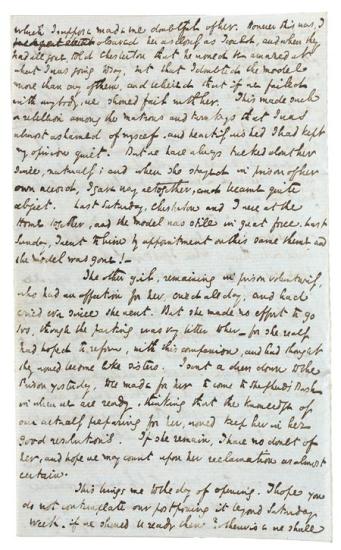
Autograph letter signed, London, 3 November 1847, to Angela Burdett-Coutts
Purchased with the assistance of the Fellows, 1951
Dickens's letters to Burdett-Coutts are, by any standard, extremely long and detailed and reveal his extraordinarily competent administrative abilities as well as shrewd insight into the minds and motivations of the women who would enter Urania Cottage. He insisted "that their past lives should never be referred to." He also recognized "that these unfortunate creatures are to be tempted to virtue. They cannot be dragged, driven, or frightened." Dickens's meticulous attention to detail is apparent in this letter, in which he informs Burdett-Coutts that "I have laid in all the dresses and linen of every sort for the whole house... I have made them as cheerful in appearance as they reasonably could be—at the same time very neat and modest."
Philanthropy
From 1840 Dickens guided the charitable work of philanthropist Angela Burdett-Coutts (1814–1906), the wealthiest heiress in Victorian Britain. Dickens served as her official almoner and helped to assess the merits of the thousands of letters she received from those seeking financial assistance. He also advised on her plan for improved sanitation in the slums of Westminster and drew her attention and support to the Ragged School Union, which provided education to London's poorest children. A pragmatist, Dickens encouraged Burdett-Coutts to direct her philanthropy toward the causes of distress. In 1847 they founded a home, Urania Cottage, in Shepherd's Bush, as a shelter for homeless women—prostitutes or petty criminals who sought to rehabilitate themselves by learning practical skills and developing self-discipline. Many of the women were assisted to eventually emigrate to one of Britain's colonies to begin a new life. For more than ten years, Dickens administered Urania Cottage on behalf of Burdett-Coutts and played an extremely active role in its day-to-day management.
Which I suppose made me doubtful of her. However this was, I observed her as closely as I could, and when they had all gone, told Chesterton that he would be amazed at what I was going to say, but that I doubted the Model more than any of them, and believed that if we failed with anybody, we should fail with her. This made such a rebellion among the Matrons and turnkeys that I was almost ashamed of myself, and heartily wished I had kept my opinion quiet. But we have always talked about her since, naturally; and when she stayed in prison of her own accord, I gave way altogether, and became quite abject. Last Saturday, Chesterton and I were at the Home together, and the Model was still in great force. Last Sunday, I went to him by appointment on this same theme, and the Model was gone!—
The other girl, remaining in prison voluntarily, who had an affection for her, cried all day, and had cried ever since she went. But she made no effort to go too, though the parting was very bitter to her—for she really had hoped to reform, with this companion, and had thought they would become like sisters. I sent a dress down to the Prison yesterday, to be made for her to come to Shepherd's Bush in when we are ready, thinking that the knowledge of our actually preparing for her, would keep her in her good resolutions. If she remain, I have no doubt of her, and hope we may count upon her reclamation as almost certain.
This brings me to the day of opening. I hope you do not contemplate our postponing it beyond Saturday Week, if we should be ready then? otherwise we shall
Letter 3 | 3 November 1847 | to Angela Burdett-Coutts, page 9
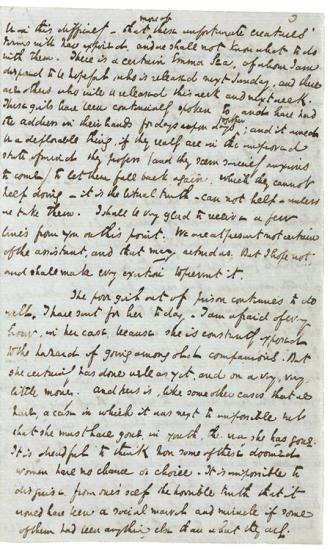
Autograph letter signed, London, 3 November 1847, to Angela Burdett-Coutts
Purchased with the assistance of the Fellows, 1951
Dickens's letters to Burdett-Coutts are, by any standard, extremely long and detailed and reveal his extraordinarily competent administrative abilities as well as shrewd insight into the minds and motivations of the women who would enter Urania Cottage. He insisted "that their past lives should never be referred to." He also recognized "that these unfortunate creatures are to be tempted to virtue. They cannot be dragged, driven, or frightened." Dickens's meticulous attention to detail is apparent in this letter, in which he informs Burdett-Coutts that "I have laid in all the dresses and linen of every sort for the whole house... I have made them as cheerful in appearance as they reasonably could be—at the same time very neat and modest."
Philanthropy
From 1840 Dickens guided the charitable work of philanthropist Angela Burdett-Coutts (1814–1906), the wealthiest heiress in Victorian Britain. Dickens served as her official almoner and helped to assess the merits of the thousands of letters she received from those seeking financial assistance. He also advised on her plan for improved sanitation in the slums of Westminster and drew her attention and support to the Ragged School Union, which provided education to London's poorest children. A pragmatist, Dickens encouraged Burdett-Coutts to direct her philanthropy toward the causes of distress. In 1847 they founded a home, Urania Cottage, in Shepherd's Bush, as a shelter for homeless women—prostitutes or petty criminals who sought to rehabilitate themselves by learning practical skills and developing self-discipline. Many of the women were assisted to eventually emigrate to one of Britain's colonies to begin a new life. For more than ten years, Dickens administered Urania Cottage on behalf of Burdett-Coutts and played an extremely active role in its day-to-day management.
be in this difficulty—that more of these unfortunate creatures' terms will have expired, and we shall not know what to do with them. There is a certain Emma Lea, of whom I am disposed to be hopeful, who is released next Sunday, and there are others who will be released this week and next week. These girls have been continually spoken to, and have had the address in their hands for days upon days together; and it would be a deplorable thing, if they really are in the improved state of mind they profess (and they seem sincerely anxious to come) to let them fall back again. Which they cannot help doing—it is the literal truth—can not help—unless we take them. I shall be very glad to receive a few lines from you on this point. We are at present not certain of the assistant, and that may retard us. But I hope not, and shall make every exertion to prevent it
The poor girl out of prison continues to do well. I have sent for her to day. I am afraid of every hour, in her case, because she is constantly exposed to the hazard of going among old companions. But she certainly has done well as yet, and on a very, very little money. And hers is, like some other cases that we have, a case in which it was next to impossible but that she must have gone, in youth, the way she has gone. It is dreadful to think how some of these doomed women have no chance or choice. It is impossible to disguise from one's self the horrible truth that it would have been a social marvel and miracle if some of them had been anything else than what they are.
Letter 3 | 3 November 1847 | to Angela Burdett-Coutts, page 10
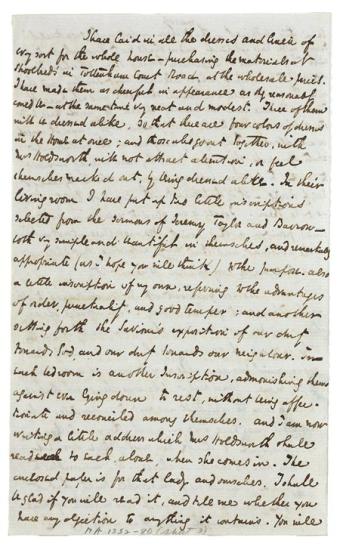
Autograph letter signed, London, 3 November 1847, to Angela Burdett-Coutts
Purchased with the assistance of the Fellows, 1951
Dickens's letters to Burdett-Coutts are, by any standard, extremely long and detailed and reveal his extraordinarily competent administrative abilities as well as shrewd insight into the minds and motivations of the women who would enter Urania Cottage. He insisted "that their past lives should never be referred to." He also recognized "that these unfortunate creatures are to be tempted to virtue. They cannot be dragged, driven, or frightened." Dickens's meticulous attention to detail is apparent in this letter, in which he informs Burdett-Coutts that "I have laid in all the dresses and linen of every sort for the whole house... I have made them as cheerful in appearance as they reasonably could be—at the same time very neat and modest."
Philanthropy
From 1840 Dickens guided the charitable work of philanthropist Angela Burdett-Coutts (1814–1906), the wealthiest heiress in Victorian Britain. Dickens served as her official almoner and helped to assess the merits of the thousands of letters she received from those seeking financial assistance. He also advised on her plan for improved sanitation in the slums of Westminster and drew her attention and support to the Ragged School Union, which provided education to London's poorest children. A pragmatist, Dickens encouraged Burdett-Coutts to direct her philanthropy toward the causes of distress. In 1847 they founded a home, Urania Cottage, in Shepherd's Bush, as a shelter for homeless women—prostitutes or petty criminals who sought to rehabilitate themselves by learning practical skills and developing self-discipline. Many of the women were assisted to eventually emigrate to one of Britain's colonies to begin a new life. For more than ten years, Dickens administered Urania Cottage on behalf of Burdett-Coutts and played an extremely active role in its day-to-day management.
I have laid in all the dresses and linen of every sort for the whole house—purchasing the materials at Shoolbred's in Tottenham Court Road, at the wholesale prices. I have made them as cheerful in appearance as they reasonably could be—at the same time very neat and modest. Three of them will be dressed alike, so that there are four colors of dresses in the Home at once; and those who go out together, with Mrs. Holdsworth, will not attract attention, or feel themselves marked out, by being dressed alike. In their living room I have put up two little inscriptions selected from the sermons of Jeremy Taylor and Barrow—both very simple and beautiful in themselves, and remarkably appropriate (as I hope you will think) to the purpose. Also a little inscription of my own, referring to the advantages of order, punctuality, and good temper; and another setting forth the Saviour's exposition of our duty towards God, and our duty towards our neighbour. In each bedroom is another Inscription, admonishing them against ever lying down to rest, without being affectionate and reconciled among themselves. And I am now writing a little address which Mrs. Holdsworth shall read to each, alone, when she comes in. The enclosed paper is for that lady and ourselves. I shall be glad if you will read it, and tell me whether you have any objection to anything it contains. You will
Letter 3 | 3 November 1847 | to Angela Burdett-Coutts, page 11
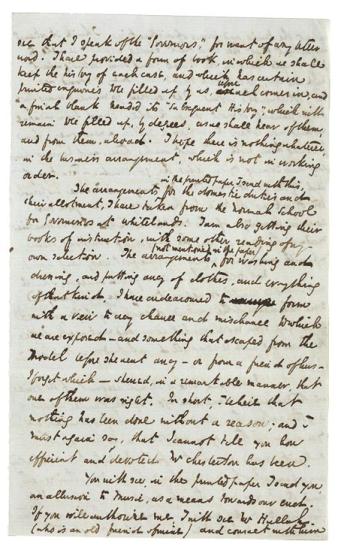
Autograph letter signed, London, 3 November 1847, to Angela Burdett-Coutts
Purchased with the assistance of the Fellows, 1951
Dickens's letters to Burdett-Coutts are, by any standard, extremely long and detailed and reveal his extraordinarily competent administrative abilities as well as shrewd insight into the minds and motivations of the women who would enter Urania Cottage. He insisted "that their past lives should never be referred to." He also recognized "that these unfortunate creatures are to be tempted to virtue. They cannot be dragged, driven, or frightened." Dickens's meticulous attention to detail is apparent in this letter, in which he informs Burdett-Coutts that "I have laid in all the dresses and linen of every sort for the whole house... I have made them as cheerful in appearance as they reasonably could be—at the same time very neat and modest."
Philanthropy
From 1840 Dickens guided the charitable work of philanthropist Angela Burdett-Coutts (1814–1906), the wealthiest heiress in Victorian Britain. Dickens served as her official almoner and helped to assess the merits of the thousands of letters she received from those seeking financial assistance. He also advised on her plan for improved sanitation in the slums of Westminster and drew her attention and support to the Ragged School Union, which provided education to London's poorest children. A pragmatist, Dickens encouraged Burdett-Coutts to direct her philanthropy toward the causes of distress. In 1847 they founded a home, Urania Cottage, in Shepherd's Bush, as a shelter for homeless women—prostitutes or petty criminals who sought to rehabilitate themselves by learning practical skills and developing self-discipline. Many of the women were assisted to eventually emigrate to one of Britain's colonies to begin a new life. For more than ten years, Dickens administered Urania Cottage on behalf of Burdett-Coutts and played an extremely active role in its day-to-day management.
see that I speak of the "Governors", for want of any better word. I have provided a form of book, in which we shall keep the history of each case, and which has certain printed enquiries to be filled up by us, before each comes in, and a final blank headed its "Subsequent History", which will remain to be filled up, by degrees, as we shall hear of them, and from them, abroad. I hope there is nothing whatever, in the business arrangement, which is not in working order.
The arrangements in the printed paper I send with this, for the domestic duties and their allotment, I have taken from the Normal School for Governesses at Whitelands. I am also getting their books of instruction, with some other reading of my own selection. The arrangements (not mentioned in the paper) for washing and dressing, and putting away of clothes, and everything of that kind, I have endeavoured to form with a view to every chance and mischance to which we are exposed—and something that escaped from the Model before she went away—or from a friend of hers—I forget which—shewed, in a remarkable manner, that one of them was right. In short, I believe that nothing has been done without a reason; and I must again say, that I cannot tell you how efficient and devoted Mr. Chesterton has been.
You will see, in the printed paper I send you, an allusion to Music, as a means towards our end. If you will authorize me, I will see Mr. Hullah (who is an old friend of mine) and consult with him
Letter 3 | 3 November 1847 | to Angela Burdett-Coutts, page 12
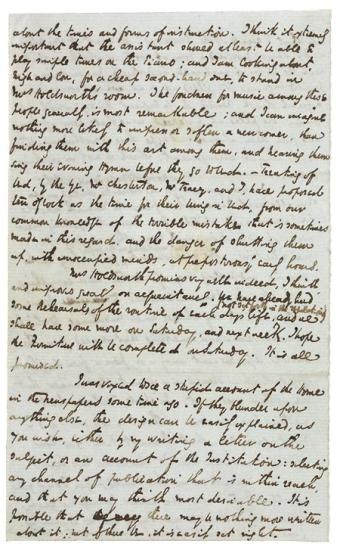
Autograph letter signed, London, 3 November 1847, to Angela Burdett-Coutts
Purchased with the assistance of the Fellows, 1951
Dickens's letters to Burdett-Coutts are, by any standard, extremely long and detailed and reveal his extraordinarily competent administrative abilities as well as shrewd insight into the minds and motivations of the women who would enter Urania Cottage. He insisted "that their past lives should never be referred to." He also recognized "that these unfortunate creatures are to be tempted to virtue. They cannot be dragged, driven, or frightened." Dickens's meticulous attention to detail is apparent in this letter, in which he informs Burdett-Coutts that "I have laid in all the dresses and linen of every sort for the whole house... I have made them as cheerful in appearance as they reasonably could be—at the same time very neat and modest."
Philanthropy
From 1840 Dickens guided the charitable work of philanthropist Angela Burdett-Coutts (1814–1906), the wealthiest heiress in Victorian Britain. Dickens served as her official almoner and helped to assess the merits of the thousands of letters she received from those seeking financial assistance. He also advised on her plan for improved sanitation in the slums of Westminster and drew her attention and support to the Ragged School Union, which provided education to London's poorest children. A pragmatist, Dickens encouraged Burdett-Coutts to direct her philanthropy toward the causes of distress. In 1847 they founded a home, Urania Cottage, in Shepherd's Bush, as a shelter for homeless women—prostitutes or petty criminals who sought to rehabilitate themselves by learning practical skills and developing self-discipline. Many of the women were assisted to eventually emigrate to one of Britain's colonies to begin a new life. For more than ten years, Dickens administered Urania Cottage on behalf of Burdett-Coutts and played an extremely active role in its day-to-day management.
about the times and forms of instruction. I think it extremely important that the assistant should at least be able to play simple tunes on the Piano; and I am looking about, high and low, for a cheap second-hand one, to stand in Mrs. Holdsworth's room. The fondness for music among these people generally, is most remarkable; and I can imagine nothing more likely to impress or soften a new comer, than finding them with this art among them, and hearing them sing their Evening Hymn before they go to bed. Treating of bed, by the bye, Mr. Chesterton, Mr. Tracey, and I, have proposed ten o'Clock as the time for their being in bed, from our common knowledge of the terrible mistake that is sometimes made in this regard, and the danger of shutting them up, with unoccupied minds, at preposterously early hours.
Mrs. Holdsworth promises very well indeed, I think, and improves greatly on acquaintance. We have already had some Rehearsals of the routine of each day's life, (not set forth in the regulations) and we shall have some more on Saturday, and next week. I hope the Furniture will be completed on Saturday. It is all promised.
I was vexed to see a stupid account of the Home in the Newspapers some time ago. If they blunder upon anything else, the design can be easily explained, as you wish, either by my writing a letter on the subject, or an account of the Institution: selecting any channel of publication that is within reach, and that you may think most desirable. It is possible that there may be nothing more written about it: but if there be, it is easily set right.
Letter 3 | 3 November 1847 | to Angela Burdett-Coutts, page 13
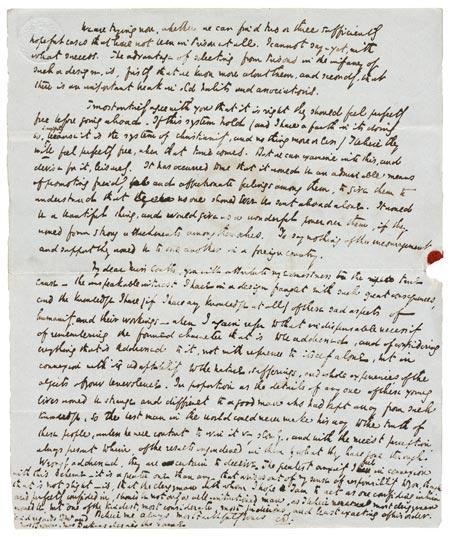
Autograph letter signed, London, 3 November 1847, to Angela Burdett-Coutts
Purchased with the assistance of the Fellows, 1951
Dickens's letters to Burdett-Coutts are, by any standard, extremely long and detailed and reveal his extraordinarily competent administrative abilities as well as shrewd insight into the minds and motivations of the women who would enter Urania Cottage. He insisted "that their past lives should never be referred to." He also recognized "that these unfortunate creatures are to be tempted to virtue. They cannot be dragged, driven, or frightened." Dickens's meticulous attention to detail is apparent in this letter, in which he informs Burdett-Coutts that "I have laid in all the dresses and linen of every sort for the whole house... I have made them as cheerful in appearance as they reasonably could be—at the same time very neat and modest."
Philanthropy
From 1840 Dickens guided the charitable work of philanthropist Angela Burdett-Coutts (1814–1906), the wealthiest heiress in Victorian Britain. Dickens served as her official almoner and helped to assess the merits of the thousands of letters she received from those seeking financial assistance. He also advised on her plan for improved sanitation in the slums of Westminster and drew her attention and support to the Ragged School Union, which provided education to London's poorest children. A pragmatist, Dickens encouraged Burdett-Coutts to direct her philanthropy toward the causes of distress. In 1847 they founded a home, Urania Cottage, in Shepherd's Bush, as a shelter for homeless women—prostitutes or petty criminals who sought to rehabilitate themselves by learning practical skills and developing self-discipline. Many of the women were assisted to eventually emigrate to one of Britain's colonies to begin a new life. For more than ten years, Dickens administered Urania Cottage on behalf of Burdett-Coutts and played an extremely active role in its day-to-day management.
e are trying now, whether we can find two or three sufficiently hopeful cases that have not been in Prison at all. I cannot say—yet, with what success. The advantage of selecting from Prisons in the infancy of such a design, is, firstly that we know more about them, and secondly, that there is an important break in old habits and associations.
I most entirely agree with you that it is right they should feel perfectly free before going abroad. If this system hold (and I have a faith in its doing so, simply because it is the system of Christianity, and nothing more or less) I believe they will feel perfectly free, when that time comes. But we can examine into this, and devise for it, leisurely. It has occurred to me that it would be an admirable means of promoting friendly and affectionate feelings among them, to give them to understand that no one should Ever be sent abroad alone. It would be a beautiful thing, and would give us a wonderful power over them, if they would form strong attachments among themselves. To say nothing of the encouragement and support they would be to one another in a foreign country.
My Dear Miss Coutts, you will attribute my earnestness to the true cause—the unspeakable interest I have in a design fraught with such great consequences, and the knowledge I have (if I have any knowledge at all) of these sad aspects of humanity, and their workings—when I again refer to that indispensable necessity of remembering the formed character that is to be addressed, and of considering everything that is addressed to it, not with reference to itself alone, but in connexion with its adaptability to the nature, sufferings, and whole experiences of the objects of your benevolence. In proportion as the details of any one of these young lives would be strange and difficult to a good man who had kept away from such knowledge, so the best man in the world could never make his way to the truth of these people, unless he were content to win it very slowly, and with the nicest perception, always present to him, of the results engendered in them by what they have gone through. Wrongly addressed, they are certain to deceive. The greatest anxiety I feel, in connexion with this scheme—it is a greater one than any that arises out of my sense of responsibility to you, though that is not slight—is, that the clergyman with whom I hope I am to act as one confiding in him and perfectly confided in, should be not only a well-intentioned man, as I believe most clergymen would be, but one of the kindest, most considerate, most judicious, and least exacting of his order.
Believe me Always Most Faithfully Yours
CD.
Letter 4 | 17 April 1850 | to Angela Burdett-Coutts, page 1
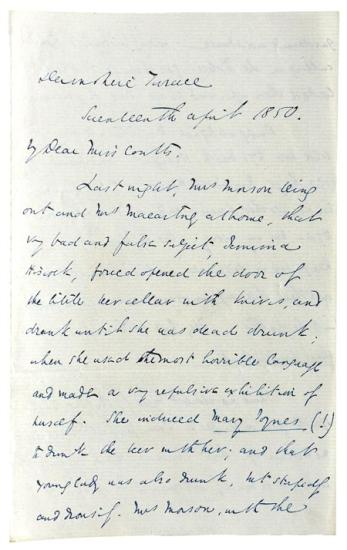
Autograph letter signed, London, 17 April 1850, to Angela Burdett-Coutts
Purchased with the assistance of the Fellows, 1951
Dickens visited London's prisons, workhouses, and other reformatory institutions to identify, interview, and recruit eligible candidates for Urania Cottage. His management of the facility involved dealing with its wide variety of problems, including some of its occasionally troublesome occupants. In this letter he reported an incident of drunkenness: "Last night, Mrs. Morson being out and Mrs. Macartney at home, that very bad and false subject, Jemima Hiscock, forced open the door of the little beer cellar with knives, and drank until she was dead drunk; when she used the most horrible language and made a very repulsive exhibition of herself. She induced Mary Joynes (!) to drink the beer with her; and that young lady was also drunk, but stupidly and drowsily."
Philanthropy
From 1840 Dickens guided the charitable work of philanthropist Angela Burdett-Coutts (1814–1906), the wealthiest heiress in Victorian Britain. Dickens served as her official almoner and helped to assess the merits of the thousands of letters she received from those seeking financial assistance. He also advised on her plan for improved sanitation in the slums of Westminster and drew her attention and support to the Ragged School Union, which provided education to London's poorest children. A pragmatist, Dickens encouraged Burdett-Coutts to direct her philanthropy toward the causes of distress. In 1847 they founded a home, Urania Cottage, in Shepherd's Bush, as a shelter for homeless women—prostitutes or petty criminals who sought to rehabilitate themselves by learning practical skills and developing self-discipline. Many of the women were assisted to eventually emigrate to one of Britain's colonies to begin a new life. For more than ten years, Dickens administered Urania Cottage on behalf of Burdett-Coutts and played an extremely active role in its day-to-day management.
My Dear Miss Coutts.
Last night, Mrs. Morson being out and Mrs. Macartney at home, that very bad and false subject, Jemima Hiscock, forced open the door of the little beer cellar with knives, and drank until she was dead drunk; when she used the most horrible language and made a very repulsive exhibition of herself. She induced Mary Joynes (!) to drink the beer with her; and that young lady was also drunk, but stupidly and drowsily. Mrs. Morson, with the
Letter 4 | 17 April 1850 | to Angela Burdett-Coutts, page 2
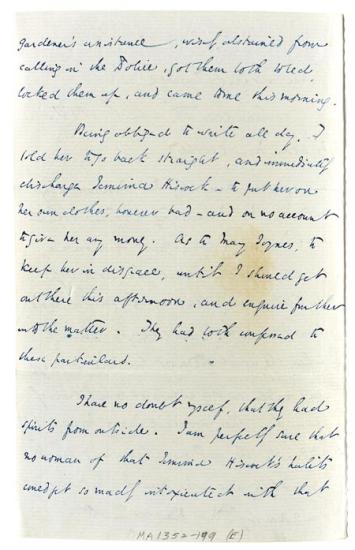
Autograph letter signed, London, 17 April 1850, to Angela Burdett-Coutts
Purchased with the assistance of the Fellows, 1951
Dickens visited London's prisons, workhouses, and other reformatory institutions to identify, interview, and recruit eligible candidates for Urania Cottage. His management of the facility involved dealing with its wide variety of problems, including some of its occasionally troublesome occupants. In this letter he reported an incident of drunkenness: "Last night, Mrs. Morson being out and Mrs. Macartney at home, that very bad and false subject, Jemima Hiscock, forced open the door of the little beer cellar with knives, and drank until she was dead drunk; when she used the most horrible language and made a very repulsive exhibition of herself. She induced Mary Joynes (!) to drink the beer with her; and that young lady was also drunk, but stupidly and drowsily."
Philanthropy
From 1840 Dickens guided the charitable work of philanthropist Angela Burdett-Coutts (1814–1906), the wealthiest heiress in Victorian Britain. Dickens served as her official almoner and helped to assess the merits of the thousands of letters she received from those seeking financial assistance. He also advised on her plan for improved sanitation in the slums of Westminster and drew her attention and support to the Ragged School Union, which provided education to London's poorest children. A pragmatist, Dickens encouraged Burdett-Coutts to direct her philanthropy toward the causes of distress. In 1847 they founded a home, Urania Cottage, in Shepherd's Bush, as a shelter for homeless women—prostitutes or petty criminals who sought to rehabilitate themselves by learning practical skills and developing self-discipline. Many of the women were assisted to eventually emigrate to one of Britain's colonies to begin a new life. For more than ten years, Dickens administered Urania Cottage on behalf of Burdett-Coutts and played an extremely active role in its day-to-day management.
gardener's assistance, wisely abstained from calling in the Police, got them both to bed, locked them up, and came to me this morning.
Being obliged to write all day, I told her to go back straight, and immediately discharge Jemima Hiscock—to put her on her own clothes, however bad—and on no account to give her any money. As to Mary Joynes, to keep her in disgrace, until I should get out there this afternoon, and enquire further into the matter. They had both confessed to these particulars.
I have no doubt myself, that they had spirits from outside. I am perfectly sure that no woman of that Jemima Hiscock's habits, could get so madly intoxicated with that
Letter 4 | 17 April 1850 | to Angela Burdett-Coutts, page 3
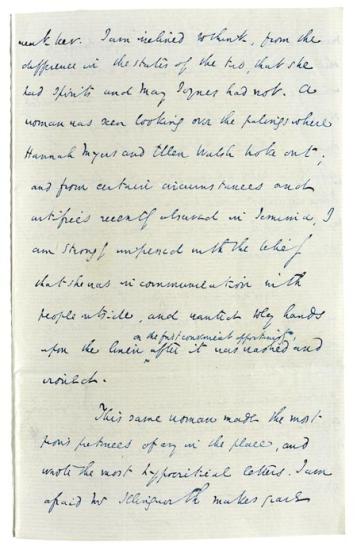
Autograph letter signed, London, 17 April 1850, to Angela Burdett-Coutts
Purchased with the assistance of the Fellows, 1951
In his 1853 essay "Home for Homeless Women," published in his weekly magazine Household Words, Dickens wrote that the Urania Cottage project hoped to achieve success in thirty to fifty percent of its cases. By 1853 it had exceeded this goal: of the fifty-eight women who had passed through the home, thirty were thought to have flourished after emigration. In the case of the other inmates, three had relapsed during the passage to Australia, seven had left the home during the probationary period, seven had fled, and ten had been discharged. In this letter to William Brown, the physician on the Urania Cottage management committee, Dickens commented that one of the expelled women, named Sesina, "would corrupt a Nunnery in a fortnight."
Philanthropy
From 1840 Dickens guided the charitable work of philanthropist Angela Burdett-Coutts (1814–1906), the wealthiest heiress in Victorian Britain. Dickens served as her official almoner and helped to assess the merits of the thousands of letters she received from those seeking financial assistance. He also advised on her plan for improved sanitation in the slums of Westminster and drew her attention and support to the Ragged School Union, which provided education to London's poorest children. A pragmatist, Dickens encouraged Burdett-Coutts to direct her philanthropy toward the causes of distress. In 1847 they founded a home, Urania Cottage, in Shepherd's Bush, as a shelter for homeless women—prostitutes or petty criminals who sought to rehabilitate themselves by learning practical skills and developing self-discipline. Many of the women were assisted to eventually emigrate to one of Britain's colonies to begin a new life. For more than ten years, Dickens administered Urania Cottage on behalf of Burdett-Coutts and played an extremely active role in its day-to-day management.
weak beer. I am inclined to think, from the difference in the states of the two, that she had spirits and Mary Joynes had not. A woman was seen looking over the palings where Hannah Myers and Ellen Walsh broke out; and from certain circumstances and artifices recently observed in Jemima, I am strongly impressed with the belief that she was in communication with people outside, and wanted to lay hands upon the linen on the first convenient opportunity, after it was washed and ironed.
This same woman made the most pious pretences of any in the place, and wrote the most hypocritical letters. I am afraid Mr. Illingworth makes grave
Letter 4 | 17 April 1850 | to Angela Burdett-Coutts, page 4
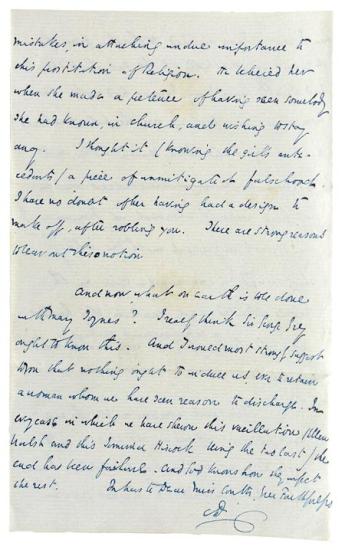
Autograph letter signed, London, 17 April 1850, to Angela Burdett-Coutts
Purchased with the assistance of the Fellows, 1951
Dickens came of age, professionally, as a political reporter at the time of the first Parliamentary Reform Act in 1832. He distrusted and despised most politicians, and once referred to the House of Commons as "that great Dust Heap down at Westminster." His own political position was broadly reformist, his main concern being the improvement of people's standards of living and the efficiency of government. In this letter he states his political faith: "The people will not bear for any length of time what they bear now.... For this reason solely, I am a Reformer heart and soul. I have nothing to gain—everything to lose (for public quiet is my bread)—but I am in desperate earnest, because I know it is a desperate case."
Philanthropy
From 1840 Dickens guided the charitable work of philanthropist Angela Burdett-Coutts (1814–1906), the wealthiest heiress in Victorian Britain. Dickens served as her official almoner and helped to assess the merits of the thousands of letters she received from those seeking financial assistance. He also advised on her plan for improved sanitation in the slums of Westminster and drew her attention and support to the Ragged School Union, which provided education to London's poorest children. A pragmatist, Dickens encouraged Burdett-Coutts to direct her philanthropy toward the causes of distress. In 1847 they founded a home, Urania Cottage, in Shepherd's Bush, as a shelter for homeless women—prostitutes or petty criminals who sought to rehabilitate themselves by learning practical skills and developing self-discipline. Many of the women were assisted to eventually emigrate to one of Britain's colonies to begin a new life. For more than ten years, Dickens administered Urania Cottage on behalf of Burdett-Coutts and played an extremely active role in its day-to-day management.
mistakes, in attaching undue importance to this prostitution of Religion. He believed her when she made a pretence of having seen somebody she had known, in Church, and wishing to stay away. I thought it (knowing the girl's antecedents) a piece of unmitigated falsehood. I have no doubt of her having had a design to make off, after robbing you. There are strong reasons to bear out this notion.
And now, what on earth is to be done with Mary Joynes? I really think Sir George Grey ought to know this. And I would most strongly suggest to you that nothing ought to induce us, ever to retain a woman whom we have seen reason to discharge. In every case in which we have shewn this vacillation (Ellen Walsh and this Jemima Hiscock being the two last) the end has been failure. And God knows how they infect the rest. In haste Dear Miss Coutts, Ever Faithfully Yrs.
CD.
Letter 5 | 7 November 1849 | to William Brown, page 1
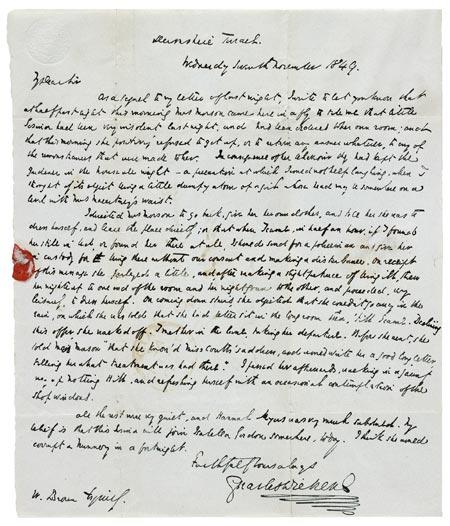
Autograph letter signed, London, 7 November 1849, to William Brown
Purchased with the assistance of the Fellows, 1951
In his 1853 essay "Home for Homeless Women," published in his weekly magazine Household Words, Dickens wrote that the Urania Cottage project hoped to achieve success in thirty to fifty percent of its cases. By 1853 it had exceeded this goal: of the fifty-eight women who had passed through the home, thirty were thought to have flourished after emigration. In the case of the other inmates, three had relapsed during the passage to Australia, seven had left the home during the probationary period, seven had fled, and ten had been discharged. In this letter to William Brown, the physician on the Urania Cottage management committee, Dickens commented that one of the expelled women, named Sesina, "would corrupt a Nunnery in a fortnight."
Philanthropy
From 1840 Dickens guided the charitable work of philanthropist Angela Burdett-Coutts (1814–1906), the wealthiest heiress in Victorian Britain. Dickens served as her official almoner and helped to assess the merits of the thousands of letters she received from those seeking financial assistance. He also advised on her plan for improved sanitation in the slums of Westminster and drew her attention and support to the Ragged School Union, which provided education to London's poorest children. A pragmatist, Dickens encouraged Burdett-Coutts to direct her philanthropy toward the causes of distress. In 1847 they founded a home, Urania Cottage, in Shepherd's Bush, as a shelter for homeless women—prostitutes or petty criminals who sought to rehabilitate themselves by learning practical skills and developing self-discipline. Many of the women were assisted to eventually emigrate to one of Britain's colonies to begin a new life. For more than ten years, Dickens administered Urania Cottage on behalf of Burdett-Coutts and played an extremely active role in its day-to-day management.
My Dear Sir
As a sequel to my letter of last night, I write to let you know that at halfpast eight this morning Mrs. Morson came here in a fly to tell me that little Sesina had been very insolent last night, and had been ordered to her own room; and that this morning she positively refused to get up, or to return any answer whatever, to any of the remonstrances that were made to her. In consequence of her behaviour they had kept the gardener in the house all night—a precaution at which I could not help laughing, when I thought of its object being a little dumpy atom of a girl whose head may be somewhere on a level with Mrs. Macartney's waist.
I directed Mrs. Morson to go back, give her her own clothes, and tell her she was to dress herself, and leave the place directly; or that when I came, in half an hour, if I found her still in bed, or found her there at all, I should send for a policeman and give her in custody for being there without our consent and making a disturbance. On receipt of this message she parleyed a little, and, after making a slight pretence of being ill, th[r]ew her nightcap to one end of the room and her nightgown to the other, and proceeded, very leisurely, to dress herself. On coming down stairs, she objected that she couldn't go away in the rain, on which she was told that she had better sit in the long room then, 'till I came. Declining this offer, she walked off. I met her in the lane, taking her departure. Before she went, she told Mrs. Morson "that she know'd Miss Coutts's address, and would write her a good long letter, telling her what treatment was had there." I passed her afterwards, walking in a jaunty way up Notting Hill, and refreshing herself with an occasional contemplation of the shop windows.
All the rest were very quiet, and Hannah Myers was very much subdued. My belief is that this Sesina will join Isabella Gordon somewhere, today. I think she would corrupt a Nunnery in a fortnight.
Faithfully Yours always
CHARLES DICKENS
Letter 6 | 11 May 1855 | to Angela Burdett Coutts, page 1
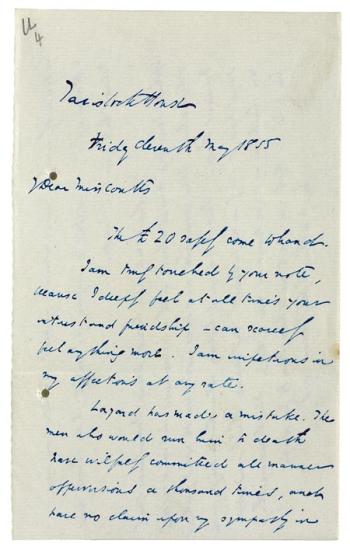
Autograph letter signed, London, 11 May 1855, to Angela Burdett Coutts
Purchased with the assistance of the Fellows, 1951
Dickens came of age, professionally, as a political reporter at the time of the first Parliamentary Reform Act in 1832. He distrusted and despised most politicians, and once referred to the House of Commons as "that great Dust Heap down at Westminster." His own political position was broadly reformist, his main concern being the improvement of people's standards of living and the efficiency of government. In this letter he states his political faith: "The people will not bear for any length of time what they bear now.... For this reason solely, I am a Reformer heart and soul. I have nothing to gain—everything to lose (for public quiet is my bread)—but I am in desperate earnest, because I know it is a desperate case."
Philanthropy
From 1840 Dickens guided the charitable work of philanthropist Angela Burdett-Coutts (1814–1906), the wealthiest heiress in Victorian Britain. Dickens served as her official almoner and helped to assess the merits of the thousands of letters she received from those seeking financial assistance. He also advised on her plan for improved sanitation in the slums of Westminster and drew her attention and support to the Ragged School Union, which provided education to London's poorest children. A pragmatist, Dickens encouraged Burdett-Coutts to direct her philanthropy toward the causes of distress. In 1847 they founded a home, Urania Cottage, in Shepherd's Bush, as a shelter for homeless women—prostitutes or petty criminals who sought to rehabilitate themselves by learning practical skills and developing self-discipline. Many of the women were assisted to eventually emigrate to one of Britain's colonies to begin a new life. For more than ten years, Dickens administered Urania Cottage on behalf of Burdett-Coutts and played an extremely active role in its day-to-day management.
My Dear Miss Coutts
The £20 safely come to hand.
I am truly touched by your note, because I deeply feel at all times your interest and friendship—can scarcely feel anything more. I am impetuous in my affections at any rate.
Layard has made a mistake. The men who would run him to death have wilfully
committed all manner of perversions a thousand times, and have no claim upon my sympathy in
Letter 6 | 11 May 1855 | to Angela Burdett Coutts, page 2
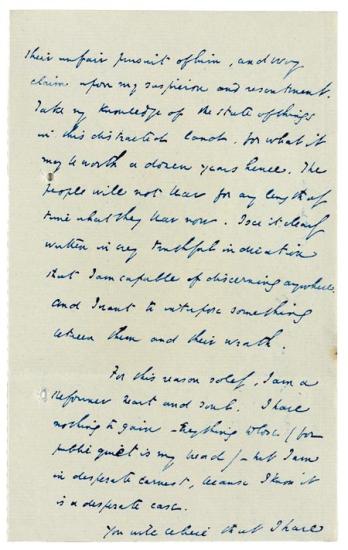
Autograph letter signed, London, 11 May 1855, to Angela Burdett Coutts
Purchased with the assistance of the Fellows, 1951
Dickens came of age, professionally, as a political reporter at the time of the first Parliamentary Reform Act in 1832. He distrusted and despised most politicians, and once referred to the House of Commons as "that great Dust Heap down at Westminster." His own political position was broadly reformist, his main concern being the improvement of people's standards of living and the efficiency of government. In this letter he states his political faith: "The people will not bear for any length of time what they bear now.... For this reason solely, I am a Reformer heart and soul. I have nothing to gain—everything to lose (for public quiet is my bread)—but I am in desperate earnest, because I know it is a desperate case."
Philanthropy
From 1840 Dickens guided the charitable work of philanthropist Angela Burdett-Coutts (1814–1906), the wealthiest heiress in Victorian Britain. Dickens served as her official almoner and helped to assess the merits of the thousands of letters she received from those seeking financial assistance. He also advised on her plan for improved sanitation in the slums of Westminster and drew her attention and support to the Ragged School Union, which provided education to London's poorest children. A pragmatist, Dickens encouraged Burdett-Coutts to direct her philanthropy toward the causes of distress. In 1847 they founded a home, Urania Cottage, in Shepherd's Bush, as a shelter for homeless women—prostitutes or petty criminals who sought to rehabilitate themselves by learning practical skills and developing self-discipline. Many of the women were assisted to eventually emigrate to one of Britain's colonies to begin a new life. For more than ten years, Dickens administered Urania Cottage on behalf of Burdett-Coutts and played an extremely active role in its day-to-day management.
their unfair pursuit of him, and every claim upon my suspicion and resentment. Take my knowledge of the state of things in this distracted land, for what it may be worth a dozen years hence. The people willnot bear for any length of time what they bear now. I see it clearly written in every truthful indication that I am capable of discerning anywhere. And I want to interpose something between them and their wrath.
For this reason solely, I am a Reformer heart and soul. I have nothing to gain—everything to lose (for public quiet is my bread)—but I am in desperate earnest, because I know it is a desperate case.
You will believe that I have
Letter 6 | 11 May 1855 | to Angela Burdett Coutts, page 3

Autograph letter signed, London, 11 May 1855, to Angela Burdett Coutts
Purchased with the assistance of the Fellows, 1951
Dickens came of age, professionally, as a political reporter at the time of the first Parliamentary Reform Act in 1832. He distrusted and despised most politicians, and once referred to the House of Commons as "that great Dust Heap down at Westminster." His own political position was broadly reformist, his main concern being the improvement of people's standards of living and the efficiency of government. In this letter he states his political faith: "The people will not bear for any length of time what they bear now.... For this reason solely, I am a Reformer heart and soul. I have nothing to gain—everything to lose (for public quiet is my bread)—but I am in desperate earnest, because I know it is a desperate case."
Philanthropy
From 1840 Dickens guided the charitable work of philanthropist Angela Burdett-Coutts (1814–1906), the wealthiest heiress in Victorian Britain. Dickens served as her official almoner and helped to assess the merits of the thousands of letters she received from those seeking financial assistance. He also advised on her plan for improved sanitation in the slums of Westminster and drew her attention and support to the Ragged School Union, which provided education to London's poorest children. A pragmatist, Dickens encouraged Burdett-Coutts to direct her philanthropy toward the causes of distress. In 1847 they founded a home, Urania Cottage, in Shepherd's Bush, as a shelter for homeless women—prostitutes or petty criminals who sought to rehabilitate themselves by learning practical skills and developing self-discipline. Many of the women were assisted to eventually emigrate to one of Britain's colonies to begin a new life. For more than ten years, Dickens administered Urania Cottage on behalf of Burdett-Coutts and played an extremely active role in its day-to-day management.
no sympathy with any mis-statement of fact, or hesitation in withdrawing it. I wouldn't be unfair, if I knew it, to any human being. I should hate myself if I were.
You think me impetuous, because I sometimes speak of things I have long thought about, with a suddenness that brings me only to the conclusion I have come at, and does not shew the road by which I arrived there. But it is a broad highway notwithstanding, and I have trod it slowly and patiently. Only believe that,—and you may think me as impetuous as you like. Think me anything you like, so that you write me letters I am so proud of.
Ever Most Faithfully Yours
CD.
Letter 7 | 31 January 1842 | to William Charles Macready, page 1
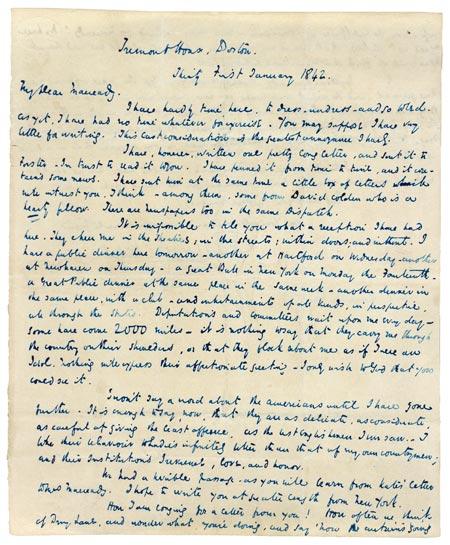
Autograph letter signed, Boston, 31 January 1842, to William Charles Macready
Acquired by Pierpont Morgan before 1913
Writing to Macready less than two weeks after his arrival in the United States, Dickens reported excitedly that, "It is impossible to tell you what a reception I have had here. They cheer me in the Theatres; in the streets; within doors; and without.... Deputations and Committees wait upon me every day—some have come 2,000 miles—it is nothing to say that they carry me through the country on their shoulders, or that they flock about me as if I were an Idol. Nothing will express their affectionate greeting—I only wish to God that you could see it." This attention and adulation was exhausting, however, and Dickens wrote to John Forster on 29 January that, "we are already weary, at times, past all expression."
America
Dickens visited the United States twice, first traveling extensively with his wife from 22 January to 7 June 1842. Twenty-five years later—from 19 November 1867 to 22 April 1868—he returned alone for an exhausting reading tour.
Prior to his first visit, he had "dreamed by day and night, for years, of setting foot upon this shore, and breathing this pure air." He received an unprecedented enthusiastic and extravagant welcome, as befitted the world's first literary superstar. But he soon grew tired of the intrusion resulting from his lionization. After making several vehement speeches in favor of an international copyright agreement that would protect his work from piracy in the United States, he was deeply hurt by the vitriolic response of the American press. His bitter disappointment is recorded in American Notes for General Circulation and his novel Martin Chuzzlewit (1843–44).
When Dickens returned in 1867, his fame, and the adulation it inspired, had intensified. In seventy-six public readings, he performed for more than one hundred thousand people and earned $95,000, equivalent to approximately $1.5 million in today's money.
My Dear Macready.
I have hardly time, here, to dress—undress—and go to bed. As yet, I have had no time whatever for exercise. You may suppose I have very little for writing. This last consideration is the greatest annoyance I have.
I have, however, written one pretty long letter, and sent it to Forster—In trust to read it to you. I have penned it from time to time, and it contains some news. I have sent him at the same time a little box of letters which will interest you, I think—among them, some from David Colden who is a hearty fellow. There are Newspapers too in the same Dispatch.
It is impossible to tell you what a reception I have had here. They cheer me in the Theatres; in the streets; within doors; and without. I have a public dinner here tomorrow—another at Hartford on Wednesday—another at Newhaven on Thursday—a great Ball in New York on Monday the Fourteenth—a Great Public dinner at the same place in the same week—another dinner in the same place, with a club—and entertainments of all kinds, in perspective, all through the States. Deputations and Committees wait upon me every day—some have come 2000 miles—it is nothing to say that they carry me through the country on their shoulders, or that they flock about me as if I were an Idol. Nothing will express their affectionate greeting—I only wish to God that you could see it.
I won't say a word about the Americans until I have gone further. It is enough to say, now, that they are as delicate, as considerate, as careful of giving the least offence, as the best Englishmen I ever saw.—I like their behaviour to Ladies infinitely better than that of my own countrymen; and their Institutions I reverence, love, and honor.
We had a terrible passage—as you will learn from Kate's letter to Mrs. Macready. I hope to write you at greater length from New York.
How I am longing for a letter from you! How often we think of Drury Lane, and wonder what you're doing, and say 'Now the curtain's going
Letter 7 | 31 January 1842 | to William Charles Macready, page 2

Autograph letter signed, Boston, 31 January 1842, to William Charles Macready
Acquired by Pierpont Morgan before 1913
Writing to Macready less than two weeks after his arrival in the United States, Dickens reported excitedly that, "It is impossible to tell you what a reception I have had here. They cheer me in the Theatres; in the streets; within doors; and without.... Deputations and Committees wait upon me every day—some have come 2,000 miles—it is nothing to say that they carry me through the country on their shoulders, or that they flock about me as if I were an Idol. Nothing will express their affectionate greeting—I only wish to God that you could see it." This attention and adulation was exhausting, however, and Dickens wrote to John Forster on 29 January that, "we are already weary, at times, past all expression."
America
Dickens visited the United States twice, first traveling extensively with his wife from 22 January to 7 June 1842. Twenty-five years later—from 19 November 1867 to 22 April 1868—he returned alone for an exhausting reading tour.
Prior to his first visit, he had "dreamed by day and night, for years, of setting foot upon this shore, and breathing this pure air." He received an unprecedented enthusiastic and extravagant welcome, as befitted the world's first literary superstar. But he soon grew tired of the intrusion resulting from his lionization. After making several vehement speeches in favor of an international copyright agreement that would protect his work from piracy in the United States, he was deeply hurt by the vitriolic response of the American press. His bitter disappointment is recorded in American Notes for General Circulation and his novel Martin Chuzzlewit (1843–44).
When Dickens returned in 1867, his fame, and the adulation it inspired, had intensified. In seventy-six public readings, he performed for more than one hundred thousand people and earned $95,000, equivalent to approximately $1.5 million in today's money.
up—now the halfprice is coming in—now they're calling for Macready'. We have agreed not to believe that there is any difference between the clocks here and those at home; and we find it a marvellous satisfaction.
My Dear Macready I won't thank you for the peace of mind you have given us, and the perfect confidence we have through you in our dear children being well cared-for, and thoroughly happy.—If I could but shake hands with you, on the penalty of not saying one word—as they shewed the figures of the absent, in the Magic Mirror of the Fairy Tale—I could express more in one squeeze than in a score of letters.
I thirst for news of Drury Lane. I don't know how we shall restrain ourselves when the time approaches for the arrival of the packet.
God bless you My Dear Macready!
Ever Your attached and most affectionate friend
CHARLES DICKENS
Letter 8 | 22 March 1842 | to Angela Burdett Coutts, page 1

Autograph letter signed, Baltimore, 22 March 1842, to Angela Burdett Coutts
Purchased with the assistance of the Fellows, 1951
Two months into his U.S. tour, Dickens reported his impressions to Burdett-Coutts. He lamented: "The truth is that they give me everything here, but Time. That they never will leave me alone. That I shake hands every day when I am not travelling, with five or six hundred people.... They gave me a ball at New York, at which Three Thousand people were present—and a public dinner besides.... Others were projected, literally all through the States, but I gave public notice, that I couldn't accept them: being of mere flesh and blood, and having only mortal powers of digestion." His postscript noted that when he arrived in Richmond, Virginia, "the prematurely hot weather, and the sight of slaves, turned me back."
America
Dickens visited the United States twice, first traveling extensively with his wife from 22 January to 7 June 1842. Twenty-five years later—from 19 November 1867 to 22 April 1868—he returned alone for an exhausting reading tour.
Prior to his first visit, he had "dreamed by day and night, for years, of setting foot upon this shore, and breathing this pure air." He received an unprecedented enthusiastic and extravagant welcome, as befitted the world's first literary superstar. But he soon grew tired of the intrusion resulting from his lionization. After making several vehement speeches in favor of an international copyright agreement that would protect his work from piracy in the United States, he was deeply hurt by the vitriolic response of the American press. His bitter disappointment is recorded in American Notes for General Circulation and his novel Martin Chuzzlewit (1843–44).
When Dickens returned in 1867, his fame, and the adulation it inspired, had intensified. In seventy-six public readings, he performed for more than one hundred thousand people and earned $95,000, equivalent to approximately $1.5 million in today's money.
Dear Miss Coutts.
You have long ago discharged from your mind any favorable opinion you may ever have entertained of me—and have set me down, I know, as a neglectful, erratic, promise-breaking, and most unworthy person.
And yet I have not forgotten the book you asked me to bring home for you— nor the pebble I am to gather for Lady Burdett at Niagara—nor the something unstipulated which I am to put in my portmanteau for Miss Meredith. The truth is that they give me everything here, but Time. That they never will leave me alone. That I shake hands every day when I am not travelling, with five or six hundred people. That Mrs. Dickens and I hold a formal Levee in every town we come to, and usually faint away (from fatigue) every day while dressing for dinner.—In a word, that we devoutly long for Home, and look forward to the seventh of next June when we sail, please God, from New York—most ardently.
I have sent you some newspapers; and I hope they have reached you. They gave me a ball at New York, at which Three Thousand people were present—and a public dinner besides—and another in Boston—and another in a place called Hertford. Others were projected, literally all through the States, but I gave public notice, that I couldn't accept them: being of mere flesh and blood, and having only mortal powers of digestion. But I have made an exception in favor of one body of readers at St. Louis—a town in the Far West, on the confines of the Indian territory. I am going there to dinner—it's only two thousand miles from here—and start the day after tomorrow.
I look forward to making such an impression on you with the store of anecdote and description with which I shall return, that I can't find it in my Heart to open it—on paper. I don't see how I shall
Letter 8 | 22 March 1842 | to Angela Burdett Coutts, page 2

Autograph letter signed, Baltimore, 22 March 1842, to Angela Burdett Coutts
Purchased with the assistance of the Fellows, 1951
Two months into his U.S. tour, Dickens reported his impressions to Burdett-Coutts. He lamented: "The truth is that they give me everything here, but Time. That they never will leave me alone. That I shake hands every day when I am not travelling, with five or six hundred people.... They gave me a ball at New York, at which Three Thousand people were present—and a public dinner besides.... Others were projected, literally all through the States, but I gave public notice, that I couldn't accept them: being of mere flesh and blood, and having only mortal powers of digestion." His postscript noted that when he arrived in Richmond, Virginia, "the prematurely hot weather, and the sight of slaves, turned me back."
America
Dickens visited the United States twice, first traveling extensively with his wife from 22 January to 7 June 1842. Twenty-five years later—from 19 November 1867 to 22 April 1868—he returned alone for an exhausting reading tour.
Prior to his first visit, he had "dreamed by day and night, for years, of setting foot upon this shore, and breathing this pure air." He received an unprecedented enthusiastic and extravagant welcome, as befitted the world's first literary superstar. But he soon grew tired of the intrusion resulting from his lionization. After making several vehement speeches in favor of an international copyright agreement that would protect his work from piracy in the United States, he was deeply hurt by the vitriolic response of the American press. His bitter disappointment is recorded in American Notes for General Circulation and his novel Martin Chuzzlewit (1843–44).
When Dickens returned in 1867, his fame, and the adulation it inspired, had intensified. In seventy-six public readings, he performed for more than one hundred thousand people and earned $95,000, equivalent to approximately $1.5 million in today's money.
ever get rid of my gatherings. It seems to me, at present, that when I come home I must take a cottage on Putney Heath, or Richmond Green, or some other wild and desolate place, and talk to myself for a month or two, until I have sobered down a little, and am quiet again. A prophetic feeling comes upon me sometimes, and hints that I shall return, a bore—.
We had a terrible passage out, and mean to return in a sailing ship. Can you think of anything I can bring back for you? If you can possibly commission me to bring you any article whatever from the New Country, I need scarcely say how proud and glad you will make me. Any letter addressed to me to the care of David Colden Esquire 28 Laight Street Hudson Square New York, would be forwarded to me wheresoever I might chance to be at the time of its receipt.
May I ask you when you next see Mr. Marjoribanks to tell him, with my best regards, that I thank him very much for his letters, and have received the greatest attention from all his correspondents—except the poor gentleman at Washington—who has been dead six years. Not finding him readily (no wonder!) I went into a bank to ask for him. I happened to make the enquiry of a very old clerk, who staggered to a stool and fell into a cold perspiration, as if he had seen a spectre. Being feeble, and the shock being very great, he took to his bed—but he has since recovered: to the great joy of his wife and family.
With every good and cordial wish for your health and happiness—many messages of regard to Miss Meredith—and very many scruples of conscience in sending you so poor a letter from so long a distance—I am always, Dear Miss Coutts,
With true regard | Faithfully Your obliged friend
CHARLES DICKENS
P.S. I forgot to say that I have been at Washington (which is beyond here) and as far beyond that, again, as Richmond in Virginia. But the prematurely hot weather, and the sight of slaves, turned me back.
Letter 9 | 22 March 1842 | to William Charles Macready, page 1

Autograph letter signed, Baltimore, 22 March 1842, to William Charles Macready
Acquired by Pierpont Morgan before 1913
The same day Dickens wrote to Angela Burdett-Coutts, he penned a more reflective, candid letter to Macready, expressing his overall impressions of the United States: "The people are affectionate, generous, open-hearted, hospitable, enthusiastic, good humoured, polite to women, frank and cordial to all strangers; anxious to oblige; far less prejudiced than they have been described to be; frequently polished and refined, very seldom rude or disagreeable." Nevertheless, Dickens concluded: "I am disappointed. This is not the Republic I came to see. This is not the Republic of my imagination. In every respect but that of National Education, the Country disappoints me. ... And England, even England, bad and faulty as the old land is, and miserable as millions of her people are, rises in the comparison."
America
Dickens visited the United States twice, first traveling extensively with his wife from 22 January to 7 June 1842. Twenty-five years later—from 19 November 1867 to 22 April 1868—he returned alone for an exhausting reading tour.
Prior to his first visit, he had "dreamed by day and night, for years, of setting foot upon this shore, and breathing this pure air." He received an unprecedented enthusiastic and extravagant welcome, as befitted the world's first literary superstar. But he soon grew tired of the intrusion resulting from his lionization. After making several vehement speeches in favor of an international copyright agreement that would protect his work from piracy in the United States, he was deeply hurt by the vitriolic response of the American press. His bitter disappointment is recorded in American Notes for General Circulation and his novel Martin Chuzzlewit (1843–44).
When Dickens returned in 1867, his fame, and the adulation it inspired, had intensified. In seventy-six public readings, he performed for more than one hundred thousand people and earned $95,000, equivalent to approximately $1.5 million in today's money.
My Dear Friend.
I beg your pardon—but you were speaking of rash leaps at hasty conclusions. Are you quite sure you designed that remark for me? Have you not, in the hurry of correspondence, slipped a paragraph into my letter, which belongs of right to somebody else? When did you ever know me leap at a wrong conclusion? I pause for a reply. Pray Sir did you ever find me admiring Mr. Bryden? On the contrary, did you never hear of my protesting through good, better, and best report, that he was not an open or a candid man and would one day beyond all doubt displease you by not being so. I pause again for a reply.
Are you quite sure, Mr. Macready,—and I address myself to you with the sternness of a man in the pit—are you quite sure Sir, that you do not view America through the pleasant mirage which often surrounds a thing that has been, but not a thing that is. Are you quite sure that when you were here, you relished it as well as you do now, when you look back upon it. The early spring birds, Mr. Macready, do sing in the groves, that you were very often not over well pleased with many of the new Country's social aspects. Are the birds to be trusted? Again I pause for a reply.
My dear Macready, I desire to be so honest and just to those who have so enthusiastically and earnestly welcomed me, that I burned the last letter I wrote to you—even to you to whom I would speak as to myself—rather than let it come with anything that might seem like an ill-considered word of disappointment. I preferred that you should think me neglectful (if you could imagine anything so wild) rather than I should do wrong in this respect.—Still it is of no use. I am disappointed. This is not the Republic I came to see. This is not the Republic of my imagination. I infinitely prefer a liberal Monarchy—even with its sickening accompaniments of Court Circulars, and Kings of Prussia—to such a Government as this. In every respect but that of National Education, the Country disappoints me. The more I think of its youth and strength, the poorer and more trifling in a thousand respects, it appears in my eyes. In everything of which it has made a boast—excepting its education of the people, and its care for poor children—it sinks immeasurably below the level I had placed it upon. And England, even England, bad and faulty as the old land is, and miserable as millions of her people are, rises in the comparison. Strike down the established church, and I would take her to my heart for better or worse, and reject this new love without a pang or moment's hesitation.
You live here, Macready, as I have sometimes heard you imagining! You! Loving you with all my heart and soul, and knowing what your disposition really is, I would not condemn you to a year's residence on this side of the Atlantic, for any money. Freedom of opinion! Where is it? I see a press more mean and paltry and silly and disgraceful than any country ever knew,—if that be its standard, here it is. But I speak of Bancroft, and am advised to be silent on that subject, for he is "a black sheep—a democrat". I speak of Bryant, and am entreated to be more careful—for the same reason. I speak of International copyright, and am implored not to ruin myself outright. I speak of Miss Martineau, and all parties—slave upholders and abolitionists; Whigs, Tyler Whigs, and
Letter 9 | 22 March 1842 | to William Charles Macready, page 2

Autograph letter signed, Baltimore, 22 March 1842, to William Charles Macready
Acquired by Pierpont Morgan before 1913
The same day Dickens wrote to Angela Burdett-Coutts, he penned a more reflective, candid letter to Macready, expressing his overall impressions of the United States: "The people are affectionate, generous, open-hearted, hospitable, enthusiastic, good humoured, polite to women, frank and cordial to all strangers; anxious to oblige; far less prejudiced than they have been described to be; frequently polished and refined, very seldom rude or disagreeable." Nevertheless, Dickens concluded: "I am disappointed. This is not the Republic I came to see. This is not the Republic of my imagination. In every respect but that of National Education, the Country disappoints me. ... And England, even England, bad and faulty as the old land is, and miserable as millions of her people are, rises in the comparison."
America
Dickens visited the United States twice, first traveling extensively with his wife from 22 January to 7 June 1842. Twenty-five years later—from 19 November 1867 to 22 April 1868—he returned alone for an exhausting reading tour.
Prior to his first visit, he had "dreamed by day and night, for years, of setting foot upon this shore, and breathing this pure air." He received an unprecedented enthusiastic and extravagant welcome, as befitted the world's first literary superstar. But he soon grew tired of the intrusion resulting from his lionization. After making several vehement speeches in favor of an international copyright agreement that would protect his work from piracy in the United States, he was deeply hurt by the vitriolic response of the American press. His bitter disappointment is recorded in American Notes for General Circulation and his novel Martin Chuzzlewit (1843–44).
When Dickens returned in 1867, his fame, and the adulation it inspired, had intensified. In seventy-six public readings, he performed for more than one hundred thousand people and earned $95,000, equivalent to approximately $1.5 million in today's money.
Democrats, shower down upon her a perfect cataract of abuse. "But what has she done? Surely she praised America enough!"—"Yes, but she told us of some of our faults, and Americans can't bear to be told of their faults. Don't split on that rock, Mr. Dickens, don't write about America—we are so very suspicious."— Freedom of opinion! Macready, if I had been born here, and had written my books in this country,—producing them with no stamp of approval from any other land—it is my solemn belief that I should have lived and died, poor, unnoticed, and "a black sheep"—to boot. I never was more convinced of anything than I am of that.
The people are affectionate , generous, open-hearted, hospitable, enthusiastic, good humoured, polite to women, frank and cordial to all strangers; anxious to oblige; far less prejudiced than they have been described to be; frequently polished and refined, very seldom rude or disagreeable. I have made a great many friends here, even in public conveyances, whom I have been truly sorry to part from. In the towns, I have formed perfect attachments. I have seen none of that greediness and indecorum on which travellers have laid so much emphasis. I have returned frankness with frankness—met questions not intended to be rude, with answers meant to be satisfactory—and have not spoken to one man, woman, or child of any degree, who has not grown positively affectionate before we parted. In the respects of not being left alone, and of being horribly disgusted by tobacco chewing and tobacco spittle, I have suffered considerably. The sight of Slavery in Virginia; the hatred of British feeling upon that subject; and the miserable hints of the impotent indignation of the South, have pained me very much—on the last head, of course, I have felt nothing but a mingled pity and amusement; on the others, sheer distress. But however much I like the ingredients of this great dish, I cannot but come back to the point from which I started, and say that the dish itself goes against the grain with me, and that I don't like it.
You know that I am, truly, a Liberal. I believe I have as little Pride as most men; and I am conscious of not the smallest annoyance from being hail fellow well met, with everybody. I have not had greater pleasure in the company of any set of men among the thousands whom I have received (I hold a regular Levee every day, you know, which is duly heralded and proclaimed in the Newspapers) than in that of the Carmen of Hertford, who presented themselves in a body in their blue frocks, among a crowd of well-dressed ladies and gentlemen, and bad me welcome through their spokesmen. They had all read my books, and all perfectly understood them. It is not these things I have in my mind when I say that the man who comes to this Country a Radical and goes home again with his old opinions unchanged, must be a Radical on reason, sympathy, and reflection, and one who has so well considered the subject, that he has no chance of wavering.
We have been to Boston, Worcester, Hertford, New Haven, New York,
Letter 9 | 22 March 1842 | to William Charles Macready, page 3
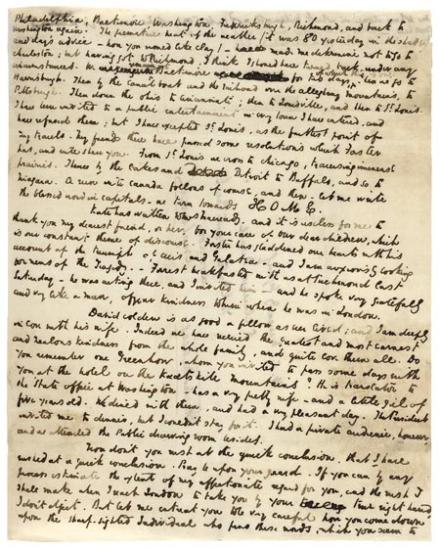
Autograph letter signed, Baltimore, 22 March 1842, to William Charles Macready
Acquired by Pierpont Morgan before 1913
The same day Dickens wrote to Angela Burdett-Coutts, he penned a more reflective, candid letter to Macready, expressing his overall impressions of the United States: "The people are affectionate, generous, open-hearted, hospitable, enthusiastic, good humoured, polite to women, frank and cordial to all strangers; anxious to oblige; far less prejudiced than they have been described to be; frequently polished and refined, very seldom rude or disagreeable." Nevertheless, Dickens concluded: "I am disappointed. This is not the Republic I came to see. This is not the Republic of my imagination. In every respect but that of National Education, the Country disappoints me. ... And England, even England, bad and faulty as the old land is, and miserable as millions of her people are, rises in the comparison."
America
Dickens visited the United States twice, first traveling extensively with his wife from 22 January to 7 June 1842. Twenty-five years later—from 19 November 1867 to 22 April 1868—he returned alone for an exhausting reading tour.
Prior to his first visit, he had "dreamed by day and night, for years, of setting foot upon this shore, and breathing this pure air." He received an unprecedented enthusiastic and extravagant welcome, as befitted the world's first literary superstar. But he soon grew tired of the intrusion resulting from his lionization. After making several vehement speeches in favor of an international copyright agreement that would protect his work from piracy in the United States, he was deeply hurt by the vitriolic response of the American press. His bitter disappointment is recorded in American Notes for General Circulation and his novel Martin Chuzzlewit (1843–44).
When Dickens returned in 1867, his fame, and the adulation it inspired, had intensified. In seventy-six public readings, he performed for more than one hundred thousand people and earned $95,000, equivalent to approximately $1.5 million in today's money.
Philadelphia, Baltimore, Washington, Fredericksburgh, Richmond, and back to Washington again. The premature heat of the weather (it was 80 yesterday in the shade) and Clay's advice—how you would like Clay!—made me determine not to go to Charleston; but having got to Richmond, I think I should have turned back, under any circumstances. We remain at Baltimore for two days, of which this is one. Then we go to Harrisburgh. Then by the Canal boat and the Railroad over the Alleghany Mountains, to Pittsburgh. Then down the Ohio to Cincinnati; then to Louisville, and then to St. Louis. I have been invited to a public entertainment in every town I have entered, and have refused them; but I have excepted St. Louis, as the farthest point of my travels. My friends there have passed some resolutions which Forster has, and will shew you. From St. Louis we cross to Chicago, traversing immense prairies. Thence by the lakes and Detroit to Buffalo, and so to Niagara. A run into Canada follows of course, and then—let me write the blessed word in capitals—we turn towards HOME.
Kate has written to Mrs. Macready, and it is useless for me to thank you my dearest friend, or her, for your care of our dear children, which is our constant theme of discourse. Forster has gladdened our hearts with his account of the triumph of Acis and Galatea, —and I am anxiously looking for news of the Tragedy.—Forrest breakfasted with us at Richmond last Saturday—he was acting there, and I invited him—and he spoke very gratefully and very like a man, of your kindness to him when he was in London.
David Colden is as good a fellow as ever lived; and I am deeply in love with his wife. Indeed we have received the greatest and most earnest and zealous kindness from the whole family, and quite love them all. Do you remember one Greenhow, whom you invited to pass some days with you at the hotel on the Kaatskill Mountains? He is translator to the State Office at Washington— has a very pretty wife—and a little girl of five years old. We dined with them, and had a very pleasant day. The President invited me to dinner, but I couldn't stay for it. I had a private audience, however, and we attended the Public drawing room besides.
Now don't you rush at the quick conclusion, that I have rushed at a quick conclusion. Pray be upon your guard. If you can by any process estimate the extent of my affectionate regard for you, and the rush I shall make when I reach London to take you by your true right hand, I don't object. But let me entreat you to be very careful how you come down upon the sharp-sighted Individual who pens these words, which you seem to
Letter 9 | 22 March 1842 | to William Charles Macready, page 4

Autograph letter signed, Baltimore, 22 March 1842, to William Charles Macready
Acquired by Pierpont Morgan before 1913
The same day Dickens wrote to Angela Burdett-Coutts, he penned a more reflective, candid letter to Macready, expressing his overall impressions of the United States: "The people are affectionate, generous, open-hearted, hospitable, enthusiastic, good humoured, polite to women, frank and cordial to all strangers; anxious to oblige; far less prejudiced than they have been described to be; frequently polished and refined, very seldom rude or disagreeable." Nevertheless, Dickens concluded: "I am disappointed. This is not the Republic I came to see. This is not the Republic of my imagination. In every respect but that of National Education, the Country disappoints me. ... And England, even England, bad and faulty as the old land is, and miserable as millions of her people are, rises in the comparison."
America
Dickens visited the United States twice, first traveling extensively with his wife from 22 January to 7 June 1842. Twenty-five years later—from 19 November 1867 to 22 April 1868—he returned alone for an exhausting reading tour.
Prior to his first visit, he had "dreamed by day and night, for years, of setting foot upon this shore, and breathing this pure air." He received an unprecedented enthusiastic and extravagant welcome, as befitted the world's first literary superstar. But he soon grew tired of the intrusion resulting from his lionization. After making several vehement speeches in favor of an international copyright agreement that would protect his work from piracy in the United States, he was deeply hurt by the vitriolic response of the American press. His bitter disappointment is recorded in American Notes for General Circulation and his novel Martin Chuzzlewit (1843–44).
When Dickens returned in 1867, his fame, and the adulation it inspired, had intensified. In seventy-six public readings, he performed for more than one hundred thousand people and earned $95,000, equivalent to approximately $1.5 million in today's money.
me to have done in what Willmott wod. call "one of Mr. Macready's rushes"—As my pen is getting past its work I have taken a new one to say, that I am ever, My Dear Macready your faithful friend. CD.
Letter 10 | 26 August 1848 | to William Charles Macready, page 1

Autograph letter signed with initials, Broadstairs, Kent, 26 August 1848 to William Charles Macready
Acquired by Pierpont Morgan before 1913
Dickens wrote this letter to Macready as the actor prepared to embark on his final acting tour of the United States. Dickens used the occasion to "nail [his] Colors to the Mast" and tell Macready: "There is not a throat in Britain, where its lies and glozings and shortcomings, stick more intolerably than in mine. And, as a general principle, I have no such thing as patriotism about me. But my sentiment is:—Success to the United States as a golden campaigning ground, but blow the United States to 'tarnal smash [eternal ruin], as an Englishman's place of residence." In May 1849, at the Astor Place Theatre, New York, a dispute between rival supporters of Macready and Edwin Forrest, the leading American Shakespearean actor, led to a riot that resulted in twenty-three fatalities.
America
Dickens visited the United States twice, first traveling extensively with his wife from 22 January to 7 June 1842. Twenty-five years later—from 19 November 1867 to 22 April 1868—he returned alone for an exhausting reading tour.
Prior to his first visit, he had "dreamed by day and night, for years, of setting foot upon this shore, and breathing this pure air." He received an unprecedented enthusiastic and extravagant welcome, as befitted the world's first literary superstar. But he soon grew tired of the intrusion resulting from his lionization. After making several vehement speeches in favor of an international copyright agreement that would protect his work from piracy in the United States, he was deeply hurt by the vitriolic response of the American press. His bitter disappointment is recorded in American Notes for General Circulation and his novel Martin Chuzzlewit (1843–44).
When Dickens returned in 1867, his fame, and the adulation it inspired, had intensified. In seventy-six public readings, he performed for more than one hundred thousand people and earned $95,000, equivalent to approximately $1.5 million in today's money.
My Dear Macready.
I was about to write to you when I received your welcome letter.
You know I would come from a somewhat longer distance than this, to give you a hearty God speed and farewell on the eve of your journey. What do you say to Monday the fourth? Or Saturday the
Letter 10 | 26 August 1848 | to William Charles Macready, page 2
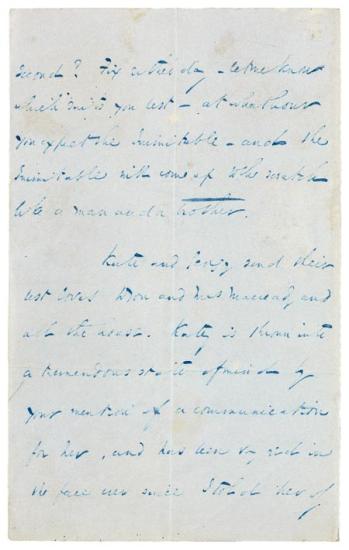
Autograph letter signed with initials, Broadstairs, Kent, 26 August 1848 to William Charles Macready
Acquired by Pierpont Morgan before 1913
Dickens wrote this letter to Macready as the actor prepared to embark on his final acting tour of the United States. Dickens used the occasion to "nail [his] Colors to the Mast" and tell Macready: "There is not a throat in Britain, where its lies and glozings and shortcomings, stick more intolerably than in mine. And, as a general principle, I have no such thing as patriotism about me. But my sentiment is:—Success to the United States as a golden campaigning ground, but blow the United States to 'tarnal smash [eternal ruin], as an Englishman's place of residence." In May 1849, at the Astor Place Theatre, New York, a dispute between rival supporters of Macready and Edwin Forrest, the leading American Shakespearean actor, led to a riot that resulted in twenty-three fatalities.
America
Dickens visited the United States twice, first traveling extensively with his wife from 22 January to 7 June 1842. Twenty-five years later—from 19 November 1867 to 22 April 1868—he returned alone for an exhausting reading tour.
Prior to his first visit, he had "dreamed by day and night, for years, of setting foot upon this shore, and breathing this pure air." He received an unprecedented enthusiastic and extravagant welcome, as befitted the world's first literary superstar. But he soon grew tired of the intrusion resulting from his lionization. After making several vehement speeches in favor of an international copyright agreement that would protect his work from piracy in the United States, he was deeply hurt by the vitriolic response of the American press. His bitter disappointment is recorded in American Notes for General Circulation and his novel Martin Chuzzlewit (1843–44).
When Dickens returned in 1867, his fame, and the adulation it inspired, had intensified. In seventy-six public readings, he performed for more than one hundred thousand people and earned $95,000, equivalent to approximately $1.5 million in today's money.
Second? Fix either day—let me know which suits you best—at what hour you expect the Inimitable—and the Inimitable will come up to the scratch like a man and a brother.
Kate and Georgy send their best loves to you and Mrs. Macready and all the house. Katey is thrown into a tremendous state of mind by your mention of a communication for her, and has been very red in the face ever since I told her of
Letter 10 | 26 August 1848 | to William Charles Macready, page 3
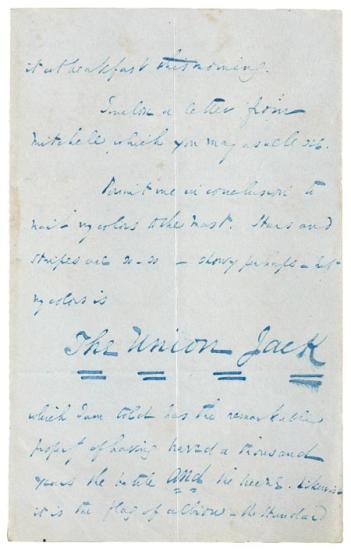
Autograph letter signed with initials, Broadstairs, Kent, 26 August 1848 to William Charles Macready
Acquired by Pierpont Morgan before 1913
Dickens wrote this letter to Macready as the actor prepared to embark on his final acting tour of the United States. Dickens used the occasion to "nail [his] Colors to the Mast" and tell Macready: "There is not a throat in Britain, where its lies and glozings and shortcomings, stick more intolerably than in mine. And, as a general principle, I have no such thing as patriotism about me. But my sentiment is:—Success to the United States as a golden campaigning ground, but blow the United States to 'tarnal smash [eternal ruin], as an Englishman's place of residence." In May 1849, at the Astor Place Theatre, New York, a dispute between rival supporters of Macready and Edwin Forrest, the leading American Shakespearean actor, led to a riot that resulted in twenty-three fatalities.
America
Dickens visited the United States twice, first traveling extensively with his wife from 22 January to 7 June 1842. Twenty-five years later—from 19 November 1867 to 22 April 1868—he returned alone for an exhausting reading tour.
Prior to his first visit, he had "dreamed by day and night, for years, of setting foot upon this shore, and breathing this pure air." He received an unprecedented enthusiastic and extravagant welcome, as befitted the world's first literary superstar. But he soon grew tired of the intrusion resulting from his lionization. After making several vehement speeches in favor of an international copyright agreement that would protect his work from piracy in the United States, he was deeply hurt by the vitriolic response of the American press. His bitter disappointment is recorded in American Notes for General Circulation and his novel Martin Chuzzlewit (1843–44).
When Dickens returned in 1867, his fame, and the adulation it inspired, had intensified. In seventy-six public readings, he performed for more than one hundred thousand people and earned $95,000, equivalent to approximately $1.5 million in today's money.
it at breakfast this morning.
I enclose a letter from Mitchell, which you may as well see.
Permit me in conclusion to nail my Colors to the Mast. Stars and Stripes are so-so—showy perhaps—but my colors is
THE UNION JACK
which I am told has the remarkable property of having braved a thousand years the battle AND the breeze. Likewise it is the flag of Albion—the Standard
Letter 10 | 26 August 1848 | to William Charles Macready, page 4

Autograph letter signed with initials, Broadstairs, Kent, 26 August 1848 to William Charles Macready
Acquired by Pierpont Morgan before 1913
Dickens wrote this letter to Macready as the actor prepared to embark on his final acting tour of the United States. Dickens used the occasion to "nail [his] Colors to the Mast" and tell Macready: "There is not a throat in Britain, where its lies and glozings and shortcomings, stick more intolerably than in mine. And, as a general principle, I have no such thing as patriotism about me. But my sentiment is:—Success to the United States as a golden campaigning ground, but blow the United States to 'tarnal smash [eternal ruin], as an Englishman's place of residence." In May 1849, at the Astor Place Theatre, New York, a dispute between rival supporters of Macready and Edwin Forrest, the leading American Shakespearean actor, led to a riot that resulted in twenty-three fatalities.
America
Dickens visited the United States twice, first traveling extensively with his wife from 22 January to 7 June 1842. Twenty-five years later—from 19 November 1867 to 22 April 1868—he returned alone for an exhausting reading tour.
Prior to his first visit, he had "dreamed by day and night, for years, of setting foot upon this shore, and breathing this pure air." He received an unprecedented enthusiastic and extravagant welcome, as befitted the world's first literary superstar. But he soon grew tired of the intrusion resulting from his lionization. After making several vehement speeches in favor of an international copyright agreement that would protect his work from piracy in the United States, he was deeply hurt by the vitriolic response of the American press. His bitter disappointment is recorded in American Notes for General Circulation and his novel Martin Chuzzlewit (1843–44).
When Dickens returned in 1867, his fame, and the adulation it inspired, had intensified. In seventy-six public readings, he performed for more than one hundred thousand people and earned $95,000, equivalent to approximately $1.5 million in today's money.
of Britain—and Britons, as I am informed, never never never—will—be—Slaves!
There is not a throat in Britain, where its lies and glozings and shortcomings, stick more intolerably than in mine. And, as a general principle, I have no such thing as patriotism about me. But my sentiment is:—Success to the United States as a golden campaigning ground, but blow the United States to 'tarnal smash, as an Englishman's place of residence. Gentlemen, air you all charged?—
Affectionately Ever
CD.
Letter 11 | 30 May 1849 | to Mrs. Christina Ann Macready, page 1

Autograph letter signed, London, [30 May 1849], to Mrs. Christina Ann Macready
Purchased by Pierpont Morgan before 1913
When Dickens received news of the Astor Place riot and the disastrous end of William Macready's tour, he immediately wrote to the actor's wife to vent his "feelings anent the New Yorkers." Astounded, he tells her that "I know perfectly well that many things may take place in the first City of the United States which could not possibly occur in a remote nook of any other country in the World,—but the bestiality of this business . . . I regard as a positive calamity to the rational freedom of men." He reassures Mrs. Macready that to her husband the riot "signifies nothing, except that it takes him out of that damnable jumble (you'll excuse me) of false pretensions and humbugs, a week or so sooner."
America
Dickens visited the United States twice, first traveling extensively with his wife from 22 January to 7 June 1842. Twenty-five years later—from 19 November 1867 to 22 April 1868—he returned alone for an exhausting reading tour.
Prior to his first visit, he had "dreamed by day and night, for years, of setting foot upon this shore, and breathing this pure air." He received an unprecedented enthusiastic and extravagant welcome, as befitted the world's first literary superstar. But he soon grew tired of the intrusion resulting from his lionization. After making several vehement speeches in favor of an international copyright agreement that would protect his work from piracy in the United States, he was deeply hurt by the vitriolic response of the American press. His bitter disappointment is recorded in American Notes for General Circulation and his novel Martin Chuzzlewit (1843–44).
When Dickens returned in 1867, his fame, and the adulation it inspired, had intensified. In seventy-six public readings, he performed for more than one hundred thousand people and earned $95,000, equivalent to approximately $1.5 million in today's money.
My Dear Mrs. Macready.
When I came home to dinner yesterday afternoon, I found an American Paper from Macready. In the first transports of my unbounded indignation, I was coming up to you; but I thought, on cooler reflection, that there was no reason why I should worry you in the joyful prospect of his immediate return, with my feelings anent the New Yorkers.
But this I must say.—That the scene astounds even me. I know
Letter 11 | 30 May 1849 | to Mrs. Christina Ann Macready, page 2

Autograph letter signed, London, [30 May 1849], to Mrs. Christina Ann Macready
Purchased by Pierpont Morgan before 1913
When Dickens received news of the Astor Place riot and the disastrous end of William Macready's tour, he immediately wrote to the actor's wife to vent his "feelings anent the New Yorkers." Astounded, he tells her that "I know perfectly well that many things may take place in the first City of the United States which could not possibly occur in a remote nook of any other country in the World,—but the bestiality of this business . . . I regard as a positive calamity to the rational freedom of men." He reassures Mrs. Macready that to her husband the riot "signifies nothing, except that it takes him out of that damnable jumble (you'll excuse me) of false pretensions and humbugs, a week or so sooner."
America
Dickens visited the United States twice, first traveling extensively with his wife from 22 January to 7 June 1842. Twenty-five years later—from 19 November 1867 to 22 April 1868—he returned alone for an exhausting reading tour.
Prior to his first visit, he had "dreamed by day and night, for years, of setting foot upon this shore, and breathing this pure air." He received an unprecedented enthusiastic and extravagant welcome, as befitted the world's first literary superstar. But he soon grew tired of the intrusion resulting from his lionization. After making several vehement speeches in favor of an international copyright agreement that would protect his work from piracy in the United States, he was deeply hurt by the vitriolic response of the American press. His bitter disappointment is recorded in American Notes for General Circulation and his novel Martin Chuzzlewit (1843–44).
When Dickens returned in 1867, his fame, and the adulation it inspired, had intensified. In seventy-six public readings, he performed for more than one hundred thousand people and earned $95,000, equivalent to approximately $1.5 million in today's money.
perfectly well that many things may take place in the first City of the United States which could not possibly occur in a remote nook of any other country in the World,—but the bestiality of this business, and the incredible business of that public opinion to which Mr. Clarke (whoever he is) deferred when he apologized for his engagement, I regard as a positive calamity to the rational freedom of men.
To Macready it signifies nothing,
Letter 11 | 30 May 1849 | to Mrs. Christina Ann Macready, page 3
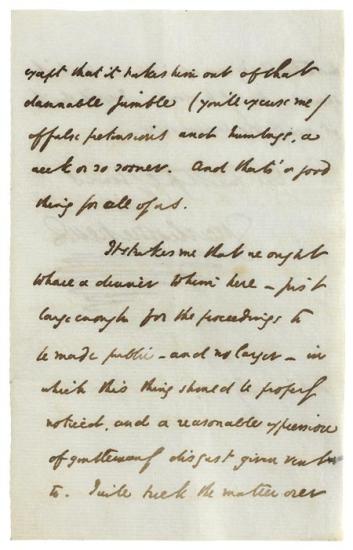
Autograph letter signed, London, [30 May 1849], to Mrs. Christina Ann Macready
Purchased by Pierpont Morgan before 1913
When Dickens received news of the Astor Place riot and the disastrous end of William Macready's tour, he immediately wrote to the actor's wife to vent his "feelings anent the New Yorkers." Astounded, he tells her that "I know perfectly well that many things may take place in the first City of the United States which could not possibly occur in a remote nook of any other country in the World,—but the bestiality of this business . . . I regard as a positive calamity to the rational freedom of men." He reassures Mrs. Macready that to her husband the riot "signifies nothing, except that it takes him out of that damnable jumble (you'll excuse me) of false pretensions and humbugs, a week or so sooner."
America
Dickens visited the United States twice, first traveling extensively with his wife from 22 January to 7 June 1842. Twenty-five years later—from 19 November 1867 to 22 April 1868—he returned alone for an exhausting reading tour.
Prior to his first visit, he had "dreamed by day and night, for years, of setting foot upon this shore, and breathing this pure air." He received an unprecedented enthusiastic and extravagant welcome, as befitted the world's first literary superstar. But he soon grew tired of the intrusion resulting from his lionization. After making several vehement speeches in favor of an international copyright agreement that would protect his work from piracy in the United States, he was deeply hurt by the vitriolic response of the American press. His bitter disappointment is recorded in American Notes for General Circulation and his novel Martin Chuzzlewit (1843–44).
When Dickens returned in 1867, his fame, and the adulation it inspired, had intensified. In seventy-six public readings, he performed for more than one hundred thousand people and earned $95,000, equivalent to approximately $1.5 million in today's money.
except that it takes him out of that damnable jumble (you'll excuse me) of false pretensions and humbugs, a week or so sooner. And that's a good thing for all of us.
It strikes me that we ought to have a dinner to him here—just large enough for the proceedings to be made public—and no larger—in which this thing should be properly noticed, and a reasonable expression of gentlemanly disgust given vent to. I will talk the matter over
Letter 11 | 30 May 1849 | to Mrs. Christina Ann Macready, page 4
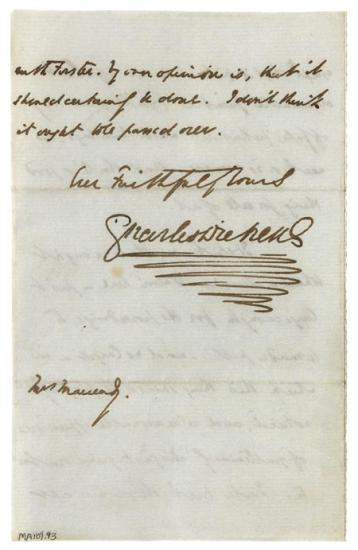
Autograph letter signed, London, [30 May 1849], to Mrs. Christina Ann Macready
Purchased by Pierpont Morgan before 1913
When Dickens received news of the Astor Place riot and the disastrous end of William Macready's tour, he immediately wrote to the actor's wife to vent his "feelings anent the New Yorkers." Astounded, he tells her that "I know perfectly well that many things may take place in the first City of the United States which could not possibly occur in a remote nook of any other country in the World,—but the bestiality of this business . . . I regard as a positive calamity to the rational freedom of men." He reassures Mrs. Macready that to her husband the riot "signifies nothing, except that it takes him out of that damnable jumble (you'll excuse me) of false pretensions and humbugs, a week or so sooner."
America
Dickens visited the United States twice, first traveling extensively with his wife from 22 January to 7 June 1842. Twenty-five years later—from 19 November 1867 to 22 April 1868—he returned alone for an exhausting reading tour.
Prior to his first visit, he had "dreamed by day and night, for years, of setting foot upon this shore, and breathing this pure air." He received an unprecedented enthusiastic and extravagant welcome, as befitted the world's first literary superstar. But he soon grew tired of the intrusion resulting from his lionization. After making several vehement speeches in favor of an international copyright agreement that would protect his work from piracy in the United States, he was deeply hurt by the vitriolic response of the American press. His bitter disappointment is recorded in American Notes for General Circulation and his novel Martin Chuzzlewit (1843–44).
When Dickens returned in 1867, his fame, and the adulation it inspired, had intensified. In seventy-six public readings, he performed for more than one hundred thousand people and earned $95,000, equivalent to approximately $1.5 million in today's money.
ith Forster. My own opinion is, that it should certainly be done. I don't think it ought to be passed over.
Ever Faithfully Yours
CHARLES DICKENS
Letter 12 | 31 January 1868 | to Wilkie Collins, page 1
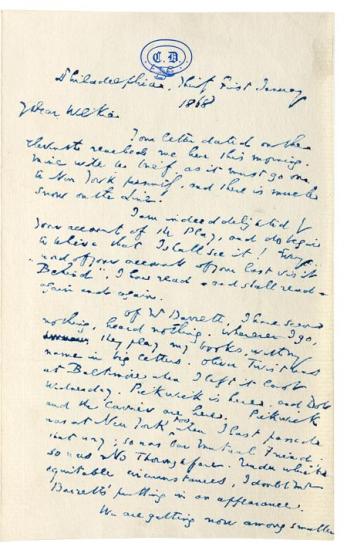
Autograph letter signed, Philadelphia, 31 January 1868, to Wilkie Collins
Acquired by Pierpont Morgan before 1913
The letters Dickens wrote during his 1867–68 reading tour of the United States were altogether more positive in tone than those of 1842. He wrote to Collins with evident satisfaction about the myriad stage adaptations of his fiction: "Wherever I go, they play [perform] my books, with my name in big letters. Oliver Twist was at Baltimore when I left it last Wednesday. Pickwick is here, and Bob [Mr. Bob Sawyer's Party] and the Carrier [The Cricket on the Hearth] are here. Pickwick was at New York too, when I last passed that way; so was Our Mutual Friend." The audiences for his readings were "immense," and, he proudly reported, his reading "here last night (for the first time) bowled Philadelphia clean over."
America
Dickens visited the United States twice, first traveling extensively with his wife from 22 January to 7 June 1842. Twenty-five years later—from 19 November 1867 to 22 April 1868—he returned alone for an exhausting reading tour.
Prior to his first visit, he had "dreamed by day and night, for years, of setting foot upon this shore, and breathing this pure air." He received an unprecedented enthusiastic and extravagant welcome, as befitted the world's first literary superstar. But he soon grew tired of the intrusion resulting from his lionization. After making several vehement speeches in favor of an international copyright agreement that would protect his work from piracy in the United States, he was deeply hurt by the vitriolic response of the American press. His bitter disappointment is recorded in American Notes for General Circulation and his novel Martin Chuzzlewit (1843–44).
When Dickens returned in 1867, his fame, and the adulation it inspired, had intensified. In seventy-six public readings, he performed for more than one hundred thousand people and earned $95,000, equivalent to approximately $1.5 million in today's money.
My Dear Wilkie
Your letter dated on the eleventh reached me here this morning. Mine will be brief, as it must go on to New York presently, and there is much snow on the Line.
I am indeed delighted by your account of the Play, and do begin to believe that I shall see it! Every word of your account of your last visit "Behind", I have read—and shall read—again and again.
Of Mr. Barrett, I have seen nothing, heard nothing. Wherever I go, they play my books, with my name in big letters. Oliver Twist was at Baltimore when I left it last Wednesday. Pickwick is here, and Bob and the Carrier are here. Pickwick was at New York too, when I last passed that way; so was Our Mutual Friend; so was No Thoroughfare. Under which equitable circumstances, I doubt Mr. Barrett's putting in an appearance.
We are getting now among smaller
Letter 12 | 31 January 1868 | to Wilkie Collins, page 2
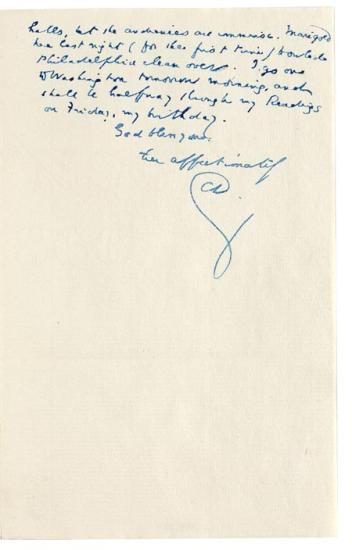
Autograph letter signed, Philadelphia, 31 January 1868, to Wilkie Collins
Acquired by Pierpont Morgan before 1913
The letters Dickens wrote during his 1867–68 reading tour of the United States were altogether more positive in tone than those of 1842. He wrote to Collins with evident satisfaction about the myriad stage adaptations of his fiction: "Wherever I go, they play [perform] my books, with my name in big letters. Oliver Twist was at Baltimore when I left it last Wednesday. Pickwick is here, and Bob [Mr. Bob Sawyer's Party] and the Carrier [The Cricket on the Hearth] are here. Pickwick was at New York too, when I last passed that way; so was Our Mutual Friend." The audiences for his readings were "immense," and, he proudly reported, his reading "here last night (for the first time) bowled Philadelphia clean over."
America
Dickens visited the United States twice, first traveling extensively with his wife from 22 January to 7 June 1842. Twenty-five years later—from 19 November 1867 to 22 April 1868—he returned alone for an exhausting reading tour.
Prior to his first visit, he had "dreamed by day and night, for years, of setting foot upon this shore, and breathing this pure air." He received an unprecedented enthusiastic and extravagant welcome, as befitted the world's first literary superstar. But he soon grew tired of the intrusion resulting from his lionization. After making several vehement speeches in favor of an international copyright agreement that would protect his work from piracy in the United States, he was deeply hurt by the vitriolic response of the American press. His bitter disappointment is recorded in American Notes for General Circulation and his novel Martin Chuzzlewit (1843–44).
When Dickens returned in 1867, his fame, and the adulation it inspired, had intensified. In seventy-six public readings, he performed for more than one hundred thousand people and earned $95,000, equivalent to approximately $1.5 million in today's money.
halls, but the audiences are immense. Marigold here last night (for the first time) bowled Philadelphia clean over. I go on to Washington tomorrow morning, and shall be halfway through my Readings on Friday, my birthday.
God bless you. | Ever affectionately
CD.
Letter 13 | 31 January 1845 | to Emile de la Rue, page 1
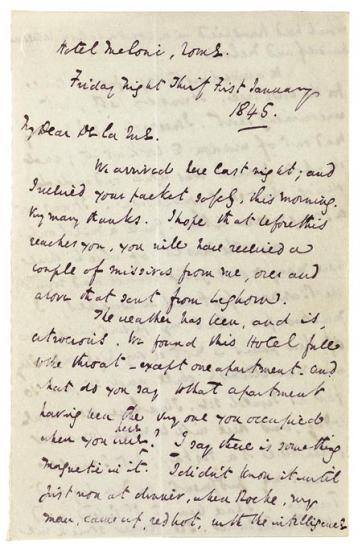
Autograph letter signed, Rome, 31 January 1845, to Emile de la Rue
Purchased in 1968
Shortly after his arrival in the United States in January 1842, Dickens told Dr. R. H. Collyer that, "with regard to my opinion on the subject of Mesmerism... I am a believer [but] I became so against all my preconceived opinions and impressions."
While in America, Dickens carried out his first mesmeric experiment on his wife, recalling that he "magnetized [hypnotized] her into hysterics, and then into the magnetic sleep." But his first significant efforts began in Genoa in December 1844, with his mesmeric treatment of Madame Augusta de la Rue. In this letter Dickens informed the husband of Madame de la Rue that she was "now in a state most favorable and advantageous to the best influence The Mesmerism could possibly exert upon her."
Mesmerism
In his life and art, Dickens worked energetically for healing. His fiction exposed many of the social ills of his day, and a significant portion of his later journalism is devoted to an impassioned campaign to improve sanitation and public health. Although he was a committed evolutionist and progressive in his attitude toward science and the improvements wrought by technological advances, he was also, by imagination and temperament, attracted to the fantastic and pseudoscientific. This was manifested in his interest in spontaneous combustion and phrenology as well as his fervent belief and active experiments in mesmerism (or "animal magnetism"), an early type of hypnotism.
Dickens was introduced to mesmerism through Dr. John Elliotson, his family physician and one of his "most intimate and valued friends." He became convinced of the therapeutic effects of mesmerism after witnessing Elliotson's demonstrations in 1838, and, although there is no record of Dickens undergoing the procedure, he learned to mesmerize others. Throughout the 1840s, he conducted mesmeric experiments on his wife and friends.
My Dear De la Rue.
We arrived here last night; and I received your packet safely, this morning. Very many thanks. I hope that before this reaches you, you will have received a couple of missives from me, over and above that sent from Leghorn.
The weather has been, and is, atrocious. We found this Hotel full to the throat —except one apartment. And what do you say to that apartment having been the very one you occupied when you were here? I say there is something Magnetic in it. I didn't know it until just now at dinner, when Roche, my man, came up, red hot, with the intelligence
Letter 13 | 31 January 1845 | to Emile de la Rue, page 2
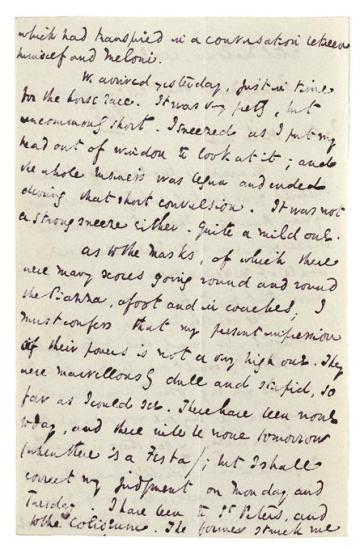
Autograph letter signed, Rome, 31 January 1845, to Emile de la Rue
Purchased in 1968
Shortly after his arrival in the United States in January 1842, Dickens told Dr. R. H. Collyer that, "with regard to my opinion on the subject of Mesmerism... I am a believer [but] I became so against all my preconceived opinions and impressions."
While in America, Dickens carried out his first mesmeric experiment on his wife, recalling that he "magnetized [hypnotized] her into hysterics, and then into the magnetic sleep." But his first significant efforts began in Genoa in December 1844, with his mesmeric treatment of Madame Augusta de la Rue. In this letter Dickens informed the husband of Madame de la Rue that she was "now in a state most favorable and advantageous to the best influence The Mesmerism could possibly exert upon her."
Mesmerism
In his life and art, Dickens worked energetically for healing. His fiction exposed many of the social ills of his day, and a significant portion of his later journalism is devoted to an impassioned campaign to improve sanitation and public health. Although he was a committed evolutionist and progressive in his attitude toward science and the improvements wrought by technological advances, he was also, by imagination and temperament, attracted to the fantastic and pseudoscientific. This was manifested in his interest in spontaneous combustion and phrenology as well as his fervent belief and active experiments in mesmerism (or "animal magnetism"), an early type of hypnotism.
Dickens was introduced to mesmerism through Dr. John Elliotson, his family physician and one of his "most intimate and valued friends." He became convinced of the therapeutic effects of mesmerism after witnessing Elliotson's demonstrations in 1838, and, although there is no record of Dickens undergoing the procedure, he learned to mesmerize others. Throughout the 1840s, he conducted mesmeric experiments on his wife and friends.
which had transpired in a conversation between himself and Meloni.
We arrived yesterday, just in time for the horse Race. It was very pretty, but uncommonly short. I sneezed as I put my head out of window to look at it; and the whole business was begun and ended during that short convulsion. It was not a strong sneeze either. Quite a mild one.
As to the Masks, of which there were many scores going round and round the Piazza, afoot and in coaches; I must confess that my present impression of their powers is not a very high one. They were marvellously dull and stupid, so far as I could see. There have been none today, and there will be none tomorrow (when there is a Festa); but I shall correct my judgment on Monday and Tuesday. I have been to St. Peters, and to the Coliseum. The former struck me
Letter 13 | 31 January 1845 | to Emile de la Rue, page 3

Autograph letter signed, Rome, 31 January 1845, to Emile de la Rue
Purchased in 1968
Shortly after his arrival in the United States in January 1842, Dickens told Dr. R. H. Collyer that, "with regard to my opinion on the subject of Mesmerism... I am a believer [but] I became so against all my preconceived opinions and impressions."
While in America, Dickens carried out his first mesmeric experiment on his wife, recalling that he "magnetized [hypnotized] her into hysterics, and then into the magnetic sleep." But his first significant efforts began in Genoa in December 1844, with his mesmeric treatment of Madame Augusta de la Rue. In this letter Dickens informed the husband of Madame de la Rue that she was "now in a state most favorable and advantageous to the best influence The Mesmerism could possibly exert upon her."
Mesmerism
In his life and art, Dickens worked energetically for healing. His fiction exposed many of the social ills of his day, and a significant portion of his later journalism is devoted to an impassioned campaign to improve sanitation and public health. Although he was a committed evolutionist and progressive in his attitude toward science and the improvements wrought by technological advances, he was also, by imagination and temperament, attracted to the fantastic and pseudoscientific. This was manifested in his interest in spontaneous combustion and phrenology as well as his fervent belief and active experiments in mesmerism (or "animal magnetism"), an early type of hypnotism.
Dickens was introduced to mesmerism through Dr. John Elliotson, his family physician and one of his "most intimate and valued friends." He became convinced of the therapeutic effects of mesmerism after witnessing Elliotson's demonstrations in 1838, and, although there is no record of Dickens undergoing the procedure, he learned to mesmerize others. Throughout the 1840s, he conducted mesmeric experiments on his wife and friends.
immensely. But the latter is the great sensation. And I never can forget it.
It is lucky for you that I am going to write forthwith to Madame De la Rue—that I may enclose the note in this—or I would have come down upon you with a blaze of description and fancy, worthy of old Di Negro, when he screws his right hand round, and looks out at the corners of those sly old leering Peepers of his, after the manner of the inspired Improvisatori. Heaven send you may never find me in that humour, with opportunity added to it! For I am much longer about it than a Carnival Horse—and am infinitely slower in my pace, I fear.
I don't know the Writings you ask me about. Not at all. I have a kind of sense that I ought to know
Letter 13 | 31 January 1845 | to Emile de la Rue, page 4
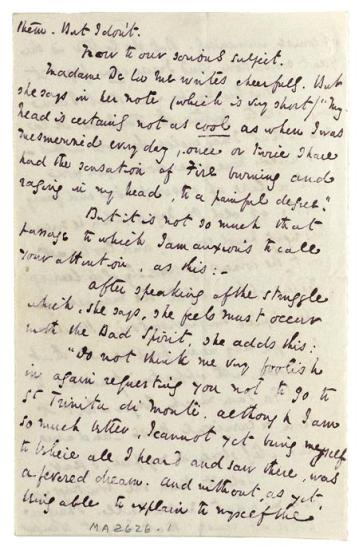
Autograph letter signed, Rome, 31 January 1845, to Emile de la Rue
Purchased in 1968
Shortly after his arrival in the United States in January 1842, Dickens told Dr. R. H. Collyer that, "with regard to my opinion on the subject of Mesmerism... I am a believer [but] I became so against all my preconceived opinions and impressions."
While in America, Dickens carried out his first mesmeric experiment on his wife, recalling that he "magnetized [hypnotized] her into hysterics, and then into the magnetic sleep." But his first significant efforts began in Genoa in December 1844, with his mesmeric treatment of Madame Augusta de la Rue. In this letter Dickens informed the husband of Madame de la Rue that she was "now in a state most favorable and advantageous to the best influence The Mesmerism could possibly exert upon her."
Mesmerism
In his life and art, Dickens worked energetically for healing. His fiction exposed many of the social ills of his day, and a significant portion of his later journalism is devoted to an impassioned campaign to improve sanitation and public health. Although he was a committed evolutionist and progressive in his attitude toward science and the improvements wrought by technological advances, he was also, by imagination and temperament, attracted to the fantastic and pseudoscientific. This was manifested in his interest in spontaneous combustion and phrenology as well as his fervent belief and active experiments in mesmerism (or "animal magnetism"), an early type of hypnotism.
Dickens was introduced to mesmerism through Dr. John Elliotson, his family physician and one of his "most intimate and valued friends." He became convinced of the therapeutic effects of mesmerism after witnessing Elliotson's demonstrations in 1838, and, although there is no record of Dickens undergoing the procedure, he learned to mesmerize others. Throughout the 1840s, he conducted mesmeric experiments on his wife and friends.
them. But I don't.
Now to our serious subject.
Madame De la Rue writes cheerfully. But she says in her note (which is very short) "My head is certainly not as cool as when I was mesmerized every day,—once or twice I have had the sensation of Fire burning and raging in my head, to a painful degree."
But it is not so much that passage to which I am anxious to call your attention, as this:—
After speaking of the struggle which, she says, she feels must occur with the Bad Spirit, she adds this:
"Do not think me very foolish in again requesting you not to go to St. Trinita di Monti. Although I am so much better, I cannot yet bring myself to believe all I heard and saw there, was a fevered dream. And without, as yet, being able to explain to myself the
Letter 13 | 31 January 1845 | to Emile de la Rue, page 5

Autograph letter signed, Rome, 31 January 1845, to Emile de la Rue
Purchased in 1968
Shortly after his arrival in the United States in January 1842, Dickens told Dr. R. H. Collyer that, "with regard to my opinion on the subject of Mesmerism... I am a believer [but] I became so against all my preconceived opinions and impressions."
While in America, Dickens carried out his first mesmeric experiment on his wife, recalling that he "magnetized [hypnotized] her into hysterics, and then into the magnetic sleep." But his first significant efforts began in Genoa in December 1844, with his mesmeric treatment of Madame Augusta de la Rue. In this letter Dickens informed the husband of Madame de la Rue that she was "now in a state most favorable and advantageous to the best influence The Mesmerism could possibly exert upon her."
Mesmerism
In his life and art, Dickens worked energetically for healing. His fiction exposed many of the social ills of his day, and a significant portion of his later journalism is devoted to an impassioned campaign to improve sanitation and public health. Although he was a committed evolutionist and progressive in his attitude toward science and the improvements wrought by technological advances, he was also, by imagination and temperament, attracted to the fantastic and pseudoscientific. This was manifested in his interest in spontaneous combustion and phrenology as well as his fervent belief and active experiments in mesmerism (or "animal magnetism"), an early type of hypnotism.
Dickens was introduced to mesmerism through Dr. John Elliotson, his family physician and one of his "most intimate and valued friends." He became convinced of the therapeutic effects of mesmerism after witnessing Elliotson's demonstrations in 1838, and, although there is no record of Dickens undergoing the procedure, he learned to mesmerize others. Throughout the 1840s, he conducted mesmeric experiments on his wife and friends.
reason, I dread your going there, without me. I trust I shall soon be able to tell you what has left so fearful an impression, but as yet I find it impossible. Heaven preserve me from passing another such day and night as I did then!"
I extract this, to shew you that I did not lay great stress on this creature, in my last, without strong reason. There can be no doubt that her position in reference to it is a very critical one; and that she is now in a state most favorable and advantageous to the best influence The Mesmerism could possibly exert upon her.
Therefore I am more than ever anxious for your news from Geneva. I shall not fail, in writing to her tonight, to urge her again, to have no secret whatever from me, in connexion with this Fancy; and I shall try to shew her how unwise it is,
Letter 13 | 31 January 1845 | to Emile de la Rue, page 6
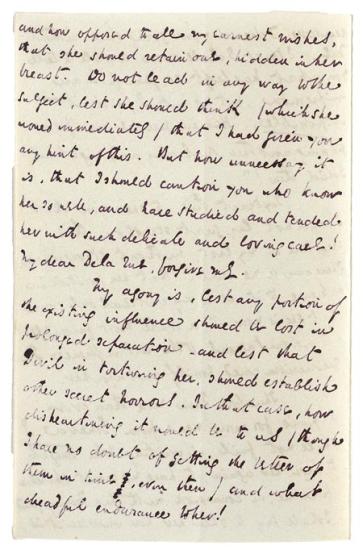
Autograph letter signed, Rome, 31 January 1845, to Emile de la Rue
Purchased in 1968
Shortly after his arrival in the United States in January 1842, Dickens told Dr. R. H. Collyer that, "with regard to my opinion on the subject of Mesmerism... I am a believer [but] I became so against all my preconceived opinions and impressions."
While in America, Dickens carried out his first mesmeric experiment on his wife, recalling that he "magnetized [hypnotized] her into hysterics, and then into the magnetic sleep." But his first significant efforts began in Genoa in December 1844, with his mesmeric treatment of Madame Augusta de la Rue. In this letter Dickens informed the husband of Madame de la Rue that she was "now in a state most favorable and advantageous to the best influence The Mesmerism could possibly exert upon her."
Mesmerism
In his life and art, Dickens worked energetically for healing. His fiction exposed many of the social ills of his day, and a significant portion of his later journalism is devoted to an impassioned campaign to improve sanitation and public health. Although he was a committed evolutionist and progressive in his attitude toward science and the improvements wrought by technological advances, he was also, by imagination and temperament, attracted to the fantastic and pseudoscientific. This was manifested in his interest in spontaneous combustion and phrenology as well as his fervent belief and active experiments in mesmerism (or "animal magnetism"), an early type of hypnotism.
Dickens was introduced to mesmerism through Dr. John Elliotson, his family physician and one of his "most intimate and valued friends." He became convinced of the therapeutic effects of mesmerism after witnessing Elliotson's demonstrations in 1838, and, although there is no record of Dickens undergoing the procedure, he learned to mesmerize others. Throughout the 1840s, he conducted mesmeric experiments on his wife and friends.
and how opposed to all my earnest wishes, that she should retain one, hidden in her breast. Do not lead in any way to the subject, lest she should think (which she would immediately) that I had given you any hint of this. But how unnecessary it is, that I should caution you who know her so well, and have studied and tended her with such delicate and loving care! My dear De la Rue, forgive me.
My agony is, lest any portion of the existing influence should be lost in prolonged separation—and lest that Devil in torturing her, should establish other secret horrors. In that case, how disheartening it would be to us (though I have no doubt of getting the better of them in time, even then) and what dreadful endurance to her!
Letter 13 | 31 January 1845 | to Emile de la Rue, page 7
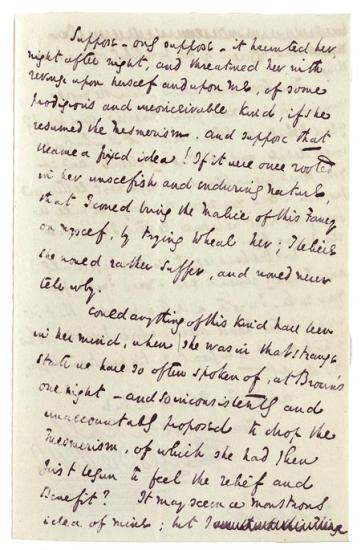
Autograph letter signed, Rome, 31 January 1845, to Emile de la Rue
Purchased in 1968
Shortly after his arrival in the United States in January 1842, Dickens told Dr. R. H. Collyer that, "with regard to my opinion on the subject of Mesmerism... I am a believer [but] I became so against all my preconceived opinions and impressions."
While in America, Dickens carried out his first mesmeric experiment on his wife, recalling that he "magnetized [hypnotized] her into hysterics, and then into the magnetic sleep." But his first significant efforts began in Genoa in December 1844, with his mesmeric treatment of Madame Augusta de la Rue. In this letter Dickens informed the husband of Madame de la Rue that she was "now in a state most favorable and advantageous to the best influence The Mesmerism could possibly exert upon her."
Mesmerism
In his life and art, Dickens worked energetically for healing. His fiction exposed many of the social ills of his day, and a significant portion of his later journalism is devoted to an impassioned campaign to improve sanitation and public health. Although he was a committed evolutionist and progressive in his attitude toward science and the improvements wrought by technological advances, he was also, by imagination and temperament, attracted to the fantastic and pseudoscientific. This was manifested in his interest in spontaneous combustion and phrenology as well as his fervent belief and active experiments in mesmerism (or "animal magnetism"), an early type of hypnotism.
Dickens was introduced to mesmerism through Dr. John Elliotson, his family physician and one of his "most intimate and valued friends." He became convinced of the therapeutic effects of mesmerism after witnessing Elliotson's demonstrations in 1838, and, although there is no record of Dickens undergoing the procedure, he learned to mesmerize others. Throughout the 1840s, he conducted mesmeric experiments on his wife and friends.
Suppose—only suppose—it haunted her, night after night, and threatened her with revenge upon herself and upon me, of some prodigious and inconceivable kind, if she resumed the Mesmerism. And suppose that became a fixed idea! If it were once rooted in her unselfish and enduring nature, that I could bring the Malice of this Fancy on myself, by trying to heal her; I believe she would rather suffer, and would never tell why.
Could anything of this kind have been in her mind, when she was in that strange state we have so often spoken of, at Brown's one night—and so inconsistently and unaccountably proposed to drop the Mesmerism, of which she had then just begun to feel the Relief and Benefit? It may seem a monstrous idea of mine; but
Letter 13 | 31 January 1845 | to Emile de la Rue, page 8
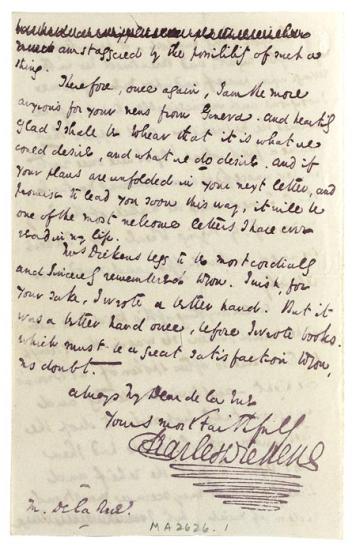
Autograph letter signed, Rome, 31 January 1845, to Emile de la Rue
Purchased in 1968
Shortly after his arrival in the United States in January 1842, Dickens told Dr. R. H. Collyer that, "with regard to my opinion on the subject of Mesmerism... I am a believer [but] I became so against all my preconceived opinions and impressions."
While in America, Dickens carried out his first mesmeric experiment on his wife, recalling that he "magnetized [hypnotized] her into hysterics, and then into the magnetic sleep." But his first significant efforts began in Genoa in December 1844, with his mesmeric treatment of Madame Augusta de la Rue. In this letter Dickens informed the husband of Madame de la Rue that she was "now in a state most favorable and advantageous to the best influence The Mesmerism could possibly exert upon her."
Mesmerism
In his life and art, Dickens worked energetically for healing. His fiction exposed many of the social ills of his day, and a significant portion of his later journalism is devoted to an impassioned campaign to improve sanitation and public health. Although he was a committed evolutionist and progressive in his attitude toward science and the improvements wrought by technological advances, he was also, by imagination and temperament, attracted to the fantastic and pseudoscientific. This was manifested in his interest in spontaneous combustion and phrenology as well as his fervent belief and active experiments in mesmerism (or "animal magnetism"), an early type of hypnotism.
Dickens was introduced to mesmerism through Dr. John Elliotson, his family physician and one of his "most intimate and valued friends." He became convinced of the therapeutic effects of mesmerism after witnessing Elliotson's demonstrations in 1838, and, although there is no record of Dickens undergoing the procedure, he learned to mesmerize others. Throughout the 1840s, he conducted mesmeric experiments on his wife and friends.
I am staggered by the possibility of such a thing.
Therefore, once again, I am the more anxious for your news from Geneva. And heartily glad I shall be to hear that it is what we could desire, and what we do desire. And if your plans are unfolded in your next letter, and promise to lead you soon this way, it will be one of the most welcome letters I have ever read in my life.
Mrs. Dickens begs to be most cordially and Sincerely remembered to you. I wish, for your sake, I wrote a better hand. But it was a better hand once, before I wrote books. Which must be a great satisfaction to you, no doubt.
Always My Dear de la Rue | Yours most Faithfully
CHARLES DICKENS
Letter 14 | 4 February 1845 | to Emile de la Rue, page 1
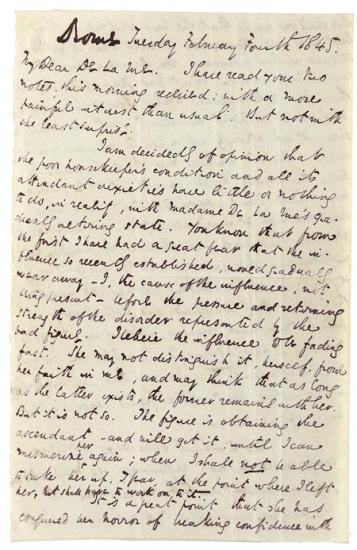
Autograph letter signed, Rome, 31 January 1845, to Emile de la Rue
Purchased in 1968
For several years prior to first meeting Dickens in 1844, Madame de la Rue had suffered from such generalized symptoms as insomnia, headaches, nervous tics, and convulsions. Over the course of his numerous mesmeric sessions, Dickens concluded that she was haunted by an evil phantom, alternately referred to in his detailed and extensive letters to her husband as "the bad figure," "Bad Spirit, "this creature," or "the shadow." Dickens came to believe that he was engaged in a powerful struggle with "this Phantom" for control of the "mind and body" of Madame de la Rue. In this letter he asserts confidence in his mesmeric abilities: "Pursuing that Magnetic power, and being near to her and with her, I believe that I can shiver it [the phantom] like Glass."
Mesmerism
In his life and art, Dickens worked energetically for healing. His fiction exposed many of the social ills of his day, and a significant portion of his later journalism is devoted to an impassioned campaign to improve sanitation and public health. Although he was a committed evolutionist and progressive in his attitude toward science and the improvements wrought by technological advances, he was also, by imagination and temperament, attracted to the fantastic and pseudoscientific. This was manifested in his interest in spontaneous combustion and phrenology as well as his fervent belief and active experiments in mesmerism (or "animal magnetism"), an early type of hypnotism.
Dickens was introduced to mesmerism through Dr. John Elliotson, his family physician and one of his "most intimate and valued friends." He became convinced of the therapeutic effects of mesmerism after witnessing Elliotson's demonstrations in 1838, and, although there is no record of Dickens undergoing the procedure, he learned to mesmerize others. Throughout the 1840s, he conducted mesmeric experiments on his wife and friends.
My Dear De La Rue. I have read your two notes; this morning received; with a more painful interest than usual. But not with the least surprise.
I am decidedly of opinion that the poor housekeeper's condition and all its attendant anxieties have little or nothing to do, in reality, with Madame De La Rue's gradually altering state. You know that from the first I have had a great fear that the influence so recently established, would gradually wear away—I, the cause of the influence, not being present—before the pressure and returning strength of the disorder represented by the bad figure. I believe the influence to be fading fast. She may not distinguish it, herself, from her faith in me, and may think that as long as the latter exists, the former remains with her. But it is not so. The figure is obtaining the ascendant—and will get it, until I can mesmerize her again; when I shall not be able to take her up, I fear, at the point where I left her, but shall have to work on to it.
It is a great point that she has conquered her horror of breaking confidence with
Letter 14 | 4 February 1845 | to Emile de la Rue, page 2

Autograph letter signed, Genoa, 4 February 1845, to Emile de la Rue
Purchased in 1968
For several years prior to first meeting Dickens in 1844, Madame de la Rue had suffered from such generalized symptoms as insomnia, headaches, nervous tics, and convulsions. Over the course of his numerous mesmeric sessions, Dickens concluded that she was haunted by an evil phantom, alternately referred to in his detailed and extensive letters to her husband as "the bad figure," "Bad Spirit, "this creature," or "the shadow." Dickens came to believe that he was engaged in a powerful struggle with "this Phantom" for control of the "mind and body" of Madame de la Rue. In this letter he asserts confidence in his mesmeric abilities: "Pursuing that Magnetic power, and being near to her and with her, I believe that I can shiver it [the phantom] like Glass."
Mesmerism
In his life and art, Dickens worked energetically for healing. His fiction exposed many of the social ills of his day, and a significant portion of his later journalism is devoted to an impassioned campaign to improve sanitation and public health. Although he was a committed evolutionist and progressive in his attitude toward science and the improvements wrought by technological advances, he was also, by imagination and temperament, attracted to the fantastic and pseudoscientific. This was manifested in his interest in spontaneous combustion and phrenology as well as his fervent belief and active experiments in mesmerism (or "animal magnetism"), an early type of hypnotism.
Dickens was introduced to mesmerism through Dr. John Elliotson, his family physician and one of his "most intimate and valued friends." He became convinced of the therapeutic effects of mesmerism after witnessing Elliotson's demonstrations in 1838, and, although there is no record of Dickens undergoing the procedure, he learned to mesmerize others. Throughout the 1840s, he conducted mesmeric experiments on his wife and friends.
shadow, and that she has told me, in this last note, all it said when it broke silence in her bedroom. On the other hand, I cannot but observe that her fear of it is greater than her subservience to me. I find this exemplified in a slight incident, but one which shews it as strongly as a greater circumstance could. She had written me that she would leave the Casino Ball, exactly at One: remembering that I had appointed that hour before: and thinking it would please me. She laid great stress on this, and underlined the words. Notwithstanding this promise and her desire to keep it, her dread of the shadow becomes so great that she utterly disregards her voluntary pledge to me, and remains abroad until the morning is far advanced (as I learn from you) to escape it. I see in this, an increasing power on the part of the figure, beyond all kind of question.
As to what she says of her confidence in not requiring the Magnetism (if need were) until my return to Genoa, we can place no reliance on it
Letter 14 | 4 February 1845 | to Emile de la Rue, page 3
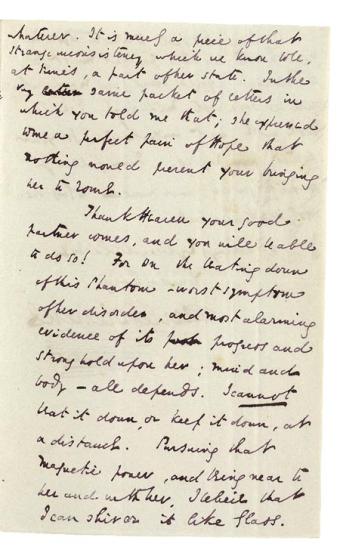
Autograph letter signed, Genoa, 4 February 1845, to Emile de la Rue
Purchased in 1968
For several years prior to first meeting Dickens in 1844, Madame de la Rue had suffered from such generalized symptoms as insomnia, headaches, nervous tics, and convulsions. Over the course of his numerous mesmeric sessions, Dickens concluded that she was haunted by an evil phantom, alternately referred to in his detailed and extensive letters to her husband as "the bad figure," "Bad Spirit, "this creature," or "the shadow." Dickens came to believe that he was engaged in a powerful struggle with "this Phantom" for control of the "mind and body" of Madame de la Rue. In this letter he asserts confidence in his mesmeric abilities: "Pursuing that Magnetic power, and being near to her and with her, I believe that I can shiver it [the phantom] like Glass."
Mesmerism
In his life and art, Dickens worked energetically for healing. His fiction exposed many of the social ills of his day, and a significant portion of his later journalism is devoted to an impassioned campaign to improve sanitation and public health. Although he was a committed evolutionist and progressive in his attitude toward science and the improvements wrought by technological advances, he was also, by imagination and temperament, attracted to the fantastic and pseudoscientific. This was manifested in his interest in spontaneous combustion and phrenology as well as his fervent belief and active experiments in mesmerism (or "animal magnetism"), an early type of hypnotism.
Dickens was introduced to mesmerism through Dr. John Elliotson, his family physician and one of his "most intimate and valued friends." He became convinced of the therapeutic effects of mesmerism after witnessing Elliotson's demonstrations in 1838, and, although there is no record of Dickens undergoing the procedure, he learned to mesmerize others. Throughout the 1840s, he conducted mesmeric experiments on his wife and friends.
whatever. It is merely a piece of that strange inconsistency which we know to be, at times, a part of her state. In the very same packet of letters in which you told me that; she expressed to me a perfect pain of Hope that nothing would prevent your bringing her to Rome.
Thank Heaven your good partner comes, and you will be able to do so! For on the beating down of this Phantom—worst symptom of her disorder, and most alarming evidence of its progress and strong hold upon her; mind and body—all depends. I cannot beat it down, or keep it down, at a distance. Pursuing that Magnetic power, and being near to her and with her, I believe that I can shiver it like Glass.
Letter 14 | 4 February 1845 | to Emile de la Rue, page 4
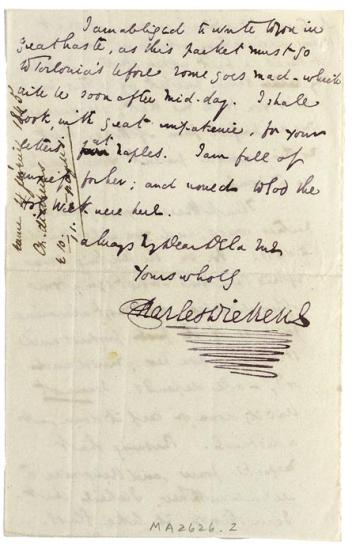
Autograph letter signed, Genoa, 4 February 1845, to Emile de la Rue
Purchased in 1968
For several years prior to first meeting Dickens in 1844, Madame de la Rue had suffered from such generalized symptoms as insomnia, headaches, nervous tics, and convulsions. Over the course of his numerous mesmeric sessions, Dickens concluded that she was haunted by an evil phantom, alternately referred to in his detailed and extensive letters to her husband as "the bad figure," "Bad Spirit, "this creature," or "the shadow." Dickens came to believe that he was engaged in a powerful struggle with "this Phantom" for control of the "mind and body" of Madame de la Rue. In this letter he asserts confidence in his mesmeric abilities: "Pursuing that Magnetic power, and being near to her and with her, I believe that I can shiver it [the phantom] like Glass."
Mesmerism
In his life and art, Dickens worked energetically for healing. His fiction exposed many of the social ills of his day, and a significant portion of his later journalism is devoted to an impassioned campaign to improve sanitation and public health. Although he was a committed evolutionist and progressive in his attitude toward science and the improvements wrought by technological advances, he was also, by imagination and temperament, attracted to the fantastic and pseudoscientific. This was manifested in his interest in spontaneous combustion and phrenology as well as his fervent belief and active experiments in mesmerism (or "animal magnetism"), an early type of hypnotism.
Dickens was introduced to mesmerism through Dr. John Elliotson, his family physician and one of his "most intimate and valued friends." He became convinced of the therapeutic effects of mesmerism after witnessing Elliotson's demonstrations in 1838, and, although there is no record of Dickens undergoing the procedure, he learned to mesmerize others. Throughout the 1840s, he conducted mesmeric experiments on his wife and friends.
I am obliged to write to you in great haste, as this packet must go to Torlonia's before Rome goes mad—which will be soon after Mid-day. I shall look, with great impatience, for your letters at Naples. I am full of anxiety for her; and would to God the Holy Week were here.
Always My Dear De la Rue | Yours wholly
CHARLES DICKENS
Letter 15 | 10 February 1845 | to Emile de la Rue, page 1

Autograph letter signed, Naples, 10 February 1845, to Emile de la Rue
Purchased in 1968
Dickens's letters to Emile de la Rue included progress reports on the positive effects of his mesmeric treatment of Madame de la Rue, which was no less fervent for being, by this stage, conducted in absentia. Utterly confident in his powers, Dickens told de la Rue that, "when I think of all that lies before us, I have a perfect conviction that I could magnetize [hypnotize] a Frying-Pan." The biographer Fred Kaplan argued: "Mesmerism provided Dickens not only with a rationale for the working of personality and mind . . . but with a language and an imagery that could be dramatically utilized in fictional creation." But Peter Ackroyd has suggested that for Dickens mesmerism was "part of his need to control, to dominate, to manipulate."
Mesmerism
In his life and art, Dickens worked energetically for healing. His fiction exposed many of the social ills of his day, and a significant portion of his later journalism is devoted to an impassioned campaign to improve sanitation and public health. Although he was a committed evolutionist and progressive in his attitude toward science and the improvements wrought by technological advances, he was also, by imagination and temperament, attracted to the fantastic and pseudoscientific. This was manifested in his interest in spontaneous combustion and phrenology as well as his fervent belief and active experiments in mesmerism (or "animal magnetism"), an early type of hypnotism.
Dickens was introduced to mesmerism through Dr. John Elliotson, his family physician and one of his "most intimate and valued friends." He became convinced of the therapeutic effects of mesmerism after witnessing Elliotson's demonstrations in 1838, and, although there is no record of Dickens undergoing the procedure, he learned to mesmerize others. Throughout the 1840s, he conducted mesmeric experiments on his wife and friends.
My Dear De la Rue.
We were delayed a day longer than I had expected, in Rome; and did not get here, until yesterday Evening. The Steamer which brought me your most welcome Packet arrived at breakfast-time this morning. I saw it coming; and had your letter in my hand, almost as soon as I had shut the telescope, through which I watched it into Port.
I am much concerned that you should think it possible I had the faintest doubt of the true depth, intensity, and earnestness, of your devotion to Madame De la Rue; or of the affectionate and zealous watch you have kept over her in all her sufferings. Believe me, I admire and feel your constancy under such a trial, scarcely less than hers; and that everything I have seen of you, in reference to her (it has been much, though in a short time) has filled me with a sorrowful pleasure, not easy of expression. When I wrote to you, strongly, on the Great and terrible symptom which is hovering about her, and over which—God be thanked for it!—we know we can exercise great power; I wrote as I felt. As I felt, do I say! Not one twentieth part as strongly as I felt, and feel. For the mystery of her mind in connexion with this Phantom, was then just opening to me. And the vast extent of the danger by which I saw she was beset, made me clench the pen as if it were an iron rod—Made me use it too, as clumsily as if it were a poker, when it became the instrument of conveying such a wrong and groundless idea to you.
My full reasons for entertaining this fervid opinion of the necessity of following up the blow that has been struck at this worst symptom of her state, I cannot give you. For she makes a condition with me that I shall not, until—she looks forward, you see, to being quite composed upon the subject, one day—until she gives me leave. Under the impression that with all your anxious care you might not know what she had kept hidden so fearfully in her breast, I wrote as I did. With no other grain of meaning or intention my dear friend, believe me.
I think it possible, even now—I think it probable, indeed—that as the time approaches for your journey to Rome, she may raise objections, and be disinclined to go. The more she shews this state of mind, the greater the danger is, and the more urgent and imperative the necessity for her being brought—I underline the word "brought" to express—by your determination. You feel with me, I know.
Observe, my dear De la Rue. On Sunday the Second, she confesses to you that she feels stronger against the figures, now that the journey is decided on. That night, she sees the Figure, and apparently overcomes it. But before it disappears, it says something, which she does not distinctly hear. On the next day, she vaguely damps the ardour of your preparations for the journey. I strongly incline, with you, to the belief that trying in the interval to put together what scattered words she heard the figure say, she joined and dovetailed them into some threat, having reference to her venturing to undertake the journey. And I think you will always find that her otherwise unaccountable indisposition to go, manifests itself, after an interview with this Phantom. That her own heart is set on going—that her whole being is full of the most earnest hope and expectation of relief that all her wishes tend that way—I know. In this very last letter, received to day, she speaks of it with greater Earnestness than
Letter 15 | 10 February 1845 | to Emile de la Rue, page 2
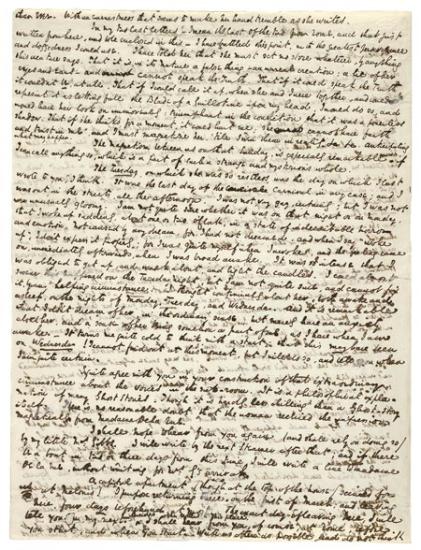
Autograph letter signed, Naples, 10 February 1845, to Emile de la Rue
Purchased in 1968
Dickens's letters to Emile de la Rue included progress reports on the positive effects of his mesmeric treatment of Madame de la Rue, which was no less fervent for being, by this stage, conducted in absentia. Utterly confident in his powers, Dickens told de la Rue that, "when I think of all that lies before us, I have a perfect conviction that I could magnetize [hypnotize] a Frying-Pan." The biographer Fred Kaplan argued: "Mesmerism provided Dickens not only with a rationale for the working of personality and mind . . . but with a language and an imagery that could be dramatically utilized in fictional creation." But Peter Ackroyd has suggested that for Dickens mesmerism was "part of his need to control, to dominate, to manipulate."
Mesmerism
In his life and art, Dickens worked energetically for healing. His fiction exposed many of the social ills of his day, and a significant portion of his later journalism is devoted to an impassioned campaign to improve sanitation and public health. Although he was a committed evolutionist and progressive in his attitude toward science and the improvements wrought by technological advances, he was also, by imagination and temperament, attracted to the fantastic and pseudoscientific. This was manifested in his interest in spontaneous combustion and phrenology as well as his fervent belief and active experiments in mesmerism (or "animal magnetism"), an early type of hypnotism.
Dickens was introduced to mesmerism through Dr. John Elliotson, his family physician and one of his "most intimate and valued friends." He became convinced of the therapeutic effects of mesmerism after witnessing Elliotson's demonstrations in 1838, and, although there is no record of Dickens undergoing the procedure, he learned to mesmerize others. Throughout the 1840s, he conducted mesmeric experiments on his wife and friends.
than ever. With an earnestness that seems to make her hand tremble as she writes.
In my two last letters—I mean the last of the two from Rome, and that just written from here, and to be enclosed in this—I have battled this point, with the greatest perseverance and doggedness I could use. I have told her that she must set no store whatever, by anything this creature says. That it is in its Nature a false thing—an unreal creation; a lie of her eyes and Ears—and cannot speak the Truth. That if it could speak the Truth, it couldn't be, at all. That if I could call it up, when she and I were together, and could represent it as letting fall the Blade of a Guillotine upon my head, I would do so, and would have her look on immoveably: triumphant in the conviction that it was a powerless shadow. That if she thinks, for a moment, it could hurt me; she cannot have faith and trust in me, and I must magnetize her, 'till I win them in reality—&c&c. Anticipating what may happen.
The Magnetism between us on that Sunday, is especially remarkable—if I can call anything so, which is a part of such a strange and mysterious whole.
The Tuesday, on which she was so restless, was the day on which I last wrote to you, I think. It was the last day of the Carnival in any case; and I was out, in the streets, all the afternoon. I was not very gay, certainly; but I was not unusually gloomy. I am not quite sure whether it was on that night or on Monday, that I woke up suddenly, about one or two o'Clock, in a state of indescribable horror and emotion. Not caused by any dream, for I had not dreamed. And when I say "woke up", I don't express it properly; for I was quite myself when I awoke, and the feeling came on, immediately afterwards, when I was broad awake. It was so intense that I was obliged to get up, and walk about, and light the candles. I could almost swear this happened on the Tuesday Night, but I am not quite sure, and cannot fix it, by any helping circumstance. I thought continually about her, both awake and asleep, on the nights of Monday, Tuesday, and Wednesday. And it is remarkable that I don't dream of her, in the ordinary sense; but merely have an anxiety about her, and a sense of her being somehow a part of me, as I have when I am awake.—It turns me quite cold to think, with a start, that this may have been on Wednesday! I cannot find out at this moment, but I will do so, and tell you when I am quite certain.
I quite agree with you in your construction of that extraordinary circumstance about the voices in the sick-room. It is a philosophical explanation of many Ghost Stories. Though it is hardly less chilling than a Ghost-Story itself. There is no reasonable doubt that the woman received the impression magnetically from Madame De la Rue.
I shall hope to hear from you again (and shall rely on doing so) by my little Mrs. Gibbs. I will write by the next Steamer after that; and if there be a boat in two or three days from this time, I will write a line to Madame De la Rue, without waiting for Mrs. G's arrival.
A capital apartment (though at the top of the house) secured for us at Meloni's! I purpose returning there, on the first of March; and leaving here, four days beforehand, at most. The exact day of leaving here, I will tell you in my next. Besides other letters to this place, I shall hear from you, of course, at Rome, before you start, and when you start. Write as often as possible—and do not think
Letter 15 | 10 February 1845 | to Emile de la Rue, page 3
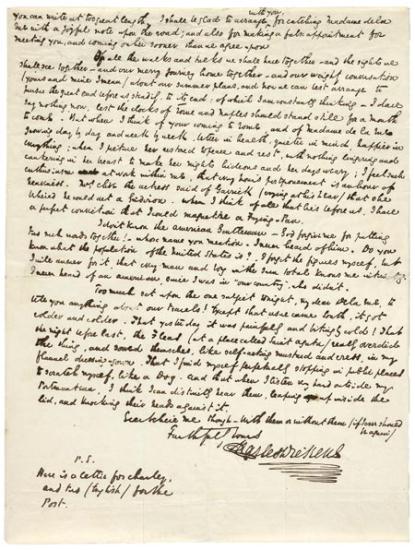
Autograph letter signed, Naples, 10 February 1845, to Emile de la Rue
Purchased in 1968
Dickens's letters to Emile de la Rue included progress reports on the positive effects of his mesmeric treatment of Madame de la Rue, which was no less fervent for being, by this stage, conducted in absentia. Utterly confident in his powers, Dickens told de la Rue that, "when I think of all that lies before us, I have a perfect conviction that I could magnetize [hypnotize] a Frying-Pan." The biographer Fred Kaplan argued: "Mesmerism provided Dickens not only with a rationale for the working of personality and mind . . . but with a language and an imagery that could be dramatically utilized in fictional creation." But Peter Ackroyd has suggested that for Dickens mesmerism was "part of his need to control, to dominate, to manipulate."
Mesmerism
In his life and art, Dickens worked energetically for healing. His fiction exposed many of the social ills of his day, and a significant portion of his later journalism is devoted to an impassioned campaign to improve sanitation and public health. Although he was a committed evolutionist and progressive in his attitude toward science and the improvements wrought by technological advances, he was also, by imagination and temperament, attracted to the fantastic and pseudoscientific. This was manifested in his interest in spontaneous combustion and phrenology as well as his fervent belief and active experiments in mesmerism (or "animal magnetism"), an early type of hypnotism.
Dickens was introduced to mesmerism through Dr. John Elliotson, his family physician and one of his "most intimate and valued friends." He became convinced of the therapeutic effects of mesmerism after witnessing Elliotson's demonstrations in 1838, and, although there is no record of Dickens undergoing the procedure, he learned to mesmerize others. Throughout the 1840s, he conducted mesmeric experiments on his wife and friends.
you can write at too great length. I shall be glad to arrange with you, for catching Madame de la Rue with a joyful note, upon the road; and also for making a false appointment for meeting you, and coming on her sooner than we agree upon.
Of all the walks and talks we shall have together—and the sights we shall see together—and our merry journey home together—and our weighty conversation (yours and mine I mean) about our summer plans, and how we can best arrange to pursue the great end before us, steadily, to its end: of which I am constantly thinking—I dare say nothing, now, lest the clocks of Rome and Naples should stand still for a Month to come. But when I think of your coming to Rome, and of Madame de la Rue growing day by day and week by week, better in health, quieter in mind, happier in everything; when I picture her restored to peace and rest, with nothing lingering and cankering in her breast to make her nights hideous and her days weary; I feel such enthusiasm at work within me, that every hour's postponement is an hour of heaviness. Mrs. Clive the actress said of Garrick (crying at his Lear) that she believed he could act a Gridiron. When I think of all that lies before us, I have a perfect conviction that I could magnetize a Frying-Pan.
I don't know the American Gentleman—God forgive me for putting two such words together!—whose name you mention. I never heard of him. Do you know what the population of the United States is?—I forget the figures myself, but I will answer for it, that every man and boy in the sum total knows me intimately. I never heard of an American, since I was in "our country", who didn't.
Too much set upon the one subject tonight, my dear De la Rue, to tell you anything about our travels! Except that as we came South, it got colder and colder. That yesterday it was painfully and bitingly cold! That the night before last, the Fleas (at a place called Saint Agata) really overdid the thing, and sowed themselves, like self-acting mustard and cress, in my flannel dressing-gown. That I find myself perpetually stopping in public places to scratch myself, like a Dog. And that when I listen very hard outside my Portmanteau, I think I can distinctly hear them, leaping up inside the lid, and knocking their heads against it.
Ever believe me though—With them or without them (if I ever should be again)
Faithfully Yours
CHARLES DICKENS
Letter 15 | 10 February 1845 | to Emile de la Rue, page 4

Autograph letter signed, Naples, 10 February 1845, to Emile de la Rue
Purchased in 1968
Dickens's letters to Emile de la Rue included progress reports on the positive effects of his mesmeric treatment of Madame de la Rue, which was no less fervent for being, by this stage, conducted in absentia. Utterly confident in his powers, Dickens told de la Rue that, "when I think of all that lies before us, I have a perfect conviction that I could magnetize [hypnotize] a Frying-Pan." The biographer Fred Kaplan argued: "Mesmerism provided Dickens not only with a rationale for the working of personality and mind . . . but with a language and an imagery that could be dramatically utilized in fictional creation." But Peter Ackroyd has suggested that for Dickens mesmerism was "part of his need to control, to dominate, to manipulate."
Mesmerism
In his life and art, Dickens worked energetically for healing. His fiction exposed many of the social ills of his day, and a significant portion of his later journalism is devoted to an impassioned campaign to improve sanitation and public health. Although he was a committed evolutionist and progressive in his attitude toward science and the improvements wrought by technological advances, he was also, by imagination and temperament, attracted to the fantastic and pseudoscientific. This was manifested in his interest in spontaneous combustion and phrenology as well as his fervent belief and active experiments in mesmerism (or "animal magnetism"), an early type of hypnotism.
Dickens was introduced to mesmerism through Dr. John Elliotson, his family physician and one of his "most intimate and valued friends." He became convinced of the therapeutic effects of mesmerism after witnessing Elliotson's demonstrations in 1838, and, although there is no record of Dickens undergoing the procedure, he learned to mesmerize others. Throughout the 1840s, he conducted mesmeric experiments on his wife and friends.
Letter 16 | 27 September 1849 | to F. M. Evans, page 1
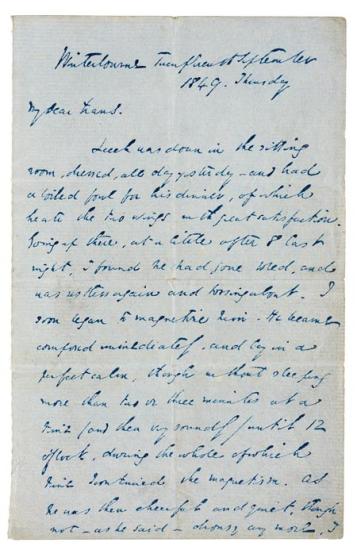
Autograph letter signed with initials, Winterbourne, 27 September 1849 to the publisher F. M. Evans
Purchased on the Fellows Fund, 1971
In 1849 John Leech, illustrator of A Christmas Carol, was injured in a swimming accident. In this letter Dickens reports using hypnotism to restore Leech's health: "I soon began to magnetize him. He became composed immediately, and lay in a perfect calm." Dickens was convinced of the therapeutic effect of his efforts on this occasion and recalled observing "exactly this effect several times, in a lady whom I magnetized every day for Six months, in Italy [Madame de la Rue]. Her disorder was tic Doloreux [trigeminal neuralgia, a severe, stabbing pain to one side of the face] in a most horrible form. In some states of nervous excitement she never went to sleep for more than a minute or two at a time, but was invariably tranquillized and made easy by the process."
Mesmerism
In his life and art, Dickens worked energetically for healing. His fiction exposed many of the social ills of his day, and a significant portion of his later journalism is devoted to an impassioned campaign to improve sanitation and public health. Although he was a committed evolutionist and progressive in his attitude toward science and the improvements wrought by technological advances, he was also, by imagination and temperament, attracted to the fantastic and pseudoscientific. This was manifested in his interest in spontaneous combustion and phrenology as well as his fervent belief and active experiments in mesmerism (or "animal magnetism"), an early type of hypnotism.
Dickens was introduced to mesmerism through Dr. John Elliotson, his family physician and one of his "most intimate and valued friends." He became convinced of the therapeutic effects of mesmerism after witnessing Elliotson's demonstrations in 1838, and, although there is no record of Dickens undergoing the procedure, he learned to mesmerize others. Throughout the 1840s, he conducted mesmeric experiments on his wife and friends.
My Dear Evans.
Leech was down in the sitting room, dressed, all day yesterday—and had a boiled fowl for his dinner, of which he ate the two wings with great satisfaction. Going up there, at a little after 8 last night, I found he had gone to bed, and was restless again and tossing about. I soon began to magnetize him. He became composed immediately, and lay in a perfect calm, though without sleeping more than two or three minutes at a time (and then very soundly) until 12 o'Clock, during the whole of which time I continued the magnetism. As he was then cheerful and quiet, though not—as he said—drowsy any more, I
Letter 16 | 27 September 1849 | to F. M. Evans, page 2
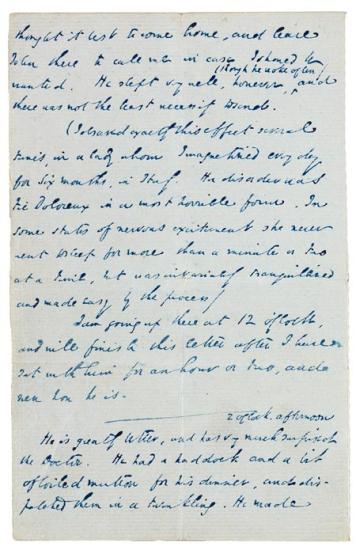
Autograph letter signed with initials, Winterbourne, 27 September 1849 to the publisher F. M. Evans
Purchased on the Fellows Fund, 1971
In 1849 John Leech, illustrator of A Christmas Carol, was injured in a swimming accident. In this letter Dickens reports using hypnotism to restore Leech's health: "I soon began to magnetize him. He became composed immediately, and lay in a perfect calm." Dickens was convinced of the therapeutic effect of his efforts on this occasion and recalled observing "exactly this effect several times, in a lady whom I magnetized every day for Six months, in Italy [Madame de la Rue]. Her disorder was tic Doloreux [trigeminal neuralgia, a severe, stabbing pain to one side of the face] in a most horrible form. In some states of nervous excitement she never went to sleep for more than a minute or two at a time, but was invariably tranquillized and made easy by the process."
Mesmerism
In his life and art, Dickens worked energetically for healing. His fiction exposed many of the social ills of his day, and a significant portion of his later journalism is devoted to an impassioned campaign to improve sanitation and public health. Although he was a committed evolutionist and progressive in his attitude toward science and the improvements wrought by technological advances, he was also, by imagination and temperament, attracted to the fantastic and pseudoscientific. This was manifested in his interest in spontaneous combustion and phrenology as well as his fervent belief and active experiments in mesmerism (or "animal magnetism"), an early type of hypnotism.
Dickens was introduced to mesmerism through Dr. John Elliotson, his family physician and one of his "most intimate and valued friends." He became convinced of the therapeutic effects of mesmerism after witnessing Elliotson's demonstrations in 1838, and, although there is no record of Dickens undergoing the procedure, he learned to mesmerize others. Throughout the 1840s, he conducted mesmeric experiments on his wife and friends.
thought it best to come home, and leave John there to call me in case I should be wanted. He slept very well, however, (though he woke often) and there was not the least necessity to send.
(I observed exactly this effect several times, in a lady whom I magnetized every day for Six months, in Italy. Her disorder was tic Doloreux in a most horrible form. In some states of nervous excitement she never went to sleep for more than a minute or two at a time, but was invariably tranquillized and made easy by the process.)
I am going up there at 12 o'Clock, and will finish this letter after I have sat with him for an hour or two, and seen how he is.
———
2 oClock. afternoon
He is greatly better, and has very much surprised the Doctor. He had a haddock and a bit of boiled mutton for his dinner, and dispatched them in a twinkling. He made
Letter 16 | 27 September 1849 | to F. M. Evans, page 3
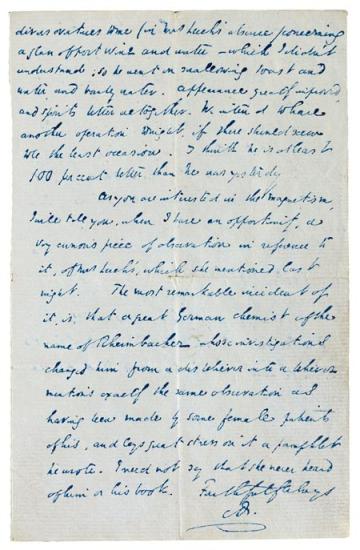
Autograph letter signed with initials, Winterbourne, 27 September 1849 to the publisher F. M. Evans
Purchased on the Fellows Fund, 1971
In 1849 John Leech, illustrator of A Christmas Carol, was injured in a swimming accident. In this letter Dickens reports using hypnotism to restore Leech's health: "I soon began to magnetize him. He became composed immediately, and lay in a perfect calm." Dickens was convinced of the therapeutic effect of his efforts on this occasion and recalled observing "exactly this effect several times, in a lady whom I magnetized every day for Six months, in Italy [Madame de la Rue]. Her disorder was tic Doloreux [trigeminal neuralgia, a severe, stabbing pain to one side of the face] in a most horrible form. In some states of nervous excitement she never went to sleep for more than a minute or two at a time, but was invariably tranquillized and made easy by the process."
Mesmerism
In his life and art, Dickens worked energetically for healing. His fiction exposed many of the social ills of his day, and a significant portion of his later journalism is devoted to an impassioned campaign to improve sanitation and public health. Although he was a committed evolutionist and progressive in his attitude toward science and the improvements wrought by technological advances, he was also, by imagination and temperament, attracted to the fantastic and pseudoscientific. This was manifested in his interest in spontaneous combustion and phrenology as well as his fervent belief and active experiments in mesmerism (or "animal magnetism"), an early type of hypnotism.
Dickens was introduced to mesmerism through Dr. John Elliotson, his family physician and one of his "most intimate and valued friends." He became convinced of the therapeutic effects of mesmerism after witnessing Elliotson's demonstrations in 1838, and, although there is no record of Dickens undergoing the procedure, he learned to mesmerize others. Throughout the 1840s, he conducted mesmeric experiments on his wife and friends.
divers overtures to me (in Mrs. Leech's absence) concerning a glass of port wine and water—which I didn't understand; so he went on swallowing toast and water, and barley water. Appearance greatly improved, and spirits better altogether. We intend to have another operation tonight, if there should seem to be the least occasion. I think he is at least 100 per cent better than he was yesterday.
As you are interested in the Magnetism, I will tell you, when I have an opportunity, a very curious piece of observation in reference to it, of Mrs. Leech's, which she mentioned last night. The most remarkable incident of it, is, that a great German chemist of the name of Rheimbacher whose investigations changed him from a disbeliever into a believer mentions exactly the same observation as having been made by some female patients of his, and lays great stress on it [in] a pamphlet he wrote. I need not say that she never heard of him or his book.
Faithfully Always
CHARLES DICKENS
Letter 17 | 4 December 1843 | to Thomas Mitton, page 1

Autograph letter signed with initials, London, 4 December [1843] to Thomas Mitton
Purchased by Pierpont Morgan before 1900
Two days after completing A Christmas Carol, Dickens discovered: "(to my horror) that I have already overdrawn my account." He wrote to request a loan of £200 from Mitton, citing his forthcoming book as collateral: "I must anticipate the Christmas Book, by the sum I mention, which will enable me to keep comfortable," adding that "I wouldn't trouble you about the money, if it were not a case of necessity." Dickens expected that by March 1844, when revenues from A Christmas Carol would be in hand, he would be moderately rich. This letter, in its original envelope, was pasted into the front endpapers of the bound manuscript of A Christmas Carol, a powerful reminder of the acutely difficult personal circumstances under which Dickens wrote this story.
Christmas Books
The Christmas books that Dickens wrote between 1843 and 1848, beginning with A Christmas Carol, permanently linked Dickens's name with the holiday. In 1883 Vincent van Gogh told a friend that he had "re-read them almost every year since I was a boy, and they always seem new to me." Following the enormous success of A Christmas Carol, public expectation led Dickens to write four more novella-length Christmas books. He also continued to publish stories—either written solely by him or in collaboration with others—for or about Christmas in the special holiday issues of his magazine Household Words and All the Year Round. Christmas was his favorite holiday, and each year he celebrated exuberantly, entertaining family and friends with conjuring tricks, games, dancing, and theatrical performances. For Dickens, Christmas was a time for storytelling—particularly ghost stories—and each of his tales is based on an implicit belief in the supernatural and emphasizes the moral benefits of memory and imagination.
My Dear Mitton
Just now, as I was coming down to you, a man brought a note from Lady Holland: begging me to dine there today, and to go and give her some advice this morning—Heaven knows what about. So I am obliged to turn my face Westward, and not Eastward. But I write to you for three reasons. First, to know whether anything has occurred. Secondly, what time tomorrow will suit you best for my calling on you. Thirdly, to ask you to turn over in your mind, between this and tomorrow, how I can best put £200 into Coutts's. For on looking into the matter this morning, for the first time these 6 weeks, I find (to my horror) that I have already overdrawn my account. This
Letter 17 | 4 December 1843 | to Thomas Mitton, page 2

Autograph letter signed with initials, London, 4 December [1843] to Thomas Mitton
Purchased by Pierpont Morgan before 1900
Two days after completing A Christmas Carol, Dickens discovered: "(to my horror) that I have already overdrawn my account." He wrote to request a loan of £200 from Mitton, citing his forthcoming book as collateral: "I must anticipate the Christmas Book, by the sum I mention, which will enable me to keep comfortable," adding that "I wouldn't trouble you about the money, if it were not a case of necessity." Dickens expected that by March 1844, when revenues from A Christmas Carol would be in hand, he would be moderately rich. This letter, in its original envelope, was pasted into the front endpapers of the bound manuscript of A Christmas Carol, a powerful reminder of the acutely difficult personal circumstances under which Dickens wrote this story.
Christmas Books
The Christmas books that Dickens wrote between 1843 and 1848, beginning with A Christmas Carol, permanently linked Dickens's name with the holiday. In 1883 Vincent van Gogh told a friend that he had "re-read them almost every year since I was a boy, and they always seem new to me." Following the enormous success of A Christmas Carol, public expectation led Dickens to write four more novella-length Christmas books. He also continued to publish stories—either written solely by him or in collaboration with others—for or about Christmas in the special holiday issues of his magazine Household Words and All the Year Round. Christmas was his favorite holiday, and each year he celebrated exuberantly, entertaining family and friends with conjuring tricks, games, dancing, and theatrical performances. For Dickens, Christmas was a time for storytelling—particularly ghost stories—and each of his tales is based on an implicit belief in the supernatural and emphasizes the moral benefits of memory and imagination.
month's money I have paid into the Eagle. Next month's is bespoke. And therefore I must anticipate the Christmas Book, by the sum I mention, which will enable me to keep comfortable.
If it would damage you, or bother you very much, to break the bill at Dixons by that sum, suppose you give me your acceptance at 3 months for it, and I will tell them I want it discounted at Coutts's? What do you think of this? The reason that I am pressed to do it, at once is, that I want it done, before I have any notice of my account being overdrawn—which is very important.
Of course, I could have double the sum from C and H, instantly. But I have been obliged to write them
Letter 17 | 4 December 1843 | to Thomas Mitton, page 3

Autograph letter signed with initials, London, 4 December [1843] to Thomas Mitton
Purchased by Pierpont Morgan before 1900
Two days after completing A Christmas Carol, Dickens discovered: "(to my horror) that I have already overdrawn my account." He wrote to request a loan of £200 from Mitton, citing his forthcoming book as collateral: "I must anticipate the Christmas Book, by the sum I mention, which will enable me to keep comfortable," adding that "I wouldn't trouble you about the money, if it were not a case of necessity." Dickens expected that by March 1844, when revenues from A Christmas Carol would be in hand, he would be moderately rich. This letter, in its original envelope, was pasted into the front endpapers of the bound manuscript of A Christmas Carol, a powerful reminder of the acutely difficult personal circumstances under which Dickens wrote this story.
Christmas Books
The Christmas books that Dickens wrote between 1843 and 1848, beginning with A Christmas Carol, permanently linked Dickens's name with the holiday. In 1883 Vincent van Gogh told a friend that he had "re-read them almost every year since I was a boy, and they always seem new to me." Following the enormous success of A Christmas Carol, public expectation led Dickens to write four more novella-length Christmas books. He also continued to publish stories—either written solely by him or in collaboration with others—for or about Christmas in the special holiday issues of his magazine Household Words and All the Year Round. Christmas was his favorite holiday, and each year he celebrated exuberantly, entertaining family and friends with conjuring tricks, games, dancing, and theatrical performances. For Dickens, Christmas was a time for storytelling—particularly ghost stories—and each of his tales is based on an implicit belief in the supernatural and emphasizes the moral benefits of memory and imagination.
a most tremendous letter, and have told them not to answer it, or to come near me, but simply to do what I have ordered them. Can you believe that with the exception of Blackwood's, the Carol is not advertized in One of the Magazines! Bradbury would not believe it when I told him on Saturday last. And he says that nothing but a tremendous push can possibly atone for such fatal negligence. Consequently, I have written to the Strand, and said—Do this—Do that—Do the other—keep away from me—and be damned.
I have shewn the book to two or three Judges of very different views and constitutions. I have never seen men, personally and mentally opposed to each other, so unanimous in their
Letter 17 | 4 December 1843 | to Thomas Mitton, page 4

Autograph letter signed with initials, London, 4 December [1843] to Thomas Mitton
Purchased by Pierpont Morgan before 1900
Two days after completing A Christmas Carol, Dickens discovered: "(to my horror) that I have already overdrawn my account." He wrote to request a loan of £200 from Mitton, citing his forthcoming book as collateral: "I must anticipate the Christmas Book, by the sum I mention, which will enable me to keep comfortable," adding that "I wouldn't trouble you about the money, if it were not a case of necessity." Dickens expected that by March 1844, when revenues from A Christmas Carol would be in hand, he would be moderately rich. This letter, in its original envelope, was pasted into the front endpapers of the bound manuscript of A Christmas Carol, a powerful reminder of the acutely difficult personal circumstances under which Dickens wrote this story.
Christmas Books
The Christmas books that Dickens wrote between 1843 and 1848, beginning with A Christmas Carol, permanently linked Dickens's name with the holiday. In 1883 Vincent van Gogh told a friend that he had "re-read them almost every year since I was a boy, and they always seem new to me." Following the enormous success of A Christmas Carol, public expectation led Dickens to write four more novella-length Christmas books. He also continued to publish stories—either written solely by him or in collaboration with others—for or about Christmas in the special holiday issues of his magazine Household Words and All the Year Round. Christmas was his favorite holiday, and each year he celebrated exuberantly, entertaining family and friends with conjuring tricks, games, dancing, and theatrical performances. For Dickens, Christmas was a time for storytelling—particularly ghost stories—and each of his tales is based on an implicit belief in the supernatural and emphasizes the moral benefits of memory and imagination.
predictions, or so hot in their approval.
I can come down to you before dinner to day—at 4 or 5. A word by Bearer. I wouldn't trouble you about the money, if it were not a case of necessity. But being so busy, I have let it pass until the very last moment. In March or so, please God, I shall be as rich as (a very moderate) Jew.
Faithfully Ever
CD.
Letter 18 | 29 September 1864 | to Marcus Stone, page 1
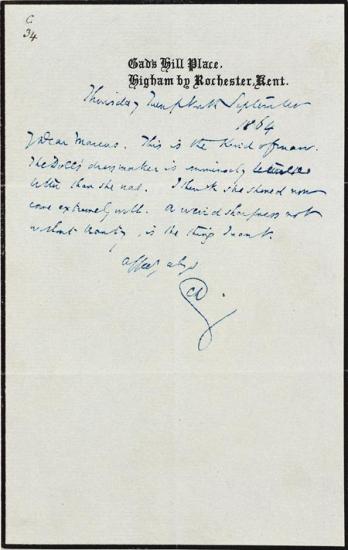
Autograph letter signed with initials, Higham, 29 September 1864 to Marcus Stone
Purchased by Pierpont Morgan before 1913
Dickens chose to collaborate with Stone for the illustrations featured in the monthly serialization of Our Mutual Friend. Dickens was specific and precise in his requirements for the illustrations of some of the novel's scenes, suggesting which characters and events should be depicted. After initially supervising Stone's work for the early parts, however, he became increasingly confident in his illustrator and permitted him to select some of the subjects to be pictured. In this letter, Dickens comments on Stone's depiction of Jenny Wren: "The Doll's dressmaker is immensely better than she was. I think she should now come extremely well. A weird sharpness not without beauty, is the thing I want."
Story Weaver
The gestation period of Our Mutual Friend, Dickens's last completed novel, was protracted and frustrating. He decided upon the title in 1860 or 1861, invented the names of several characters, and devised some possible plot trajectories. During the summer of 1862, he told Wilkie Collins that, "sometimes, in a desperate state, I seize a pen, and resolve to precipitate myself upon a story. Then I get up again with a forehead as gnarled as the oak tree outside the window, and find all the lines in my face that ought to be on the blank paper." It was not until a further year and a half later that Dickens could report to Collins that he had completed the first two monthly parts of his next serialized novel, and admitted that he felt "quite dazed in getting back to the large canvas and the big brushes." Dickens had to work "like a dragon" to complete Our Mutual Friend by 2 September 1865. Commenting on the difficulties of the novel's complex, interconnected plot, Dickens characterized himself as "the story-weaver at his loom."
My Dear Marcus. This is the kind of man. The Doll's dressmaker is immensely better than she was. I think she should now come extremely well. A weird sharpness not without beauty, is the thing I want.
Affecy. always
CD.
Letter 19 | 30 November 1865 | to Eneas Sweetland Dallas, page 1
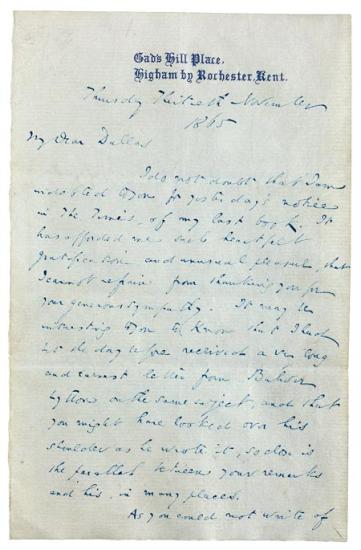
Autograph letter signed, Higham, 30 November 1865 to Eneas Sweetland Dallas
Acquired by Pierpont Morgan before 1913
In his review of Our Mutual Friend for The Times, E. S. Dallas commented that Dickens was not only "the most extraordinary genius" but also "the most careful and painstaking in his work." The sensitivity of Dallas's appreciation of the novel appealed so much to Dickens that he presented his manuscript to the reviewer, telling him in this letter: "you could not write of my work of love in such a way, without thoroughly knowing what I would feel in reading your words... . But as you have divined what pains I bestowed upon the book, perhaps you might set some little value on the Manuscript, as your corroboration... and... as a token of my grateful regard."
Story Weaver
The gestation period of Our Mutual Friend, Dickens's last completed novel, was protracted and frustrating. He decided upon the title in 1860 or 1861, invented the names of several characters, and devised some possible plot trajectories. During the summer of 1862, he told Wilkie Collins that, "sometimes, in a desperate state, I seize a pen, and resolve to precipitate myself upon a story. Then I get up again with a forehead as gnarled as the oak tree outside the window, and find all the lines in my face that ought to be on the blank paper." It was not until a further year and a half later that Dickens could report to Collins that he had completed the first two monthly parts of his next serialized novel, and admitted that he felt "quite dazed in getting back to the large canvas and the big brushes." Dickens had to work "like a dragon" to complete Our Mutual Friend by 2 September 1865. Commenting on the difficulties of the novel's complex, interconnected plot, Dickens characterized himself as "the story-weaver at his loom."
My Dear Dallas
I do not doubt that I am indebted to you for yesterday's notice in The Times, of my last book. It has afforded me such heartfelt gratification and unusual pleasure, that I cannot refrain from thanking you for your generous sympathy. It may be interesting to you to know that I had but the day before received a very long and earnest letter from Bulwer Lytton on the same subject, and that you might have looked over his shoulder as he wrote it, so close is the parallel between your remarks and his, in many places.
As you could not write of
Letter 19 | 30 November 1865 | to Eneas Sweetland Dallas, page 2

Autograph letter signed, Higham, 30 November 1865 to Eneas Sweetland Dallas
Acquired by Pierpont Morgan before 1913
In his review of Our Mutual Friend for The Times, E. S. Dallas commented that Dickens was not only "the most extraordinary genius" but also "the most careful and painstaking in his work." The sensitivity of Dallas's appreciation of the novel appealed so much to Dickens that he presented his manuscript to the reviewer, telling him in this letter: "you could not write of my work of love in such a way, without thoroughly knowing what I would feel in reading your words... . But as you have divined what pains I bestowed upon the book, perhaps you might set some little value on the Manuscript, as your corroboration... and... as a token of my grateful regard."
Story Weaver
The gestation period of Our Mutual Friend, Dickens's last completed novel, was protracted and frustrating. He decided upon the title in 1860 or 1861, invented the names of several characters, and devised some possible plot trajectories. During the summer of 1862, he told Wilkie Collins that, "sometimes, in a desperate state, I seize a pen, and resolve to precipitate myself upon a story. Then I get up again with a forehead as gnarled as the oak tree outside the window, and find all the lines in my face that ought to be on the blank paper." It was not until a further year and a half later that Dickens could report to Collins that he had completed the first two monthly parts of his next serialized novel, and admitted that he felt "quite dazed in getting back to the large canvas and the big brushes." Dickens had to work "like a dragon" to complete Our Mutual Friend by 2 September 1865. Commenting on the difficulties of the novel's complex, interconnected plot, Dickens characterized himself as "the story-weaver at his loom."
my work of love in such a way, without thoroughly knowing what I would feel in reading your words I will say no more on that head here. But as you have divined what pains I bestowed upon the book, perhaps you might set some little value on the Manuscript, as your corroboration. At all events I have sent it to day to the Binder to put together substantially, and it will be very pleasant indeed to me if you will give it house-room as a token of my grateful regard.
Believe me | Always Faithfully Yours
CHARLES DICKENS
Letter 20 | 13 June 1865 | to his sister Letitia [Mrs. Henry Austin], page 1

Autograph letter signed with initials, Higham, Kent, 13 June 1865, to his sister Letitia [Mrs. Henry Austin]
Purchased by Pierpont Morgan, 1894
Four days after the Staplehurst crash, Dickens provided his sister a vivid account of his experience. He wrote: "I am a little shaken; not by the beating and dragging of the carriage... but by the work afterwards in taking out the dying and dead, which was most horrible. I was in the only carriage that did not go over into the stream. It tilted up, and was caught upon the turn by some of the ruin of the bridge. Two ladies were my fellow-passengers. I said to them 'Pray don't cry out. We can't help ourselves. Let us be quiet and composed.' . . . We were all down together in a corner of the carriage, and they remained perfectly still until I could get them out."
Story Weaver
The gestation period of Our Mutual Friend, Dickens's last completed novel, was protracted and frustrating. He decided upon the title in 1860 or 1861, invented the names of several characters, and devised some possible plot trajectories. During the summer of 1862, he told Wilkie Collins that, "sometimes, in a desperate state, I seize a pen, and resolve to precipitate myself upon a story. Then I get up again with a forehead as gnarled as the oak tree outside the window, and find all the lines in my face that ought to be on the blank paper." It was not until a further year and a half later that Dickens could report to Collins that he had completed the first two monthly parts of his next serialized novel, and admitted that he felt "quite dazed in getting back to the large canvas and the big brushes." Dickens had to work "like a dragon" to complete Our Mutual Friend by 2 September 1865. Commenting on the difficulties of the novel's complex, interconnected plot, Dickens characterized himself as "the story-weaver at his loom."
My Dear Letitia
I am a little shaken; not by the beating and dragging of the carriage in which I was, but by the work afterwards in taking out the dying and dead, which was most horrible. I was in the only carriage that did not go over into the stream. It tilted up, and was caught upon the turn by some of the ruin of the bridge. Two ladies were my fellow-passengers. I said to them "Pray don't cry out. We can't help ourselves. Let us be quiet and composed." One of them, an elderly lady, replied: "Rely upon me. Upon my soul I won't call out, or stir." We were all down together in a corner of the carriage, and they remained perfectly still until I could get them out.
Ever affecy.
CD.